Last updated August 2021 | Written by Vietnam Coracle | 28 comments
This post was last updated 3 years ago. Please check the comments section for possible updates, or read more on my Updates & Accuracy page.
INTRODUCTION | ARTICLE | MAP | RELATED POSTS
In Vietnam, the period of time we’re currently living through, during which the world struggles to contain Covid-19, is known as mùa dịch: ‘pandemic season’. Like most people, my life, work, family and friends have been affected by mùa dịch. And, like most people, the ‘pandemic season’ has caused me to reflect on many different things. This page is an attempt to organize my thoughts, experiences and emotions during mùa dịch into a personal narrative covering much of the last 18 months. I’ve divided ‘pandemic season’ in Vietnam into three phases: ‘Pre-Covid’, ‘Lock-Down’, and ‘Post-Virus’. A country of nearly 100 million people which shares a border with China (where the outbreak first occurred), Vietnam is currently struggling to contain a fourth (and by far the worst) wave of the pandemic. At the time of latest update (August 21, 2021), there were more than 323,000 reported cases and over 7,500 deaths nationwide. Despite the resurgence of the virus since May 2021, Vietnam has still been highly successful in its pandemic response and I feel very fortunate to have spent ‘pandemic season’ here.
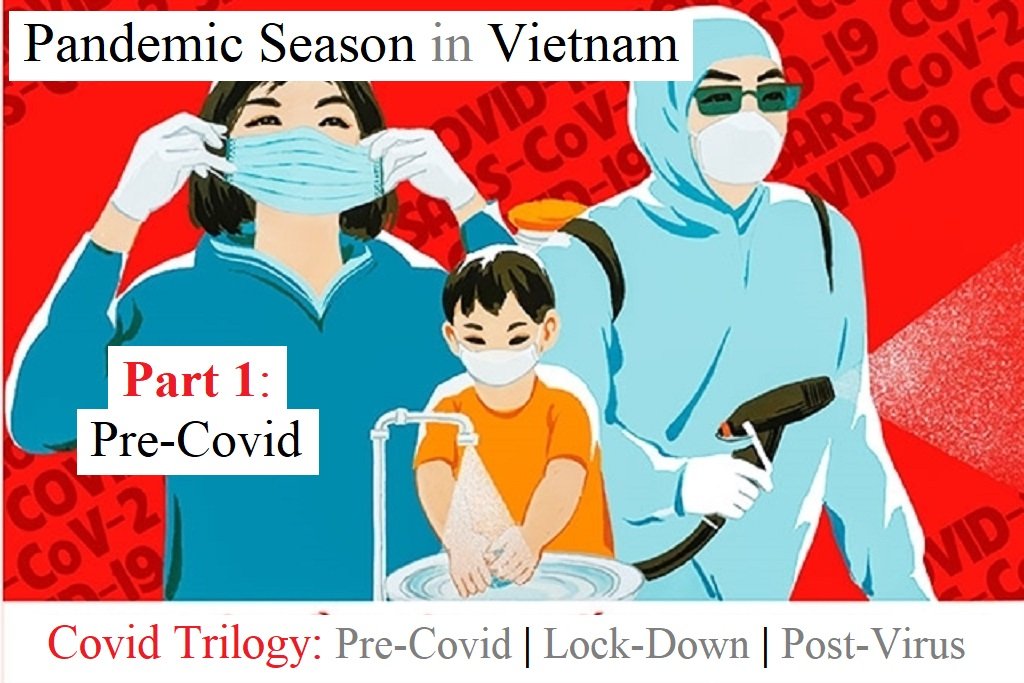
[Back Top]
PANDEMIC SEASON IN VIETNAM
Preface: This page is my account of what it’s been like to live through mùa dịch (‘pandemic season’) in Vietnam: part travelogue, part personal narrative, and part analysis of Vietnam’s strategy to contain Covid-19. I don’t claim to have any expert knowledge on the subject of coronavirus, nor am I suggesting that my ‘pandemic season’ experience has been especially unique. Indeed, there’s no doubting my comparatively fortunate and secure circumstances during this unstable period. But I hope that, for readers outside Vietnam, this account may shed some light on how the country has been dealing with the virus; and, for readers inside Vietnam, it may be interesting to hear someone else’s experience and interpretation of events that are already familiar to you. This is a long-form piece of writing, including illustrations and maps. (Please also read my Disclaimer & Disclosure.)
Structure: This is a three-part narrative: a ‘Covid trilogy’. Part 1: Pre-Covid focuses on the lead-up to the virus, the initial phase of the Covid outbreak in Vietnam, and the weeks preceding nationwide lock-down. Part 2: Lock-Down details my experiences during the first national lock-down in April, 2020. Part 3: Post-Virus will be published whenever the time comes.
It’s Not Over: Mùa dịch (‘pandemic season’) seems particularly apt, as it suggests recurrence and the possibility that this virus may return, or even become part of an annual cycle. Conversely, by using the definite article – ‘the pandemic’ – the implication is of a finite period with a defined beginning and end: a one-off event, after which it will all be over and everything will go back to normal. By writing this ‘Covid trilogy’, I’m not suggesting the pandemic is over in Vietnam: mùa dịch may return, as is the nature of ‘seasons’. I’m not complacent and neither, I hope, is anyone else.
- PART 1: Pre-Covid
- PART 2: Lock-Down
- PART 3: Post-Virus
MAP:
Part 1: Pre-Covid
*Disclaimer & Disclosure: This is not a piece of journalism. Rather, it’s a personal recollection & an attempt to tell a story based on my experience over the past few months. In this account, I am most concerned with the narrative & my own emotional & intellectual response to, opinions of, and reflections on, the events in Vietnam since January 2020. I am less concerned with exact figures & dates. If you wish to fact-check anything in this piece, it’s easily done with a simple Google search, such as, ‘When was Vietnam’s first confirmed Covid-19 case?’ or ‘On which date did mandatory quarantine for all international arrivals commence?’ etc. I have no affiliation with the Vietnamese government nor do I belong to any other political group in Vietnam or abroad. The opinions & ideas expressed in this article are my own & I have not received payment of any kind. Much has now been written about Vietnam’s response to the virus (both positive & negative) in the domestic & international press, most of which is available online for free. I’d encourage anyone who’s interest is sparked by anything written on this page, to read more on the subject. My account is only one perspective.
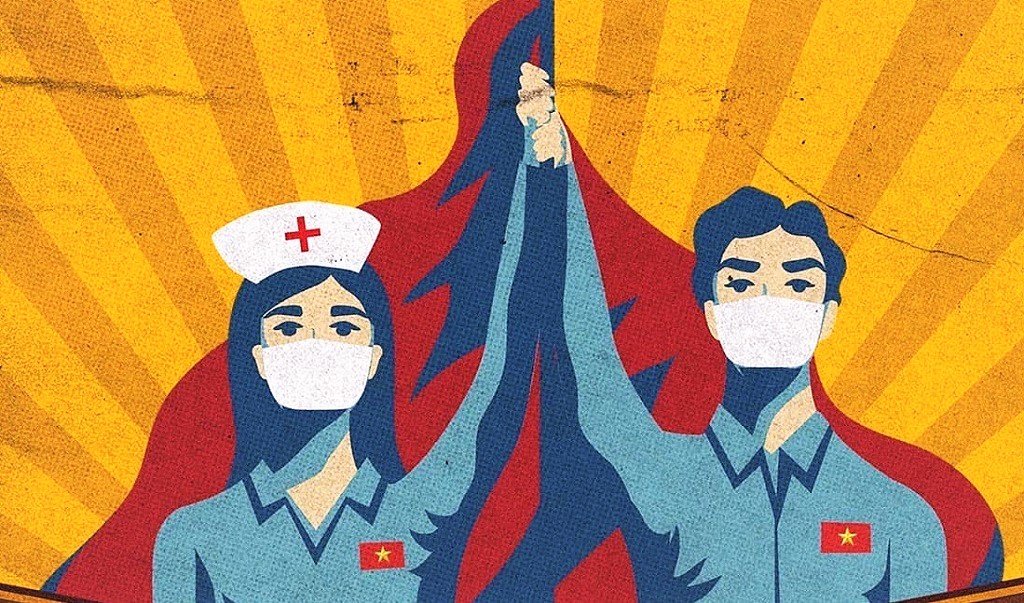
PART 1: Pre-Covid
Waiting to greet my parents outside the arrivals hall at Tan Son Nhat Airport, I felt anxious. It was a sun-filled morning in mid-February and my parents were due to arrive in Saigon (Ho Chi Minh City) to visit me. We only see each other once or twice a year, so there’s a certain amount of emotional apprehension whenever I meet my parents off the plane. But this was different: this was a collective nervousness and uncertainty, shared by everyone else on that bare, modern, bright and hushed arrivals concourse. At that time, no one in the arrivals hall knew if they had just flown into a dangerous situation, any more than the people directly above, in the departures hall, knew if they were flying away from one. But popular opinion at that time would have concluded that those in the departure hall heading west would likely be safest. The virus had yet to take hold in Europe and America, and, even though Vietnam appeared to have it under control, the coronavirus was still broadly viewed as an Asian epidemic.
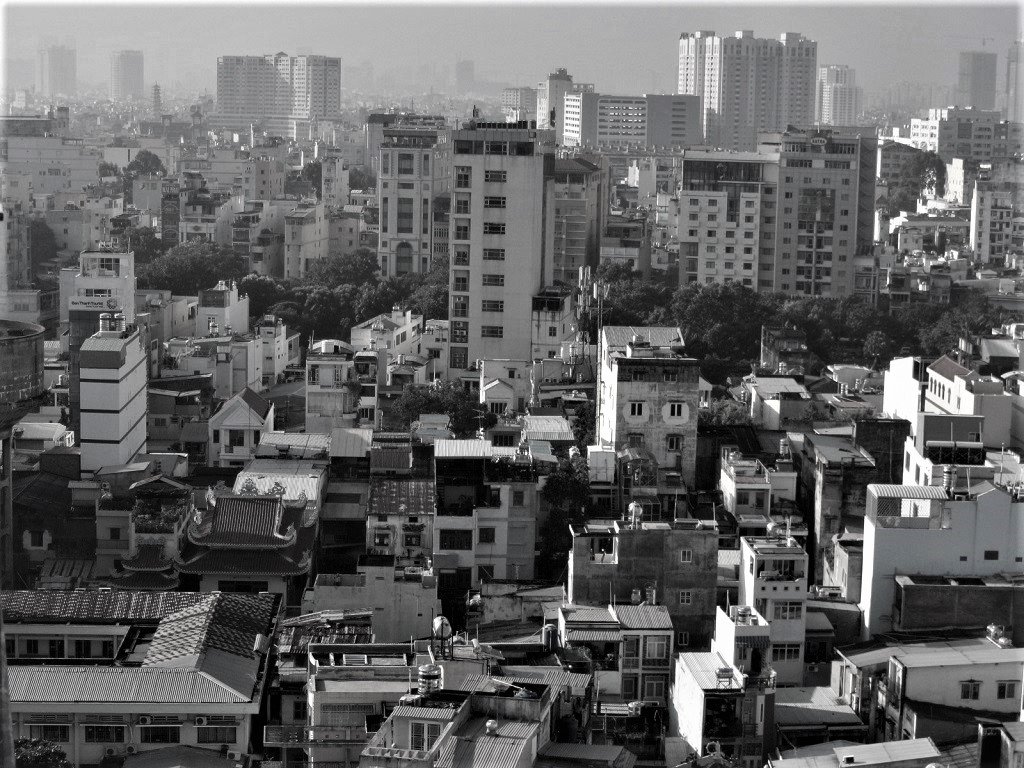
At the airport, my parents and I climbed into a taxi, then drove through the early morning traffic and exhaust-haze toward the high-rises of downtown District 1. In the decade since I’ve been living in Vietnam, my parents make the journey from the U.K at least once a year, usually around December-March, when the weather back home is cold, damp and dark, but in southern Vietnam it’s warm, dry and sunny. My parents had come prepared: bringing with them a supply of masks and handwash. Back then, the U.K was starting to panic-buy products such as these. Vietnam, on the other hand, had already gone through the panic-buying stage. After a brief period of scarcity, the government – quickly realizing the need for more masks and handwash – increased supplies, and both were now readily available in most pharmacies, and also provided for free in many public places and businesses, such as hotels, restaurants, and cafes.
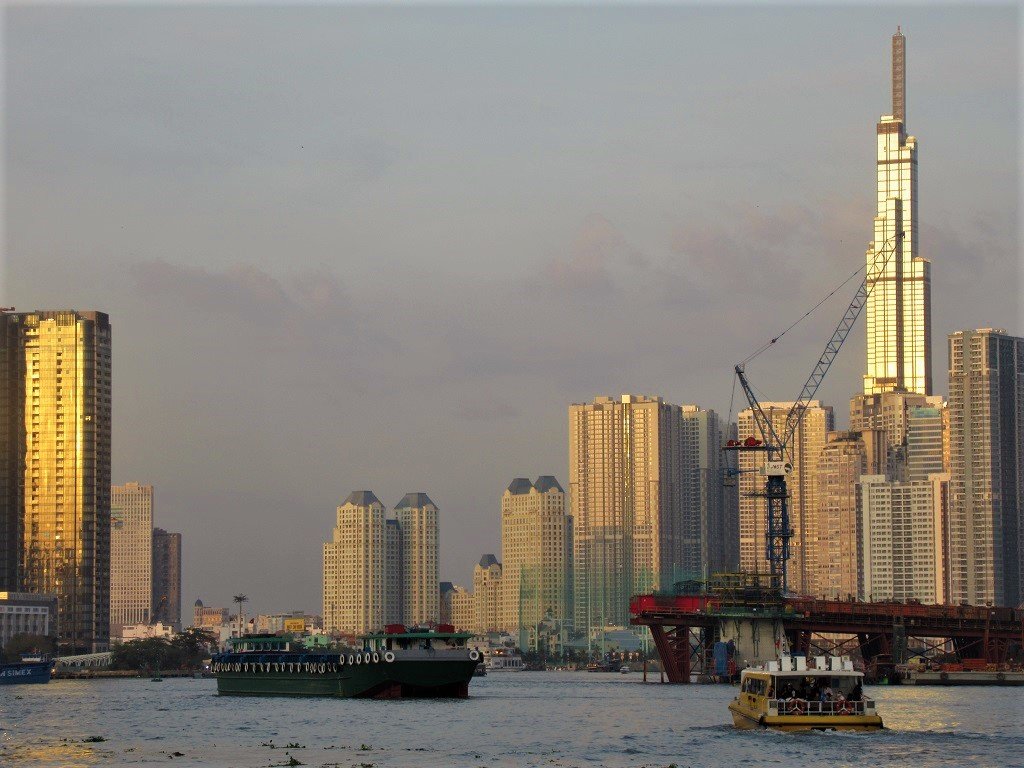
The city was busy as we ploughed through the lava-flow of cars and motorbikes in the morning rush hour. By mid-February, Vietnam had been dealing with coronavirus for almost a month, and it was very much in the public consciousness. There had been a handful of cases, but, when my parents arrived, the country was on a clean-streak, during which no new cases were reported for some two weeks. It seemed possible that Vietnam had nipped the virus in the bud.
Life went on. Some travel restrictions were in place, some land borders were closed, temperature checks were common before entering buildings, shops and businesses, and there was a general awareness of the virus – its symptoms, how it spreads, and how to contain it – disseminated largely through public information billboards, banners, announcements and articles. Most notably, each new case since the first domestic patient was announced in late January, was reported in detail on every national news platform. We all knew exactly when and where the latest case was confirmed and the patient’s movements leading up to their testing positive. But, on the surface at least, things were quite normal. Unless you worked in education, as I do, teaching English at a language centre in Saigon. Most public schools had already been closed for weeks, since the end of the Tet Lunar New Year holiday in late January. The language centres, however, hedged their bets, waiting to see how things panned out. The centre where I teach remained open for one week after the Tet holidays, but was now closed indefinitely.
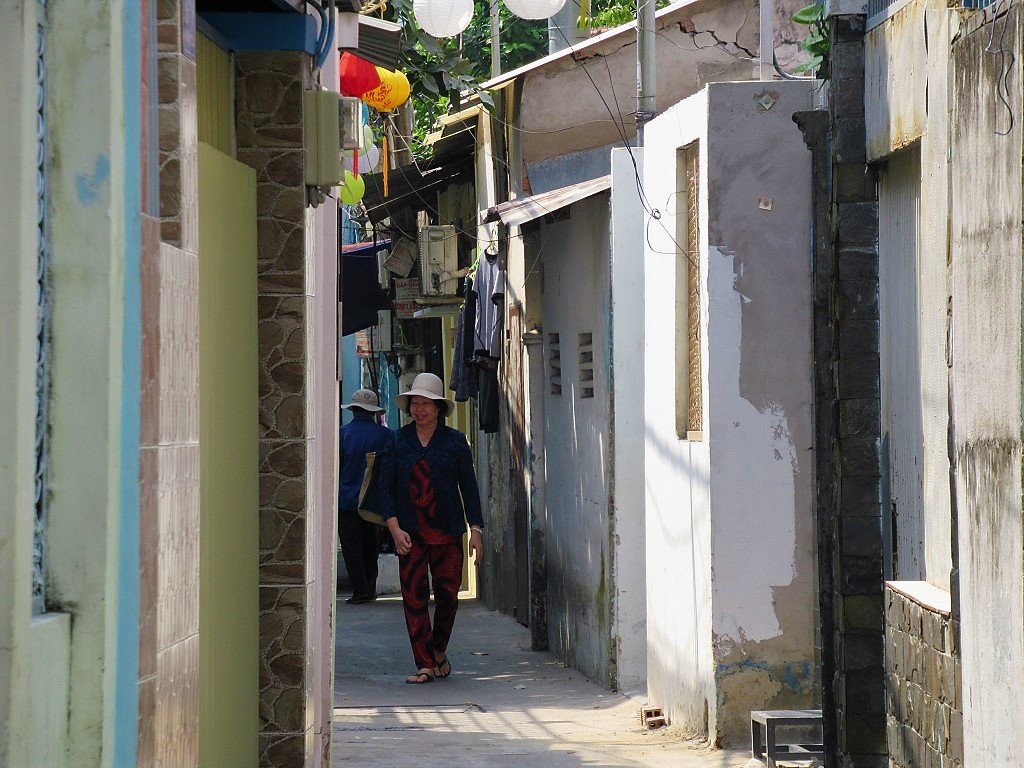
In the taxi, my parents and I headed straight to Bach Dang Pier to catch the mid-morning ferry to Vung Tau, a city by the sea, 90 minutes southeast of Saigon. By now, a high percentage of people were wearing masks in public, both inside or outside. But, despite widespread public information campaigns, not everyone followed the government advice or paid much attention to precautions. Two examples were public gatherings and sneezing.
Vietnam is one of the world’s great drinking and dining cultures. There’s an emphasis on communality and sharing when eating and drinking: the more the merrier. The same is true of other leisure activities, such as going to the beach. In February, large gatherings like these showed little sign of decreasing. Over the last few years, I’ve noticed a kind of sneezing epidemic in Vietnam, especially in urban or industrial centres. I assume this has something to do with deteriorating air quality in Vietnam’s built-up areas (I too have sneezing fits occasionally since moving to Saigon). Whatever the cause, until very recently there appeared to be little etiquette surrounding the sneeze, which was rarely stifled or covered up in public. Manners, of course, differ from culture to culture, and it was only with the rising awareness that a potentially deadly new virus could easily be spread through tiny particles of spittle, that I began to wince every time I heard or saw a sneeze, particularly when no attempt was made to cover it up.
The government advice on masks, however, was generally heeded, even though it was not yet rigorously enforced. At this early stage, the rules were neither strictly imposed by the authorities nor strictly adhered to by the public (myself included). Information was widespread, but official presence was not. As is so often the case in Vietnam, people were largely left to decide for themselves which rules to follow and which to ignore.
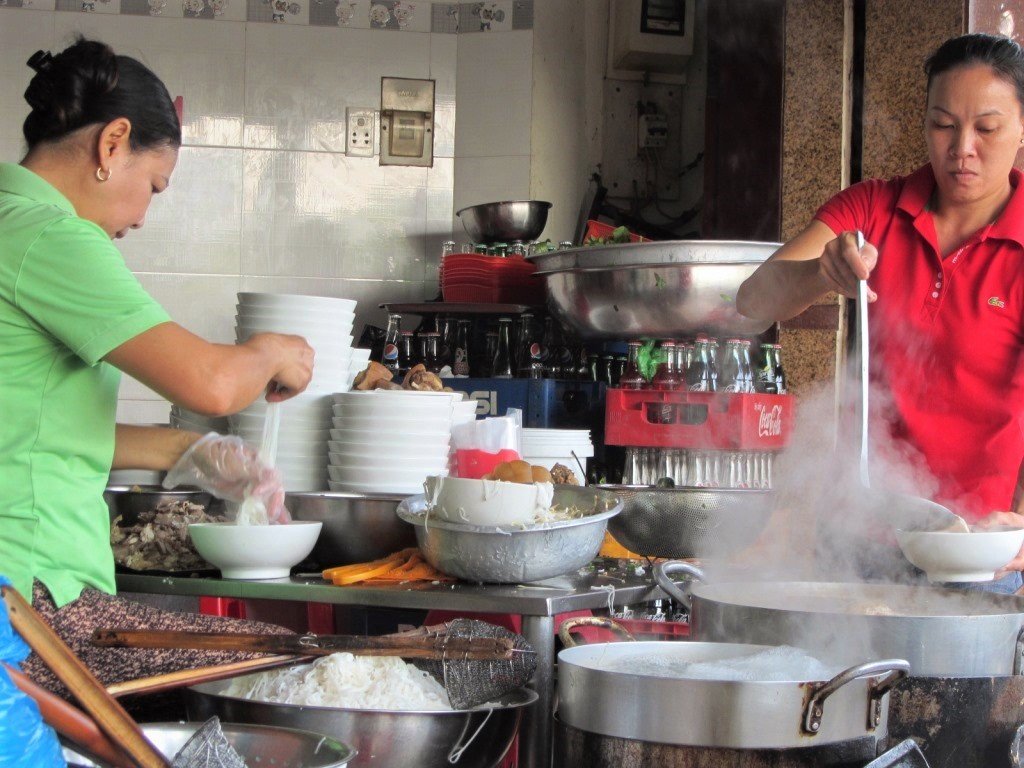
At Bach Dang Pier, we bought our tickets to Vung Tau and carried our luggage to the gangway. It was only 10:00am, but the sun was already high and the day was hot. Before boarding the boat, each passenger had their temperature checked. Mum, who’s 75 and had just disembarked from a 13-hour non-stop flight from the UK – taking her from mid-winter in the northern hemisphere to dry season in the tropics, and without having had much sleep – had a slightly high temperature. She was politely asked to step aside and told to wait a few minutes while the other passengers, all of whom were wearing masks, boarded. Mum’s temperature was checked again. Everything was fine. We boarded the ferry and it pulled away from the pier, drifting out onto the thick brown swell of the Saigon River under a blue sky.
*
During the final days of 2019 (before the virus broke in Vietnam) and the first few weeks of 2020 (the early stages of mùa dịch – ‘pandemic season’), I’d been travelling a lot in the southern provinces, camping in particular. From late December until mid-February, I travelled during the short Christmas and Solar New Year break, then the long Tet Lunar New Year holiday, and finally during the initial phase of mùa dịch, a period of unexpected time-off for students, teachers and other workers involved in education, that was essentially treated as an extension of the Tet holiday and became known, briefly among some English teachers in Saigon, as the ‘virus vacation’. (This was, of course, before government advice against non-essential travel, and the onset of travel restrictions and travel bans).
December through March in the southern provinces is ideal camping weather: blue skies and starry nights; dry and sunny in the daytime, cool and fresh at nighttime. I camped in the pine forests of the Central Highlands, along the Cai Valley, by the La Nga River, and I’d seen in the New Year sleeping out on Nui Dinh Mountain in the grounds of a Buddhist temple with a friend, watching the fireworks in Saigon, some 60km away, on the horizon at midnight. We had no idea what 2020 was about to unveil.

Looking back now at December 2019, it feels to me (as I’m sure it does to many people) like a different era: Pre-Covid. The months between then and now have been filled with events very few of us could have predicted or were contemplating prior to January 2020. The things that occupy our thoughts, dictate our lives, our actions, and even form our morality today, were almost completely absent from most people’s minds at the end of 2019. Indeed, even the vocabulary we use on a daily basis now – ‘social distancing’, ‘contact tracing’, ‘lock-down’, ‘Covid’ – had to be learned by most of the world at the dawn of the new decade: the lexicon of a pandemic – a whole new glossary to be absorbed before we could begin to communicate what was happening, let alone understand it or come up with ways to deal with it.
When I look at my Vietnamese language notes from the first months of 2020, it tells the progression of events in single words with their English translations: vi-rút – virus, khẩu trang – mask, thông tin giả – fake news, dịch bệnh – epidemic, cách ly – quarantine, theo dõi người tiếp xúc – contact tracing, gĩan cách xã hội – social distancing, hỗ trợ – support, đại dịch – pandemic, cách ly xã hội – lock-down, mùa dịch – ‘pandemic season’. Most of these Vietnamese words were new to me: in over 10 years of living in Vietnam and trying to study the language, I’d never previously needed to learn them. Now, I saw and heard the words every day. ‘Mask’ was one I had tried to learn in the Pre-Covid era, but it never stuck in my mind. Now, however, I doubt it’ll ever be dislodged from my memory.
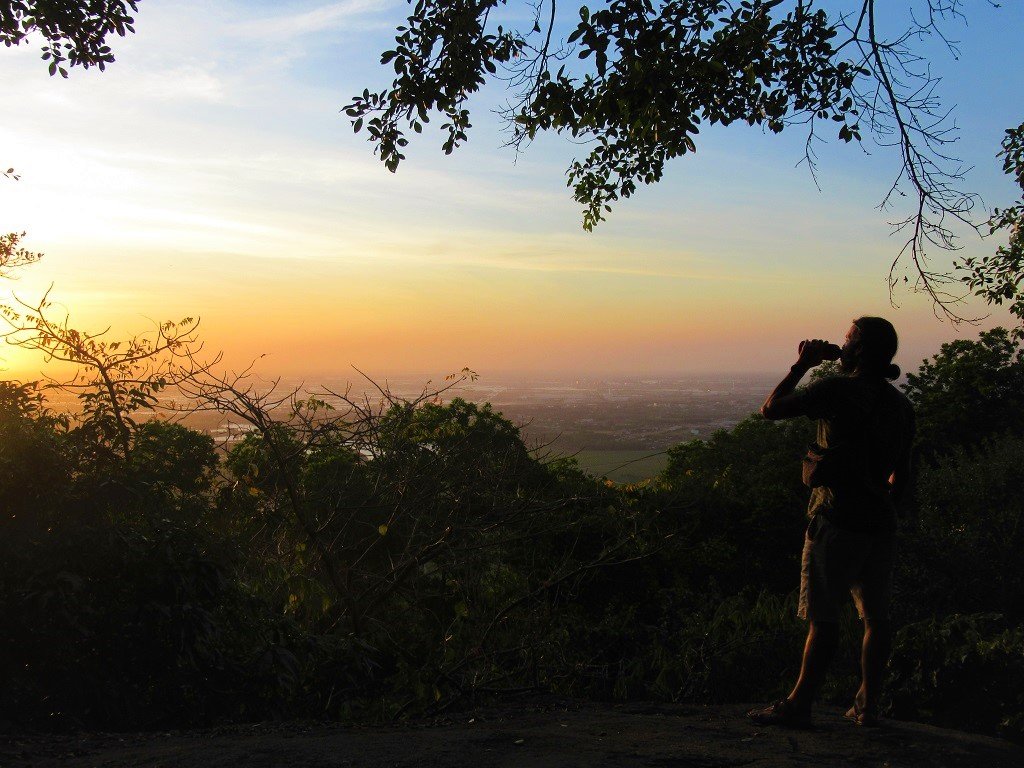
Having spent so much of my time during December, January and February outdoors, camping in the countryside and away from major urban centres, I was perhaps less conscious of the escalating situation in China and the wider region than, for example, my friends in Saigon. Although I followed various online news platforms on my laptop and phone, the situation still seemed remote from my personal context. It was only when I returned to Saigon in mid-February, riding in via noticeably muted industrial suburbs, that I began to feel the rising tension of the nation.
The closer I got to the city, the more I could sense the looming fear. When I stopped for gas, an American friend of mine, who’s based in Saigon but was currently on a business trip in the U.K, called to ask my opinion of the situation in Vietnam: should he return there as scheduled, or wait it out in the U.K? I didn’t know how to respond. I was unprepared for the nervousness of the city. I stopped at multiple pharmacies and stores by the roadside on my approach to Saigon in order to buy masks and hand sanitizer. All of them were out of stock.
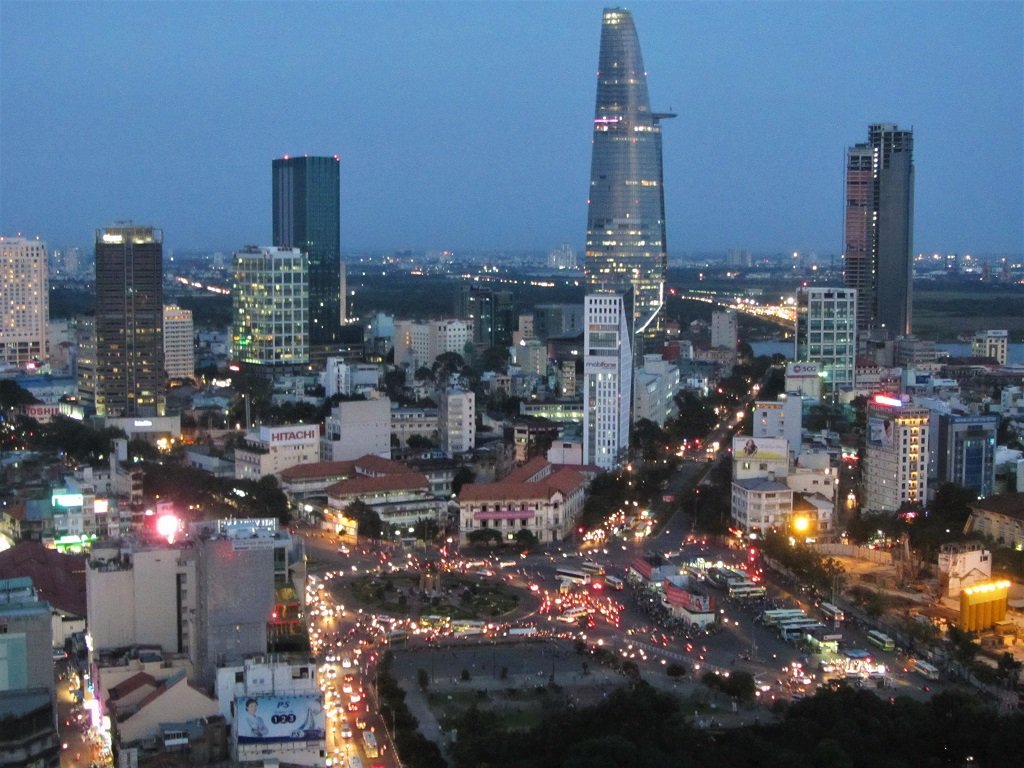
The next day, I went into my English language centre to teach. Public schools had already closed nationwide, but my centre remained open, albeit with many precautionary measures in place. I enjoy teaching and I’m very fond of my students, all of whom are aged between 6-12 years. The first 10 minutes of each class was a safety announcement presented by the Vietnamese teaching assistant accompanied by a safety video: how to wash your hands properly; how, where and when to wear a mask; how to avoid unnecessary physical contact; how to cover your cough or sneeze with your arm.
Standing in the classroom, listening to the safety talk and video, watching my wide-eyed students – each one of them wearing a mask – absorbing the information, miming the correct handwashing technique, occasionally exclaiming “con sợ” (“I’m scared”), the reality of the situation hit me and I had to choke back tears before I was able to begin teaching my class. The language centre closed the next day. I didn’t teach again until May. For me, mùa dịch had begun in earnest. My parents arrived a few days later.
*
The ferry to Vung Tau sped downstream on the Saigon River, leaving the city behind and dodging giant container ships in its path, until eventually shooting out at the estuary and blazing across a brief section of open sea, before swerving into port. In Vung Tau (currently one of the most pleasant and well-kept cities in Vietnam), my parents were struck by the presence of public noticeboards about the virus. These could be seen on streetsides, in parks, on official buildings, in businesses and cafes. Indeed, there was a large one facing our hotel. These government billboards explained how to prevent contracting and spreading the virus and what to do if you showed any symptoms.
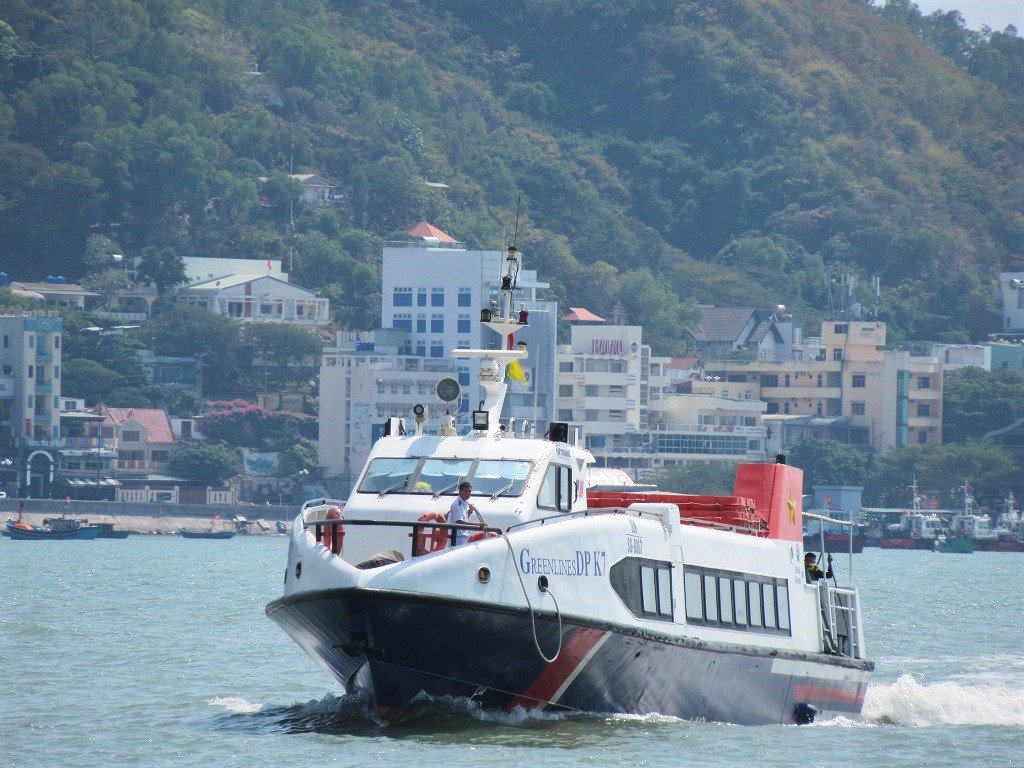
Mum and Dad had come straight from London where, although the virus was by now big news, there was little visible evidence of government action: nothing to reassure citizens that the virus was being taken seriously by the people in charge of the nation. In Vietnam, by contrast, the government-led ‘Covid awareness campaign’ was everywhere and, in most cases, perfectly judged. On the one hand, the notices were highly informative, including contact details for further support or emergencies. On the other hand, they were light-hearted, approachable, and almost child-like and cartoonish in some cases; they weren’t scary, alarmist, or ‘boring’.
As we explored Vung Tau together – walking the tree-lined backstreets and seafront boulevards – it was impossible not to compare Vietnam’s response to the virus with the U.K’s. Another visually-arresting branch of the government campaign was the invocation of the wartime spirit, which, in Vietnam it would seem, is a part of the national psyche that, although rarely observable in day-to-day life, is nonetheless ever-present just below the surface. In public places, such as squares and parks, stylized, colourful, ‘propaganda-style’ posters exclaimed ‘Let’s fight & defeat the virus together!’ or ‘To stay at home is to love your country!’ This encouraged citizens to associate a sense of national pride with how successfully (or not) the country ‘fought’ the virus.
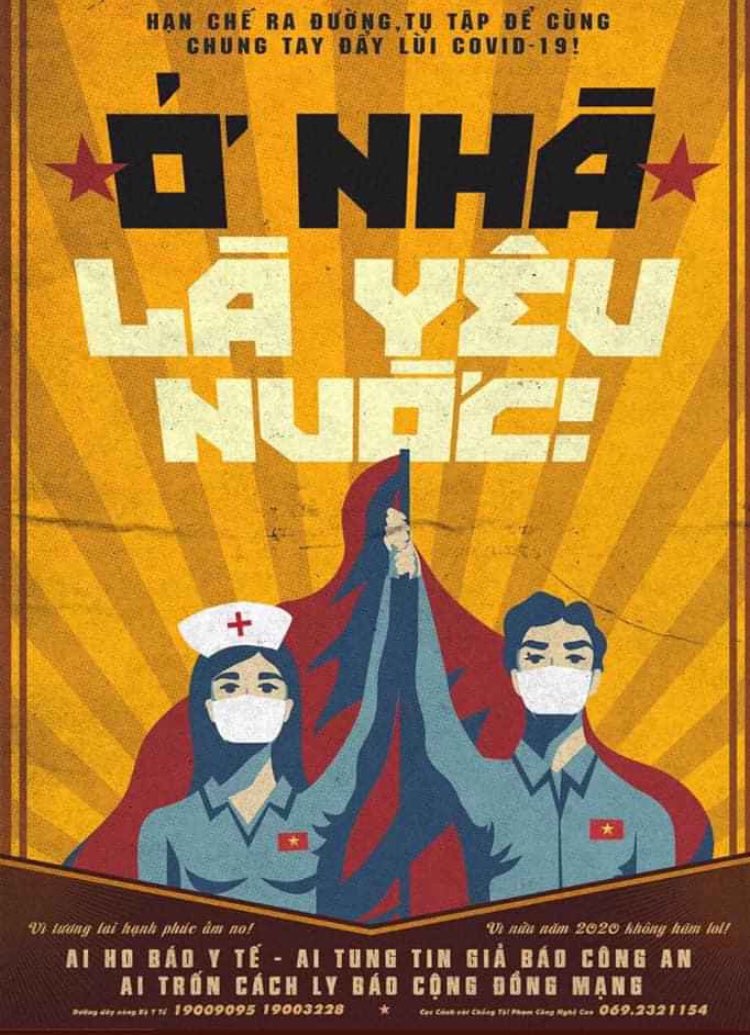
The awareness campaign also tapped into a deeply cultural sense of social responsibility – especially toward children and the elderly – that I would think has its roots in Confucianism and Buddhism, both of which have played major roles in Vietnamese life and society for two thousand years. Simple, printed banners all over the city drove home the concept that every good citizen should act according to the information at hand, because that was the văn minh (civilized) thing to do.
In Vung Tau, every shop, cafe, or restaurant that my parents and I entered was playing a familiar tune. Now fairly well-known around the world, a government-sponsored Covid song (‘Ghen Cô Vy‘ – ‘Jealous Covid’) was released and went viral. Its catchy melody included many of the messages of the national campaign. But the real genius was in the dance associated with the song that included, among many other dance moves, techniques for washing your hands. Synchronized dancing is a massive youth trend in Vietnam and the wider region, and the ‘Covid dance’ (known as the ‘handwashing dance’ – vũ điệu rửa tay) was perfect for sharing online via TikTok and other social media channels, which meant its reach was astonishing.
*The official Covid song & animation (Ghen Cô Vy):
Watch on YouTube
*One example of many viral performances of the ‘Handwashing Dance’ (vũ điệu rửa tay):
Watch on YouTube
One evening in Vung Tau, as my parents and I were sitting on a balcony with a drink watching the sun set over the sea, I received a text message from the government’s Ministry of Health. Since February, as the virus escalated, everybody residing in Vietnam received these messages on a regular basis. Just like the other public awareness tools, the tone of the messages wasn’t overbearing, overly authoritative, intrusive, patronizing or commanding: this wasn’t Big Brother. Rather, one got the impression of a fatherly figure: benevolent, caring and kind. The information was practical and useful, and the tone was one of collective responsibility and pulling together: keeping yourself safe, of course, but also your fellow citizens.
Included in the messages were quick and easy ways to donate to the nation’s Covid relief efforts, which I and many of my expatriate friends immediately did: it seemed the obvious thing to do. My initial reaction on receiving text messages direct from a branch of government was not one of suspicion (‘How does the government know my number? What about my privacy?’); it was one of gratitude and a sense that the most powerful body in the nation was taking the situation seriously. In all these approaches, the government got the balance and tone just right. This was a subtle, smart, innovative, considered, and intelligent campaign. And, so far, it seemed to be working.
*
As Vietnam’s clean-streak continued, my parents and I relaxed into our time together. We enjoyed Vung Tau for a week or so before moving on, due southwest, to the Mekong Delta. We travelled slowly between several cities on the river’s big, muddy banks, before taking the ferry from Ha Tien, near the Cambodian border, across the sea to Phu Quoc Island, where we were to spend the final days of our trip. Over the course of these weeks, I returned to Saigon on weekends to play tennis matches (my school was still closed, so I had no teaching work) and then rode back out of the city on my motorbike on Sunday evenings to meet up with my parents again.
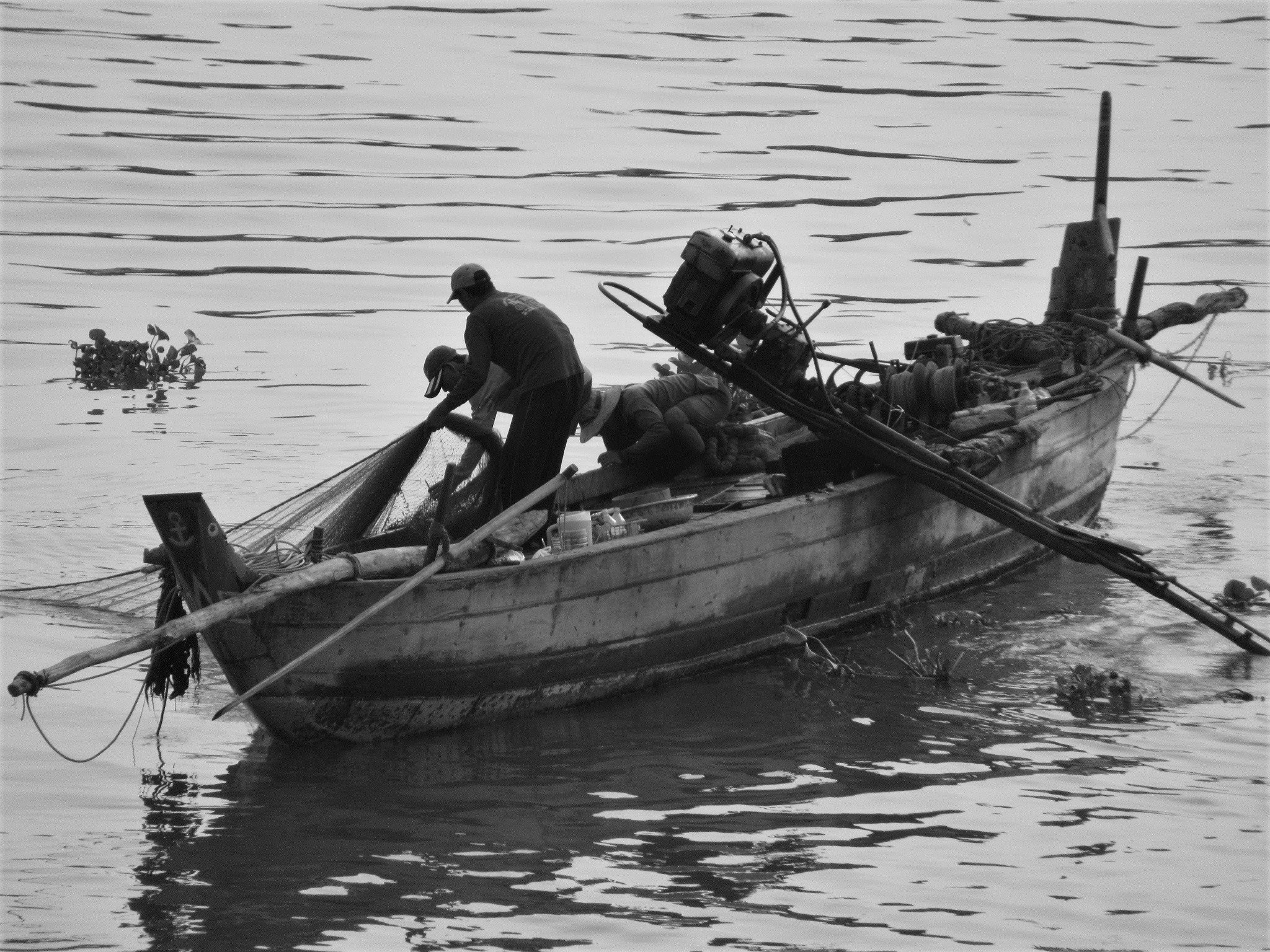
While I was in Saigon, there was hardly any discernible change in the mood or activity of the city, which was also true of most of the places we visited in the Delta. Although, by Vietnamese standards, the cities were somewhat muffled and operating at perhaps 75% of their usual capacity, nonetheless, shops, restaurants and hotels were open, transportation was operating: everything continued pretty much as normal. But, everywhere we went, people wore masks, people washed their hands with sanitizer and carried it with them about their person, pharmacies were open day and night, and the ‘Covid awareness campaign’ – in all its forms – was a constant presence.
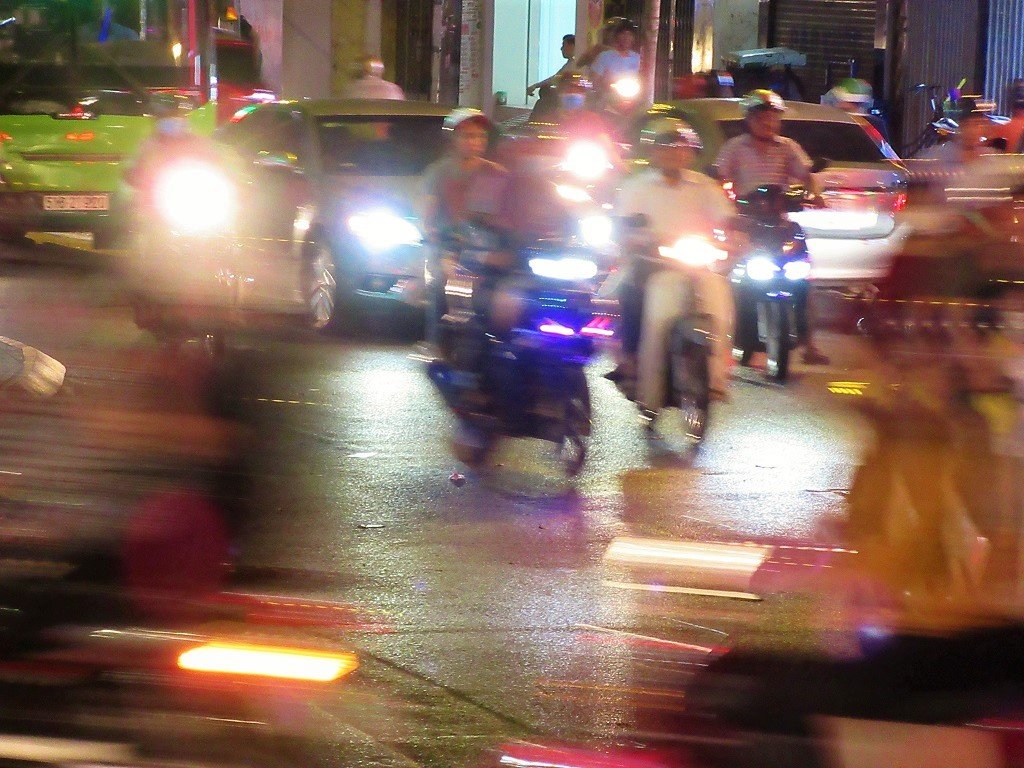
Meanwhile, things were escalating in Europe. Italy was in a bad way and the U.K was beginning to pay the price for its nonchalant approach. It was around this time that my Vietnamese friends started sending me screenshots of social media posts and text messages written by Vietnamese students studying abroad in Europe, who longed to come home to Vietnam and were astonished by Europe’s casual handling of the virus. The messages struck a scared, desperate and despairing tone: people who had gone to doctors in the U.K with Covid symptoms, only to be told to go home and wait it out, then come back in a week if they didn’t get any better; people who wanted to return to Vietnam, but couldn’t afford the air-fare and feared being stuck in a foreign country that was mishandling the pandemic while their own country had it under control. My Vietnamese friends wanted to know: ‘Is this really true? Is this what it’s like in the U.K?’ I didn’t know how to answer.
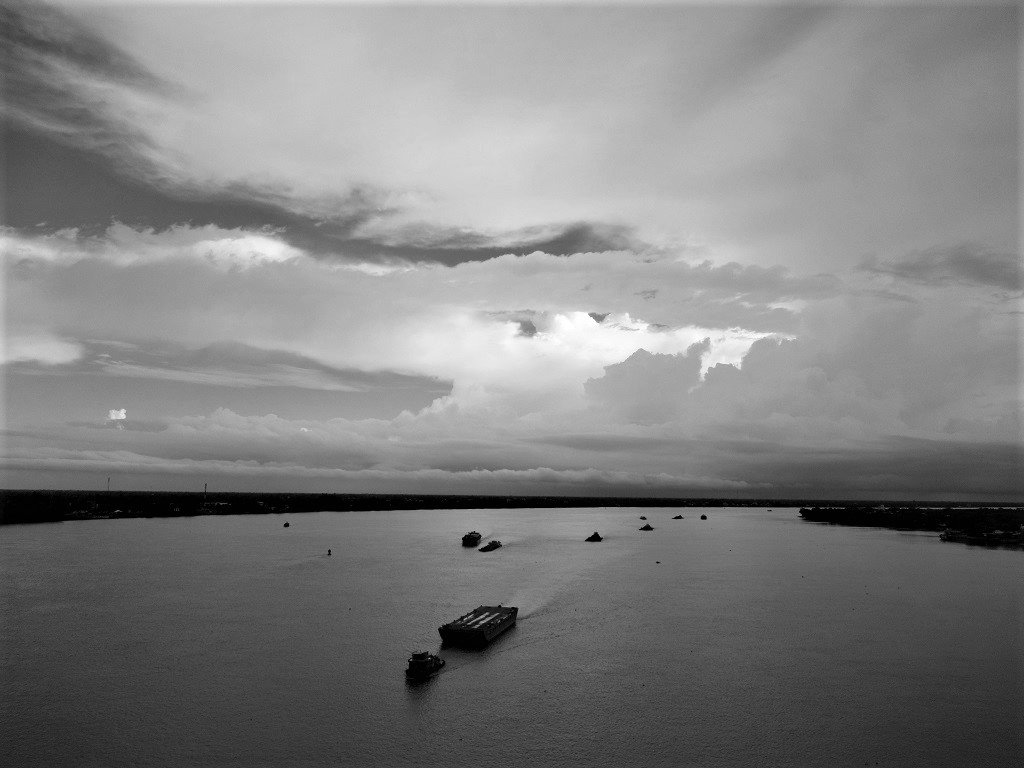
In Vietnam, this was the beginning of a fundamental change in many people’s attitude, both to the virus (which had previously been seen as a ‘Chinese virus’ but was now shifting in the public consciousness to be seen as a ‘Western virus’) and to the concept of the West in general, which was held in high regard – idolized to a certain extent – for its economic power, standard of living, industrial development and infrastructure. This illusion began to crumble as the virus shifted from east to west, and the latter appeared to mismanage it in a way that was unthinkable to many people in Vietnam. How could a nation sit by as children (still at school is some European countries) and the elderly (the most vulnerable age group and the most deserving of our respect) were exposed to a life-threatening virus? How could this be allowed to happen, especially in countries as wealthy and ‘developed’ as those in Western Europe? How could a government, a nation accept this?
In Vietnam, the reaction to the unfolding catastrophe in Europe was, at first, quiet disbelief. But soon it threatened to become anger and outrage, as events transpired that led many in Vietnam to view the negligence and lack of discipline in Europe as a direct threat to the health and security of the Vietnamese people. Vietnam was about to experience its second wave (although the first had hardly been more than a trickle), and it arrived by plane from Europe.
*
Vietnam’s clean-streak ended as a slew of international arrivals on flights, usually from Europe, entered the country and later tested positive for the virus. These new cases had apparently arrived in Vietnam without having undergone any testing from their points of departure: no temperature checks before boarding the plane, no wearing of masks in terminals or onboard aircraft; passengers weren’t even asked if they displayed any symptoms prior to travel. This burst the bubble and it seemed the cases were now bound to grow exponentially in Vietnam, as each day new patients were announced and the country’s fear became tangible. In particular, a fear of foreign tourists, because who knew whether they had flown into Vietnam on one of the ‘Covid flights’? Who knew if they had been taking the necessary precautions that people in Vietnam had already been doing for two months? Who knew if they had arrived from a country, such as the U.K, where the government didn’t appear to be on top of the situation?
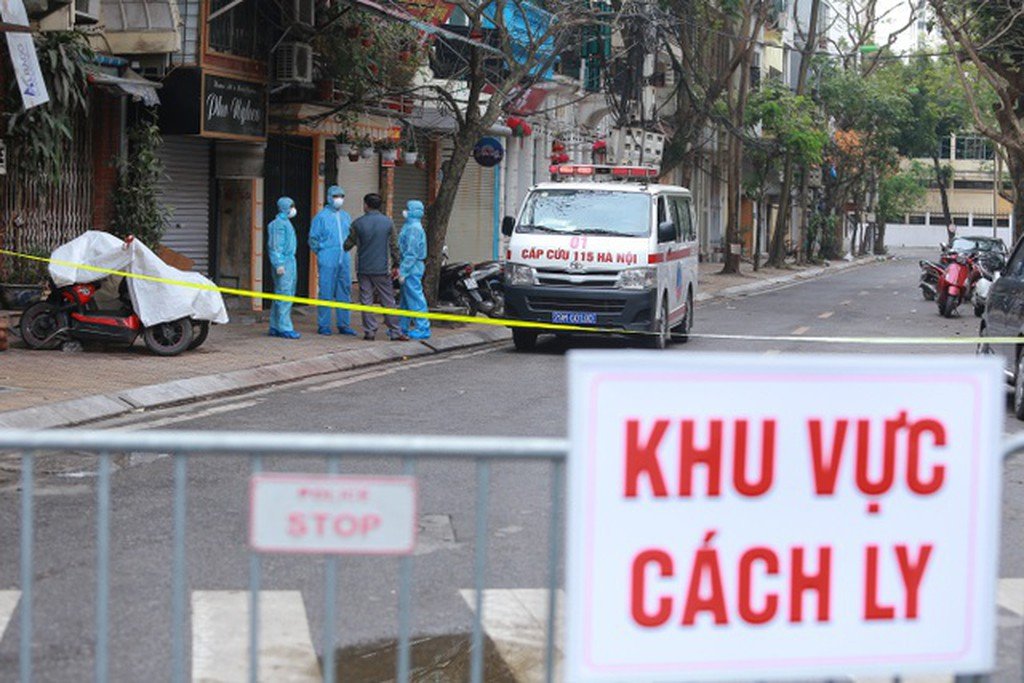
For my parents and I, enjoying a comfortable stay at Bamboo Cottages on Phu Quoc Island (which still had no confirmed Covid cases), this made the last week together one of growing concern and nervousness. It started to become clear that, at some point, Vietnam (and possibly the rest of the world) would have to close its borders and cease all international flights. My parents, both in their mid-seventies, needed to make a decision that would essentially determine where they would be during what would become known as ‘lock-down’.
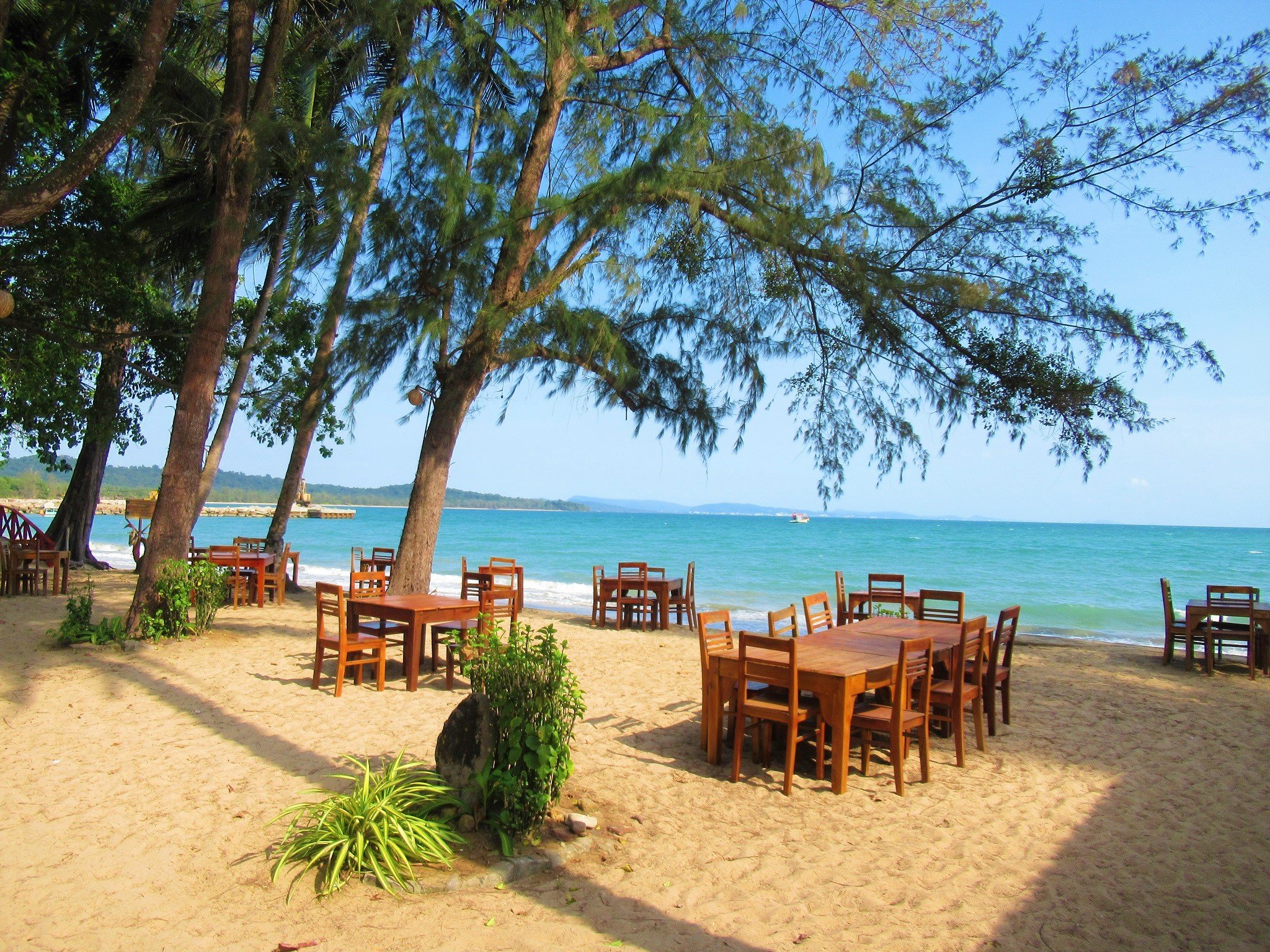
There were two options available to my parents: change their return flight and stay in limbo in Vietnam, so far with a good Covid record but currently in the grip of a flare-up (not to mention the financial extras this would entail, and the uncertainty of visa renewals and if/when they’d be able to get back home again); or return to the U.K on their scheduled flight, where the situation was already out of control and cases far outnumbered those in Vietnam, but where they had access to a house in the countryside, hospitals and medical treatment on the NHS (National Health Service).
The last few days of my parents’ visits are always difficult, because of the looming prospect of another goodbye. On this occasion, the uncertainty of whether they would stay in Vietnam or return to the U.K and the current instability of most of Europe, made it all the more tense. After days of emails and phone calls, Mum and Dad decided to keep their return flight to London as the cost of changing their tickets was too high to justify. As it turned out, my parents’ flight back to the U.K was just a week before all international flights in and out of the country ceased and Vietnam effectively became a nation in isolation.

We spent the last day or two alternately trying not to contemplate the journey too much while also devising protective strategies for the flight. Even in normal circumstances, air-travel – especially long-haul – is a catalyst for catching illness. What’s more, almost all the new cases in Vietnam over the past week were unsuspecting passengers cooped up in airline cabins for hours, breathing recirculated air with an unknown Covid patient onboard. We read-up on the advice online, such as how to disinfect an airline seat and video screen, and how to effectively use a mask and hand sanitizer.
My parents left our resort on Phu Quoc Island on a lovely evening, as the sun was setting over the Gulf of Thailand. They were on a flight back to Saigon, and then direct to London. I walked them to the minivan that would take them to the airport. We said goodbye. But I found it difficult to look my parents in the eyes. None of us knew when it would be possible to see each other again. We still don’t. No one does.
*
I left the island the next day. Back on the mainland, in Ha Tien, everything had changed since I was last there, less than two weeks earlier. It was quiet. Tense. Hotels were open but empty. Markets, shops and cafes were doing business. The boats were running. But there was a stillness – unheard of in most typical Vietnamese towns and cities, which usually throb with activity and commerce. Noticing a change in mood, I started to document my street food meals, sensing that this daily pleasure – affordable, ubiquitous, life-affirming and full of colour – might not be available much longer if a lock-down was to be enforced, which now seemed increasingly likely.
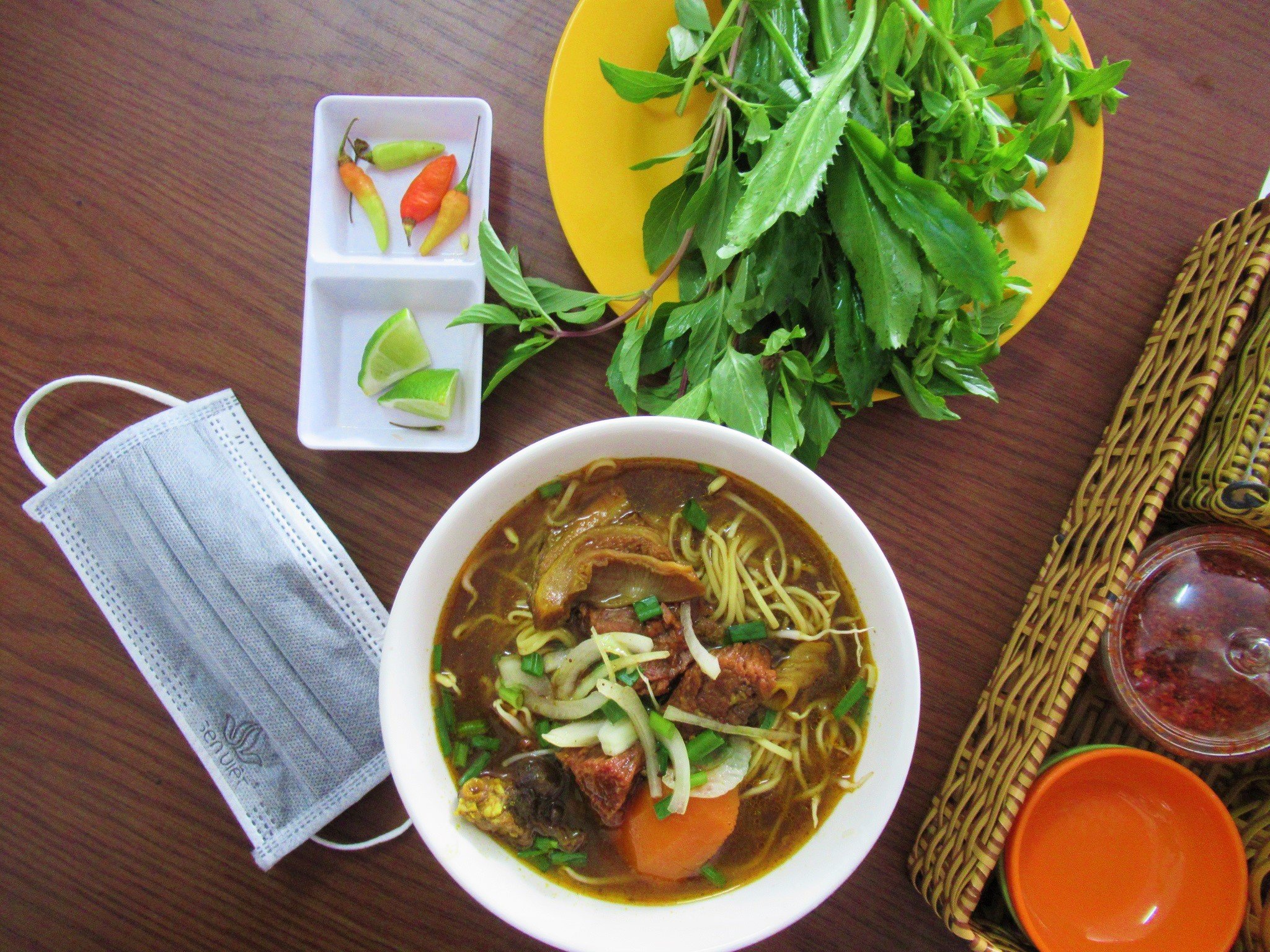
The next morning, a new Covid case was announced in the online news sites: a foreign man on Phu Quoc, who’d been on the island for a week during the same time my parents and I were there. Fortunately, because the government’s contact tracing was so thorough and the details made public immediately, I was able to read about the man’s movements on the island – where he stayed, where he ate, where he travelled, whom he came in contact with – and deduce from this information that neither I nor my parents were ever in proximity to him, having stayed in, and travelled to, completely different parts of Phu Quoc. Nonetheless, this was as close as I’d been to a reported case of the virus.
I felt I had to return to Saigon before lock-down was announced. I rode my motorbike down narrow paved lanes and dirt roads, and along dykes above irrigation channels bisecting an endless patchwork of rice fields, between Ha Tien and Can Tho. I heard from my parents, who’d arrived safely back in London and were now planning to leave the city as soon as they could for the countryside in Wales, because they too were anticipating a lock-down and preferred not to be in London for it. From Can Tho, I continued on back-roads, interrupted by several ferries across branches of the Mekong River, to Saigon. The moment I re-entered the city, for the first time in three weeks, I knew that this was not the place I wanted to spend lock-down.
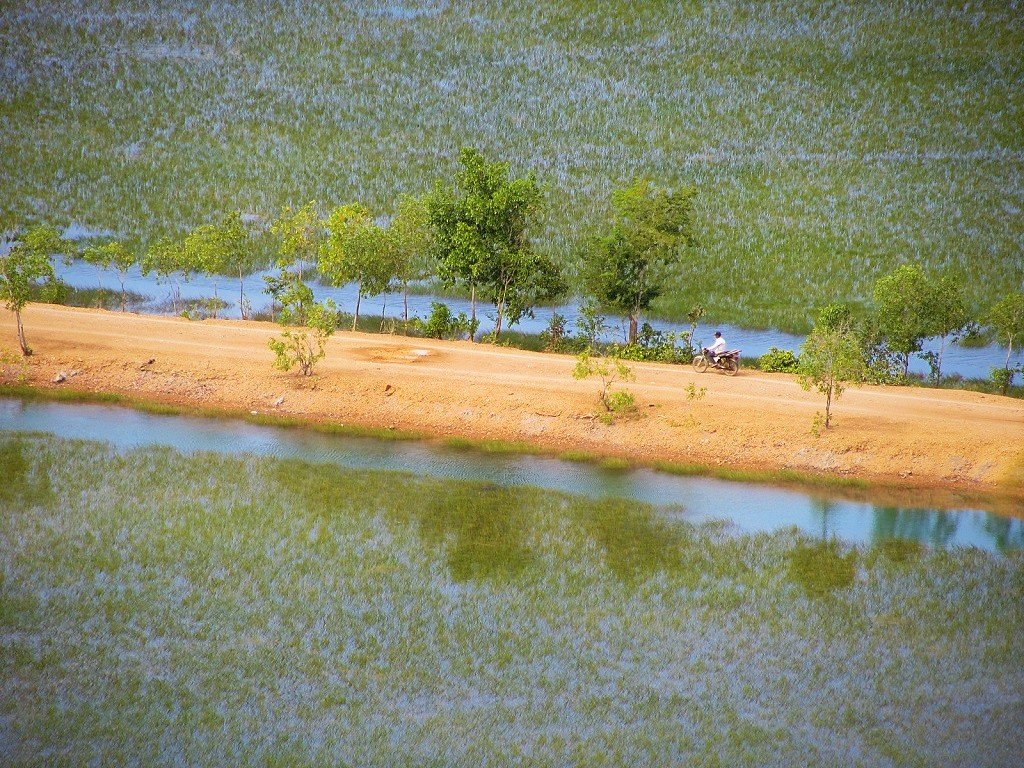
Saigon appeared ghastly to me: choked with exhaust fumes, dirt, traffic, and people. If the virus was going to take hold anywhere, I felt, it was here. I’d been lucky enough to have spent the previous weeks in quieter, greener, cleaner, more rural parts of the country, and in the time since I was last in Saigon, there had been a lot more talk about physical distancing and self-isolation. Surely this was a hopeless concept in a place like Saigon. Even in my own home, which I share with three friends, it was ludicrous to contemplate physical distancing in an enclosed house with four tenants in the middle of a city of 8 million people. Saigon had already reported individual cases and clusters since the second wave had hit. Whole neighbourhoods and entire apartment blocks were quarantined. There was a sense that the virus was closing in.
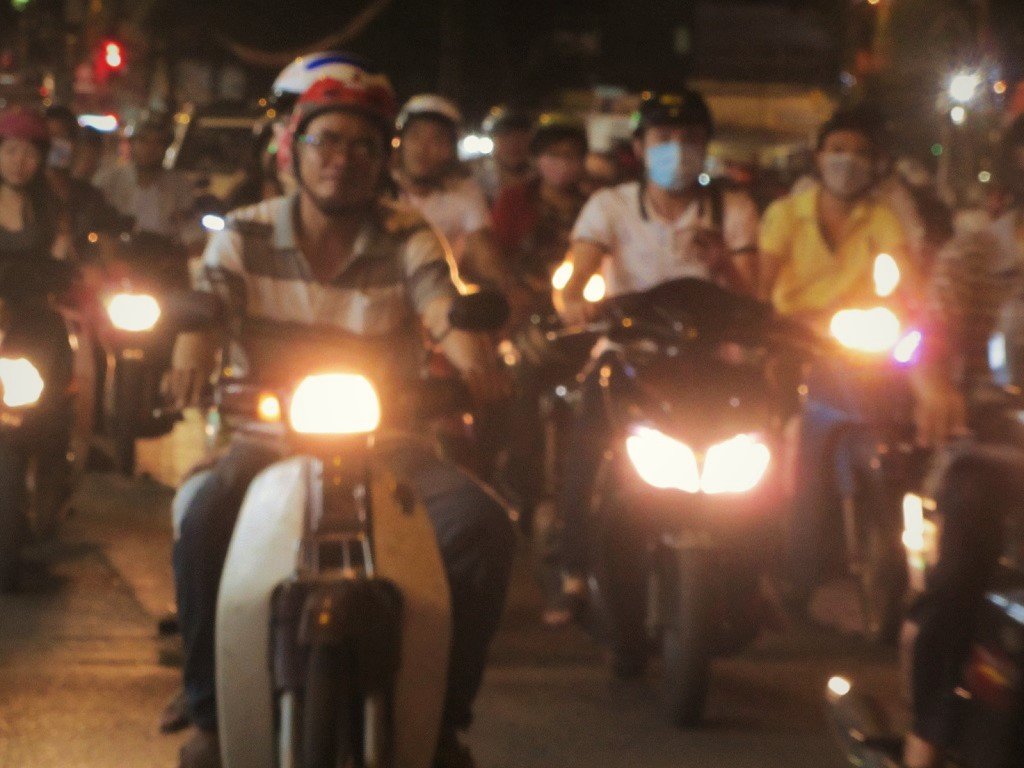
The next morning, I paid my landlady three months rent in advance and rode out of the city again, this time with my tent, full camping gear, and food supplies. This may seem paranoid and absurd now, but at that time we really didn’t know what was going to happen in Vietnam, or the rest of the world for that matter: would lock-down commence? how strict would it be? how long would it last? would food run out? would looting take place? would the virus spread throughout Vietnam? would hospitals become overrun? No one knew. I only knew that I wanted to be anywhere but Saigon. As much as I love the city, it’s not the place I wanted to wait out a pandemic of unknown proportions.
I headed, initially, for Vung Tau, where I knew there was, at least, the ocean, the hills, the horizon, cleaner air, no reported Covid cases, and easy access to empty stretches of coastline or sparsely populated highlands: the kinds of places that one could effectively practice physical distancing and self-isolation. For me, this turned out to be a good move.
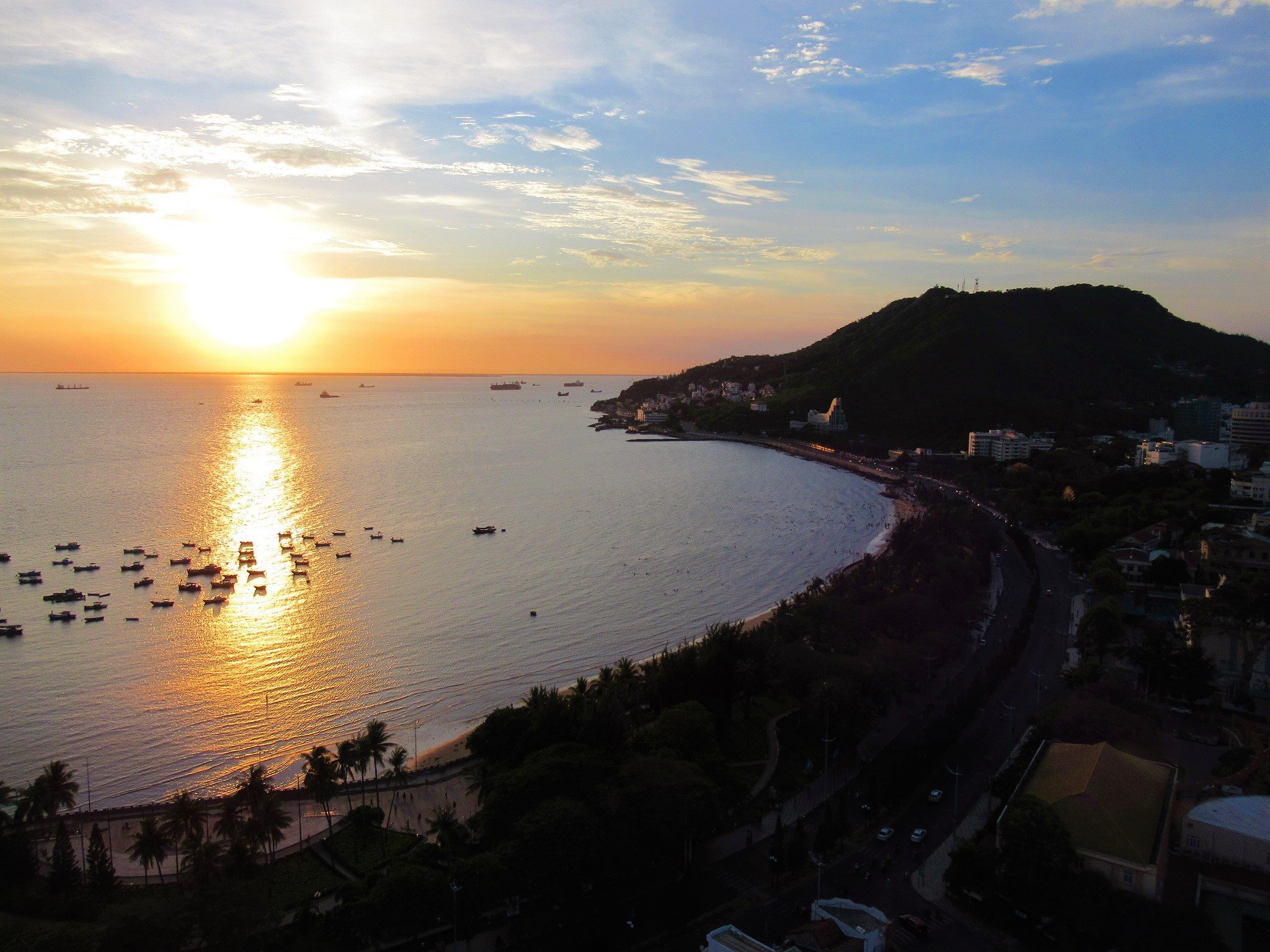
PART 2: Lock-Down
*IMPORTANT NOTE: Part 2, including the introduction below, was written and published in November 2020, six months before the outbreak of Vietnam’s fourth (and worst) wave of the pandemic.
Introduction to Part 2: While writing the second part of this ‘Covid trilogy’, a third wave of the virus hit Vietnam. The outbreak began in Danang in late July and was contained by September 2nd, since when there hasn’t been a single reported community transmission. During that month, the total number of cases nationwide doubled (the tally currently stands at 1,304), and Vietnam went from zero fatalities to 35. A citywide lock-down was imposed on Danang, but most of the rest of the nation remained open and did not experience a second lock-down. Thus, Vietnam still only had one nationwide lock-down during the pandemic, which took place in April, 2020. And that is the period of time which part 2 of this ‘Covid trilogy’ focuses on.
Although part 2 is intended to be read as one continuous narrative, I recognize it’s a long piece and many people won’t have time to read it all. Therefore, I’ve broken the narrative into convenient mini-chapters. (For further context, please read the introduction to this ‘Covid trilogy’ and my Disclaimer statement.)
- Decision Time
- Invisible Threat
- Vung Tau: Pandemic Retreat
- Implementation & Enforcement
- Lock-Down Lifestyle
- Face Masks: Culture & Etiquette
- Psychology of Lock-Down
- The ‘Fight’
- Taking ‘Action’
- Resistance & Compliance
- Pathos & Poignancy
- Human Warmth & Social Life
- A Moment of Hostility
- Impacts on the Environment
- Easing Restrictions
- Success & Recognition
- Last Days of Lock-Down
*
MAP: Part 2: Lock-Down
*
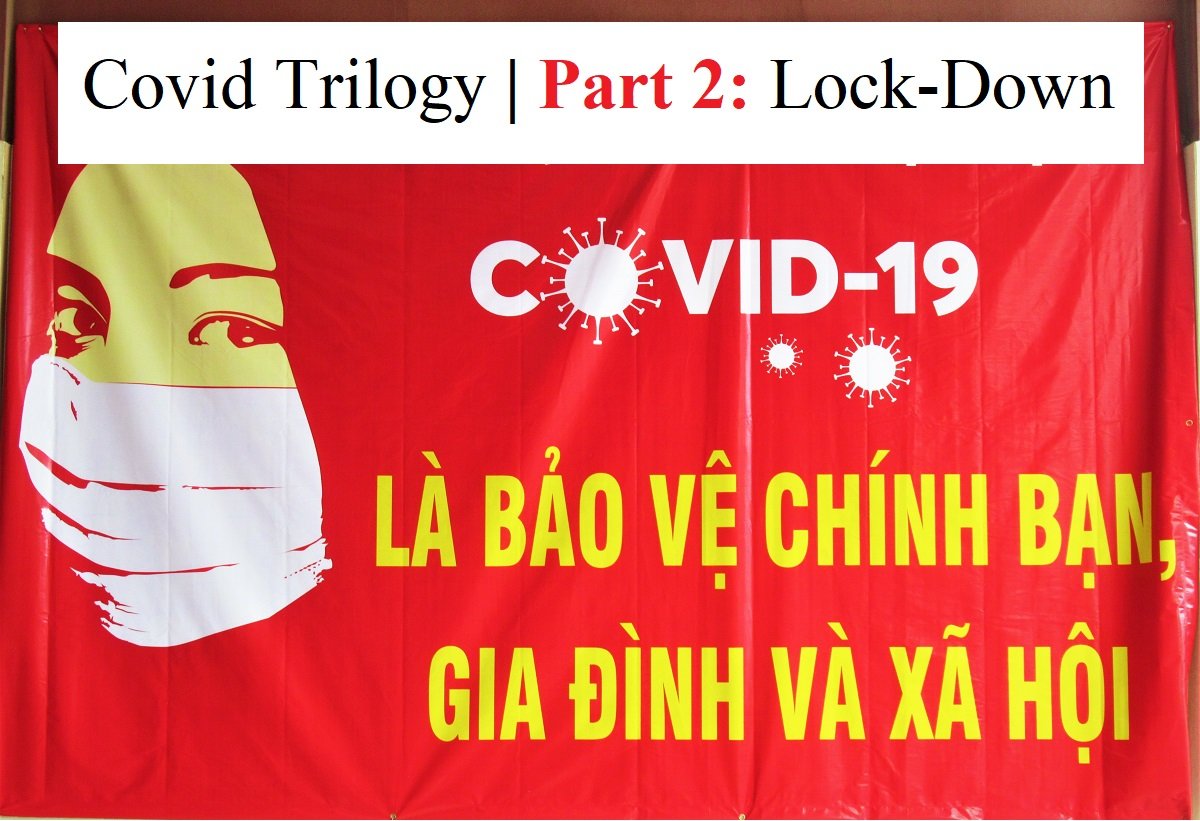
[Back]
*
Decision Time:
Three hours after leaving Saigon on my motorbike on a hot, clear, dry season morning, I arrived in Vung Tau. I’d taken the longer, scenic route: partly to avoid horrible roads, but partly so as not to draw attention to myself. The government had advised against non-essential domestic travel, and foreign travellers were increasingly seen as a health risk. International air routes were still open and the West was now at the centre of the pandemic: many people in Vietnam were understandably nervous about being in close proximity to Westerners, whom, for all they knew, might have been recent arrivals from Europe or the United States, where the virus was already out of control. What’s more, I was conspicuous as a foreign man with a guitar on his back whose motorbike was loaded with gear.
It was mid-March. Social- and physical-distancing restrictions were already in place across the nation, pockets of infections were flaring up here and there, and a nationwide lock-down was imminent, but nobody knew exactly when it would begin. I’d left Saigon to avoid spending lock-down in a congested city of 10 million people. My first stop was to be the seaside city of Vung Tau, from where I’d likely continue along the coast and up into the mountains. I intended to spend the next few weeks – or however long lock-down lasted – on the road, moving from one isolated place in the Vietnamese countryside to another with my tent. This was to be my way of social- and physical-distancing: staying away from urban centres, limiting my personal interactions, keeping safe, and waiting out the pandemic.
Now that we’re almost a year-deep into the pandemic, it’s easy to forget just how unsettling the prospect of lock-down was. Today, lock-down is associated with frustration and boredom; but in the first quarter of 2020, when lock-downs began to be announced across the world, there was a tangible nervousness in the air and a sense of fear among the public. On my motorbike, I had brought a tent, camping equipment, canned and non-perishable food supplies, and three separate stashes of cash hidden in my luggage. I was prepared for a long period of self-isolation: on the road, in the countryside, camping in the mountains and in the forests. This might seem excessive and paranoid in hindsight, but, months later, when lock-down was over, businesses reopened and we began to go out and socialize freely again, I met several other people who confided in me that they too had made similar preparations to mine back in mid-March.

Riding into Vung Tau on the wide, breezy seafront road, the city was empty. It was a Monday. Vung Tau is a weekend economy: from Friday evening until Sunday afternoon the hotels, beaches, bars and brothels open for business and the punters pour in from Saigon and the surrounding region to let their hair down. But, during the week, the city is quiet, tidy, handsome, neat and attractive. I rolled into town in the early afternoon, the waves crashing on the embankment, tankers, freighters and oil rigs on the horizon. I checked into an empty hotel within sight of Bãi Trước (Front Beach).
At that time, I was receiving emails from readers of this website from across the nation who were reporting that some hotels and guest houses were refusing to accept foreign guests. (This was subsequently directly addressed by Vietnam’s prime minister, Nguyễn Xuân Phúc, who issued a statement that hotel owners were required by law to accept foreign guests, unless they’d been informed otherwise by local authorities.) When I arrived in Vung Tau, however, I immediately found a hotel that accepted me and planned to remain open for as long as possible. What’s more, the hotel was willing to offer me a discounted rate for a long-term stay.
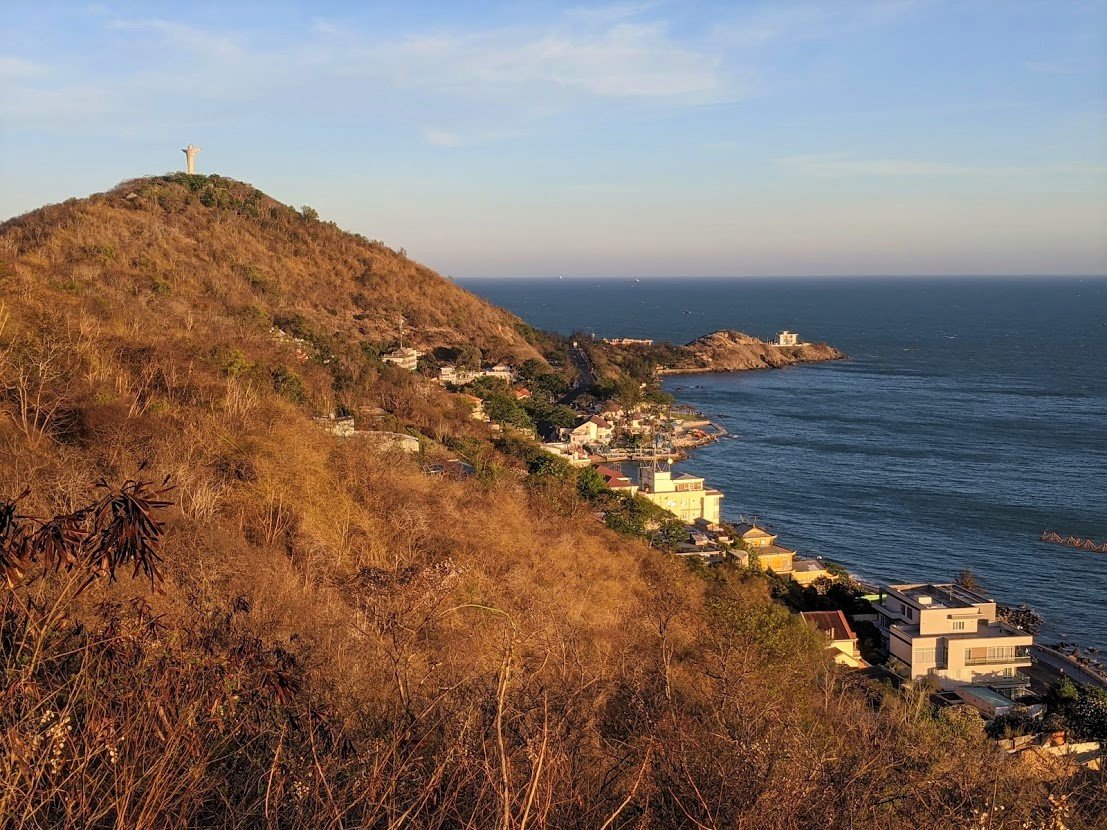
Vung Tau felt good: safe, comfortable, convenient, clean and spacious, with easy access to nature in the form of the ocean, the hills, the windy seafront boulevard, and the peaceful hillside pagodas. The city had all the basic necessities I required and quite a few comforts, too. There were cafes, lots of food and drink options, shops, hospitals, and a couple of ‘Western stores’ where I could buy things like British-style pies and French cheese. Each day that I stayed in Vung Tau, news of infections across the nation got worse, restrictions became more serious, lock-down grew nearer, and I became more nervous and uncertain about my plan to stay on the road and camp. If I moved on from Vung Tau and lock-down was suddenly announced, I might get stuck somewhere else – a different town or city that wasn’t as favourable as Vung Tau or where I couldn’t find accommodation. If I was going to be stuck anywhere, I wanted it to be Vung Tau. After several days in the city, I abandoned my plan to camp and decided to stay in Vung Tau for as long as social- and physical-distancing and the impending lock-down lasted.
My period of self-isolation and lock-down lasted some six weeks, all of it in Vung Tau. This was the longest stretch of time I’d spent in one place for as far back as I can remember.
[Back]
*
Invisible Threat:
Over the course of 2020, for many countries around the world, lock-down has become a way of life: a ‘new normal’. This is particularly true of those nations in the West that failed to act early enough or decisively enough when the virus first broke, such as the UK and the United States. In Vietnam, however, lock-down was only a momentary pause – a brief ‘circuit-breaker’ – before normal life could continue pretty much as before. But, back in the first quarter of the year, no one knew how effective lock-down in Vietnam would be in containing the virus, nor whether further lock-downs would be required.
With the exception of a few particularly hard-hit enclaves, nationwide lock-down in Vietnam only lasted for 2-3 weeks, beginning on April 1st, 2020. Indeed, when talking to my Vietnamese friends, many of them stress that even those weeks weren’t really considered a ‘lock-down’ as such: rather they were viewed as a period of severe social- and physical-distancing. By contrast, my parents in the U.K and my friends scattered across the world – from Barcelona to Costa Rica to California – endured (and, in some cases, are still enduring) several months of lock-down.
By the time I arrived in Vung Tau, the coronavirus dominated people’s daily lives around the world. The virus dictated many of our actions: where we worked (if we worked), what we worked on, who we saw, how we interacted with them, what we talked about, and what we thought about. And yet, the virus was still essentially abstract for most people, especially in Vietnam, which had so few recorded cases. At that time, everyone I knew had been affected by the virus, but no one I knew had been infected by the virus. Covid-19 was the main news item on every media platform, but it wasn’t yet a personal reality. All our lives had been turned upside down in a matter of weeks by the threat of something we couldn’t see. This made it a slightly surreal – but no less unnerving – situation.
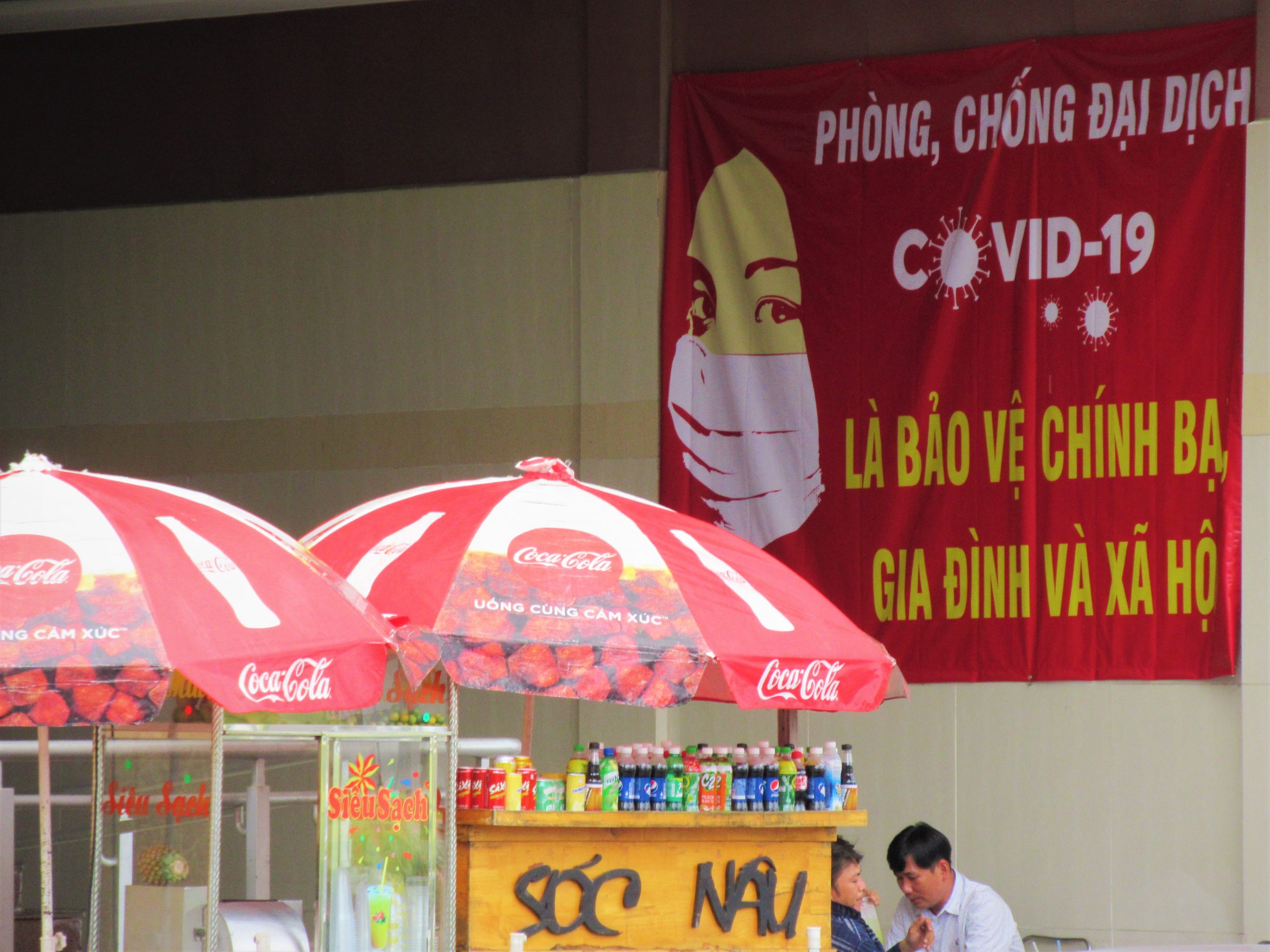
In Vietnam, however, I rarely came across anyone who didn’t believe in Covid-19 or thought it was all a huge conspiracy. Meanwhile, in parts of the US and Europe, there appeared to be some skepticism associated with the virus, as well as a certain resistance to rules and regulations imposed to contain its spread. Cultural differences aside, this reaction is surely due in part simply to the non-visible nature of the virus. People weren’t immediately falling sick on the sidewalks, gasping for breath in public places, convulsing in the streets, or transforming into zombies in front of our eyes. If Covid-19 had manifested itself in, say, a cloud of purple vapour issuing for the nose and mouth of anyone who carried it, we’d all be better able to comprehend the reality of the virus and its threat. Indeed, we’d all be more serious about implementing preventative measures: we’d carry out social- and physical-distancing with more diligence, we’d be more conscientious about obeying lock-down regulations, and we’d all wear masks.
Imagine walking a street in London, Paris, New York or Ho Chi Minh City when suddenly a puff of purple vapour wafts over from an unmasked pedestrian, signalling clear evidence of your proximity to a new and potentially deadly virus: everyone on that sidewalk would mask-up, bolt in the opposite direction, report the Covid-carrying pedestrian to the authorities, go home, stay home, lock-down, and self-isolate without any questions or conspiracy theories.
But, invisible or not, the virus inevitably closed-in on my personal experience (as I’m sure it did for many people). In Vietnam, some of my friends were quarantined for many weeks. And, by the middle of the year, two of my friends’ parents had passed away from Covid-19: one in the UK and one in the United States, both countries which had failed to act seriously when the virus first spread to their borders, and both countries that had remained resistant to mask-wearing, self-isolation, quarantine, contact-tracing and myriad other regulations and actions that the Vietnamese government and people had taken early on in the pandemic.
[Back]
*
Vung Tau: Pandemic Retreat
Vung Tau is a peninsula poking southwest into the East Sea, near the mouth of the Saigon River. Only a hundred kilometres from Saigon and reachable by road in just 2 hours (or even less by fast boat ferry), Vung Tau has long been a popular weekend escape for city dwellers. But, when I first got to know it, between 2005-2010, Vung Tau was a trashy, noisy, crowded, and polluted tourist town with a seedy underbelly and a boozy expat scene. There was a sense of vice about the place, which I’d rarely felt in other Vietnamese towns. In the last few years, however, the city has transformed itself and cleaned up its image. Vung Tau is now an attractive, well-organized, increasingly affluent and ‘respectable’ seaside city. This was my home for some 50 days during the height of Pandemic Season in Vietnam.
In normal times, I travel a lot (but almost always within Vietnam’s borders) to research and write the guides, reviews and articles on this website. My general rhythm for the last few years has been to spend one week in Saigon (where I’m based) and the next week on the road. However, no matter where I travel during the week, I always return to Saigon for the weekend, in order to teach my English classes on Saturday and Sunday. Sometimes this requires riding through the night on my motorbike; other times, I take night trains or sleeper buses from anywhere in the country that arrive into Saigon before dawn on Saturday, giving me enough time to shower and have breakfast before my first class begins at 7:40am. I rarely fly: partly due to a rapidly growing sense of flygskam, but also a creeping fear of flying that began in my late twenties. My lifestyle being such, I can’t remember the last time I spent more than two or three weeks in one place. Lock-down and self-isolation changed that: Vung Tau marked the longest number of consecutive days and weeks I’ve spent in one place for several years.
Like many coastal cities in Vietnam, Vung Tau is on the up-and-up. The city’s accommodation – from hotels and homestays to budget hostels and Airbnbs – gets better every year; its beaches are cleaner and the water quality clearer than at any other time since I’ve known it; street food is thriving and local seafood is fresh and delicious. On the hillsides, there are still some attractive century-old french-colonial villas, and, dotting the city streets, interesting examples of Vietnamese Modernist architecture. People are friendly and noticeably healthy and active: the long, attractive seafront road with wide, well-maintained sidewalks is used every morning and evening by locals of all ages for promenading, cycling, running, dancing, calisthenics, football, and swimming in the ocean. There’s an active cafe and bar scene, and, although the seediness still exists in the dozens of euphemistically named ‘massage’ parlours and ‘karaoke’ bars, these feel like relics of the past: old neighbourhoods awaiting demolition.
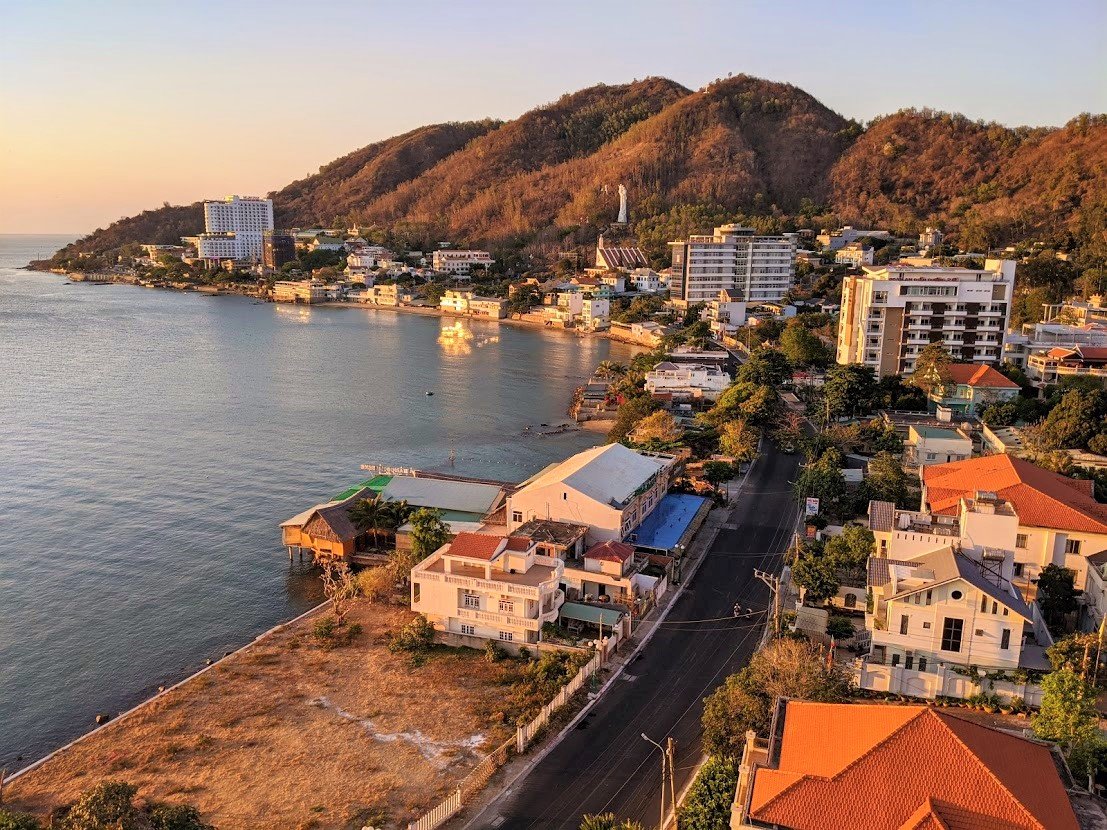
In Vietnam, lock-down was the point at which most people finally acknowledged that the virus wasn’t just going to go away, pass us by, or leave anybody unaffected. As soon as lock-down came into effect, there was an almost instant nostalgia for the pre-Covid era: when borders were open, travel was possible, going out for street food or to bars with friends – or going out at all without a mask – was acceptable. Even the simple act or thought process of making plans for the future wasn’t possible. The future was no longer a graspable concept: not something predictable enough or stable enough to plan for. One had no choice but to take things as they came, one step at a time: remain adaptable, don’t make plans, don’t look too far ahead, and don’t dwell too much on the past. Staying present was the only thing to do, because the present was all that seemed to exist during lock-down: the rest was uncertainty.
Even so, my own physical and social context during lock-down in Vung Tau was comfortable, secure, and relatively free. I attribute this largely to the city itself, which I grew very fond of. But, I was also lucky to have my two friends, Ben and Ruby (and their dog, a Miniature Pinscher-Chihuahua named ‘Sushi’), for company. They too had fled Saigon for Vung Tau and rented an Airbnb apartment for the duration of lock-down.
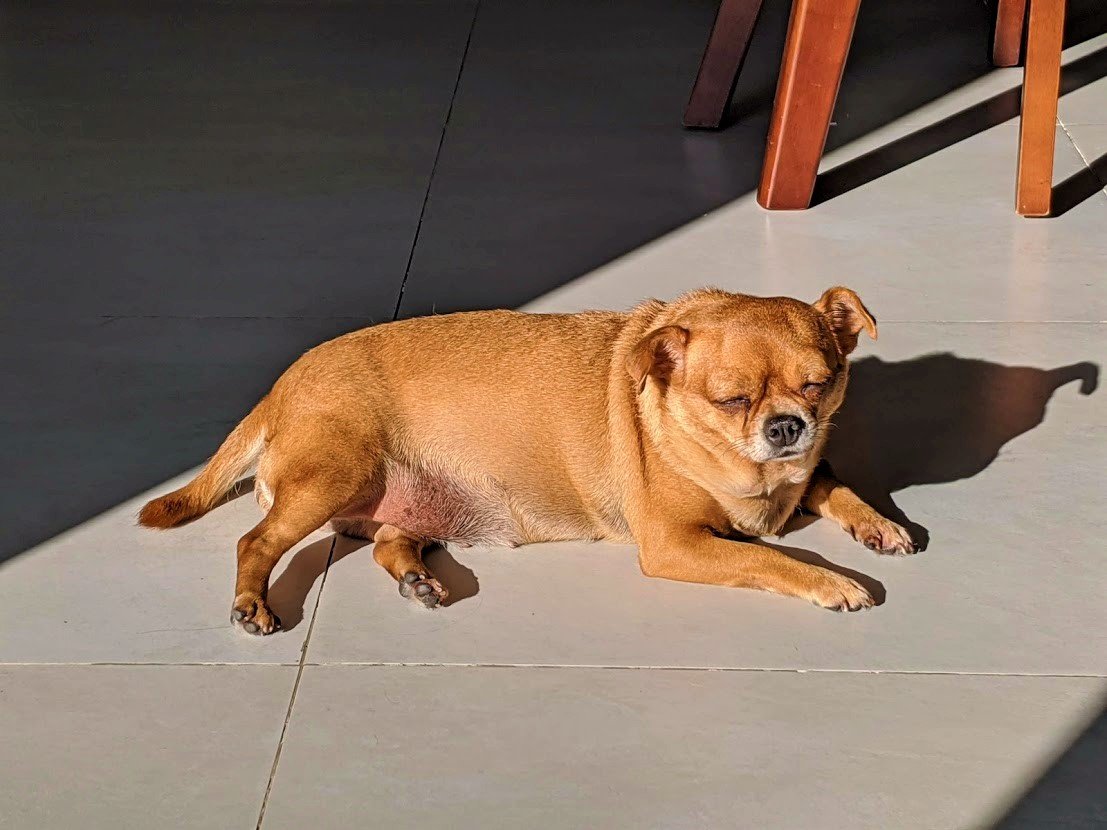
Many of Vung Tau’s streets are wide, leafy, and handsome. The thick, grey, gnarly trunks of century-old trees lining the french colonial-era grid of streets behind Bãi Trước beach (whose roots run beneath the road surface, rupturing the smooth asphalt), look like elephant’s feet astride the boulevards. The ocean stretches to the horizon, criss-crossed day and night by shipping of all sizes: tankers, container ships, wooden fishing vessels, coast guards, rescue boats, and fast ferries to Saigon and the Con Dao Islands. On the horizon, a constant line of cargo ships in silhouette, with plumes of smoke billowing from their funnels streaking the sky in the direction of the prevailing wind, like vaporous windsocks. The seafront road wraps around the entire peninsula, offering views out across the bay and back to the marshlands, mangroves, shipping ports and factories due west toward the mouth of the Saigon River.
The city is large but manageable, most of it nestled on the flat land between the peninsula’s two peaks, Núi Nhỏ (Small Mountain) and Núi Lớn (Big Mountain), both of which are covered in flowering tropical trees. The lower slopes are scattered with villas, hotels, and leafy Buddhist pagodas, all connected via steep, narrow paved lanes, like a medieval village rising up from the harbour on a Mediterranean island. On both ‘Big’ and ‘Small’ mountains, several lanes continue up past the villas and pagodas all the way to the peaks, snaking through hairpin bends, past military outposts – some abandoned, some operational – before summiting and revealing expansive views over the city and out to sea.
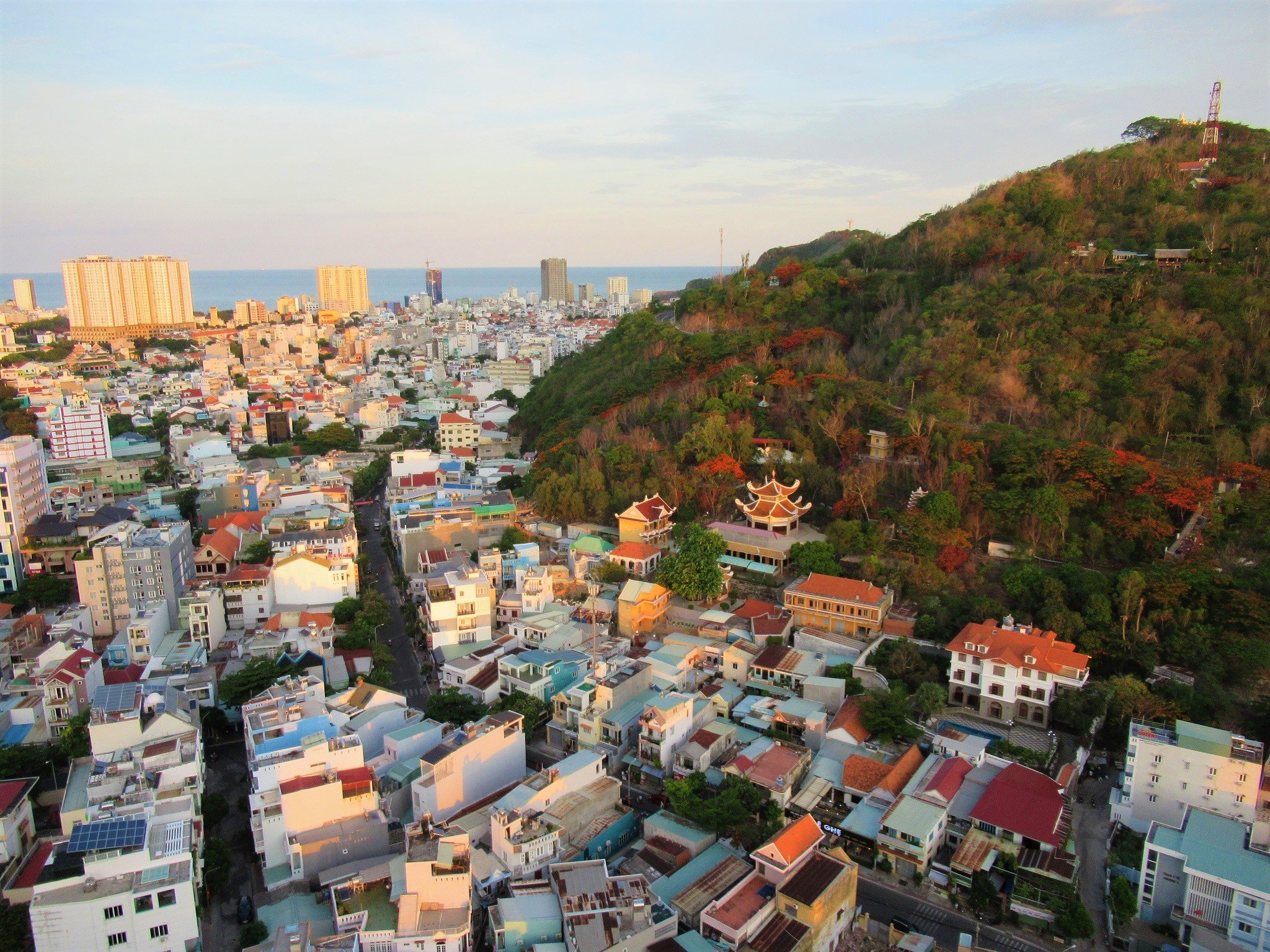
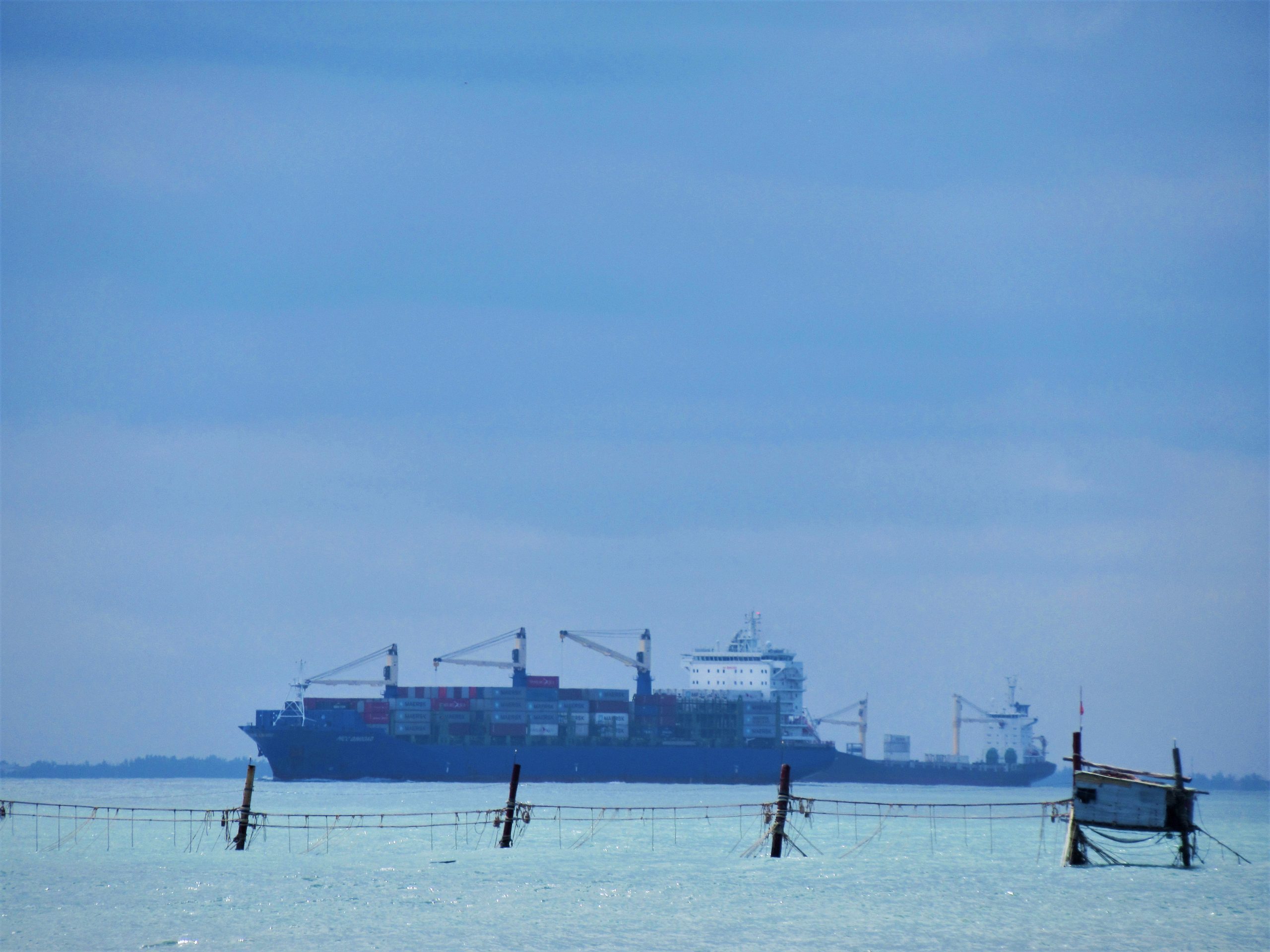
In the course of just a couple of months, everything had changed. Hobbies, sports, social life, professional life, family life – all of it was on hold and in a kind of limbo. In my own professional life, I have two means of income: I teach English and I run this website. My language centre in Saigon initially closed in February, but was quick to transition to online classes once lock-down began in April. However, I wasn’t able teach online as the internet connection where I was staying in Vung Tau wasn’t strong enough or reliable enough. Understandably, my school didn’t want online classes to be disrupted by lost connections and slow loading.
My website immediately suffered. The site traffic went off a cliff, beginning in February and progressing through March and April. By that time, no one was travelling in Vietnam nor was anyone making plans to travel to Vietnam in the future. Although it was hard to see the momentum of my website – which I’ve built-up over almost a decade – crash so suddenly, so unexpectedly and so dramatically, it wasn’t difficult to accept this consequence of the pandemic and to see it in the larger, extremely fortunate, context I was in, especially compared to most people in Vietnam, or for that matter, the world. I was in Vung Tau: I was comfortable and I was safe.
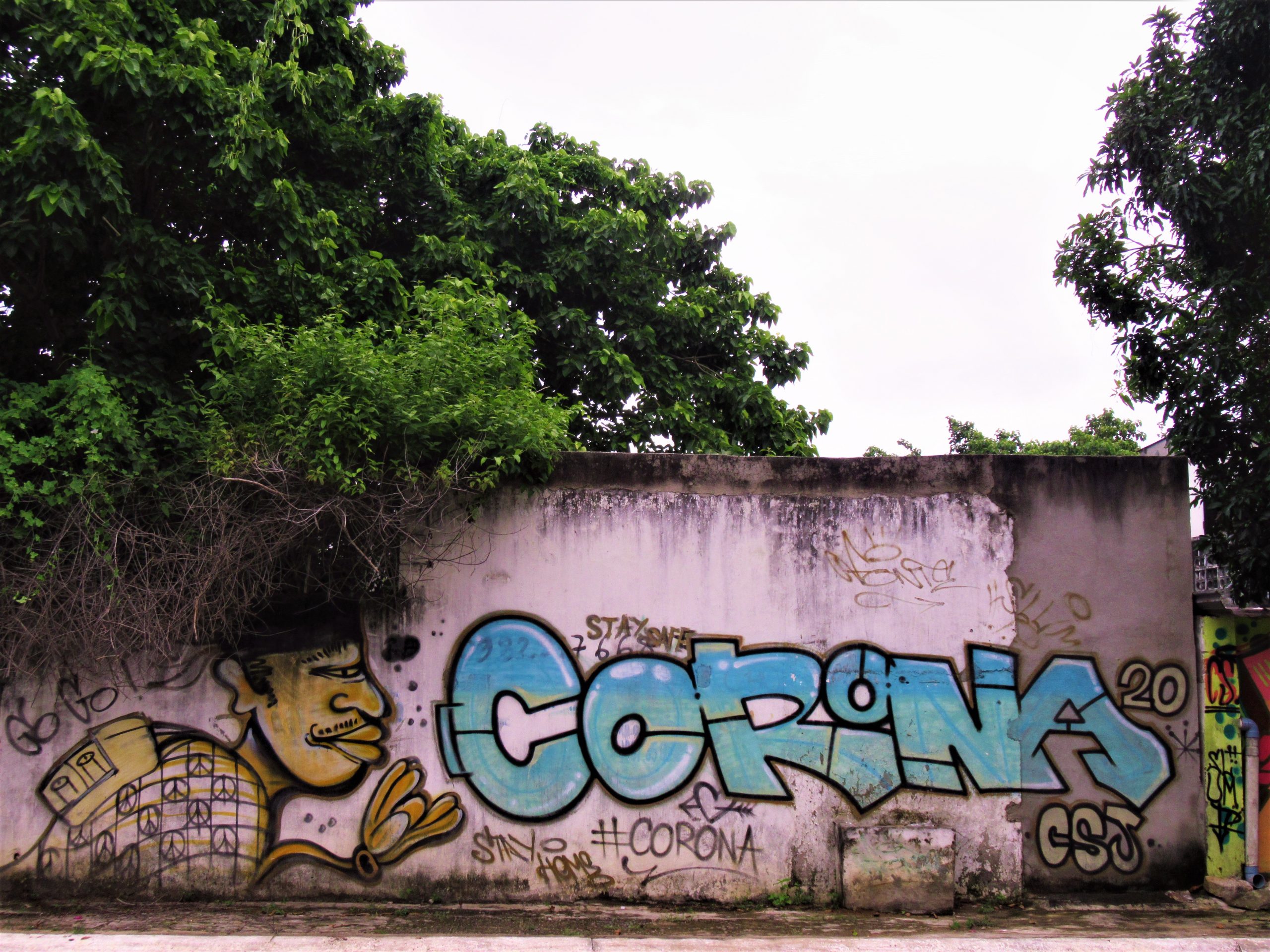
Vung Tau has one, long, sandy beach stretching along the east of the peninsula, known as Bãi Sau (Back Beach). This is where most of the high-rise hotel chains, nightclubs, souvenir shops, convenience stores, and vacation paraphernalia are: the touristy side of the city, without much charm or character, but with lots of sand and surf. Beyond Bãi Sau, rounding the southern tip of the peninsula, a giant statue of Christ looms over the city, gazing out to sea with arms aloft as though contemplating flight. Christ sits atop one of the lower peaks of Small Mountain, whose rugged slopes fall to the ocean creating Bãi Dứa (Pineapple Beach), a blustery but attractive and mesmerizing section along the seafront road with several good hotels, apartments, villas, and pagodas. From here, the embankment road swings north, stretching beneath the green heights of Small Mountain with its white, French colonial-era lighthouse placed on top like a cake decoration. Next, Bãi Trước (Front Beach) comes into view, a gentle, curving bay backed by a palm-studded seafront park with a hem of sand exposed at low tide and a clutch of wooden fishing boats moored offshore. Still, to some extent, a local beach, Bãi Trước is classy, characterful, and charming: well-used by local people of all ages, as well as vacationers.
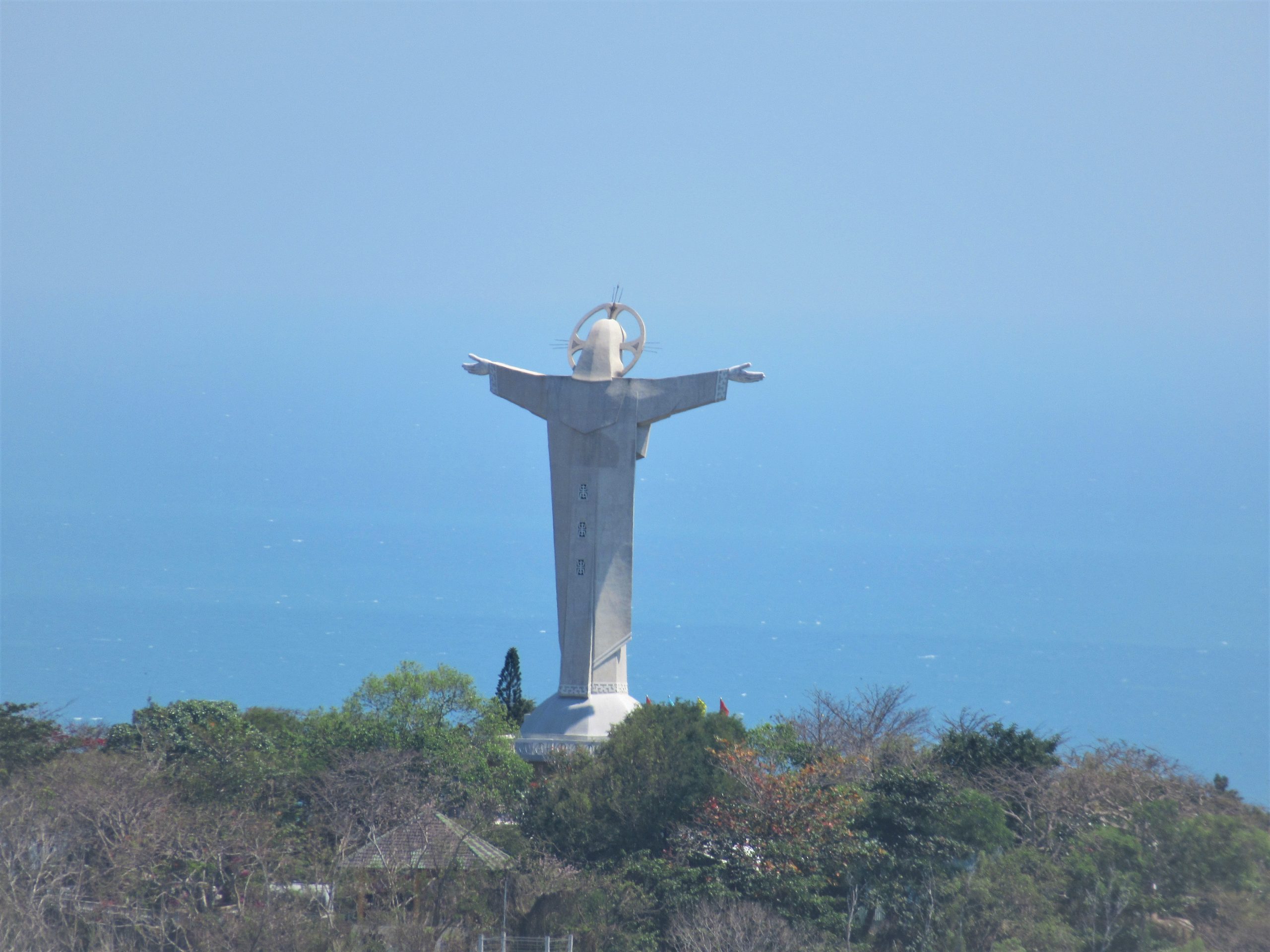
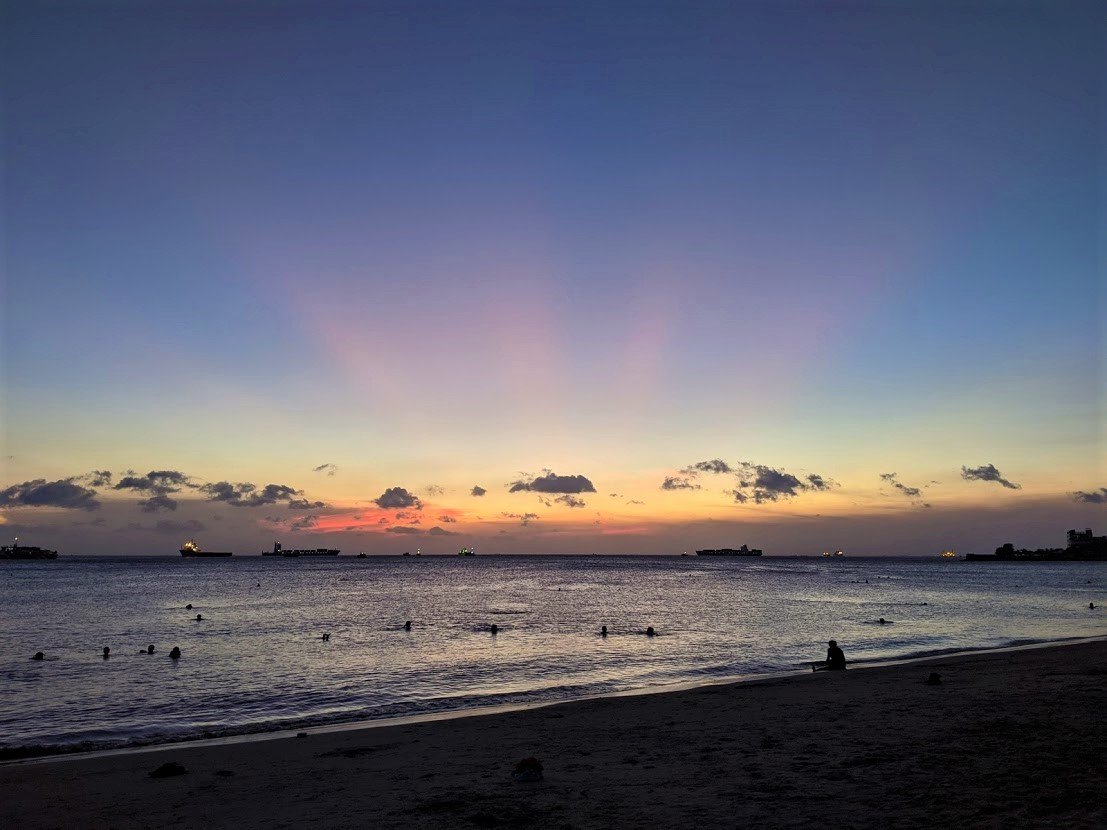
North of Bãi Trước, the steep slopes of Big Mountain bear down on the city, meeting the ocean at Ho May Port, where the boats arrive and depart for Saigon, and a cable car slides up the hillside to a theme park on the flat summit of the mountain. The white walls of Bach Dinh Palace, the former French Governor’s residence, stand out from the trees on the lower slopes. Continuing around the bottom of Big Mountain towards Bãi Dâu (Strawberry Beach), it feels increasingly like the affluent suburbs of Vung Tau, with sea-view apartments hugging the bay and modern villas hiding in the brush on the hillside, along with several Buddhist monasteries, temples, shrines, and a colossal statue of the Virgin Mary. Further still, to the northern tip of the peninsula, the seafront road turns back on itself, entering the rougher world of Ben Da fishing port and market. Well in the shadow of Big Mountain, a large fishing fleet shelters in a wide, calm inlet surrounded by fish processing-and-packaging factories and an oil rig depot. From here, a concealed lane heads up along the spine of Big Mountain, passing a French colonial-era cannon fort, and climbing to giddy heights with panoramic views.
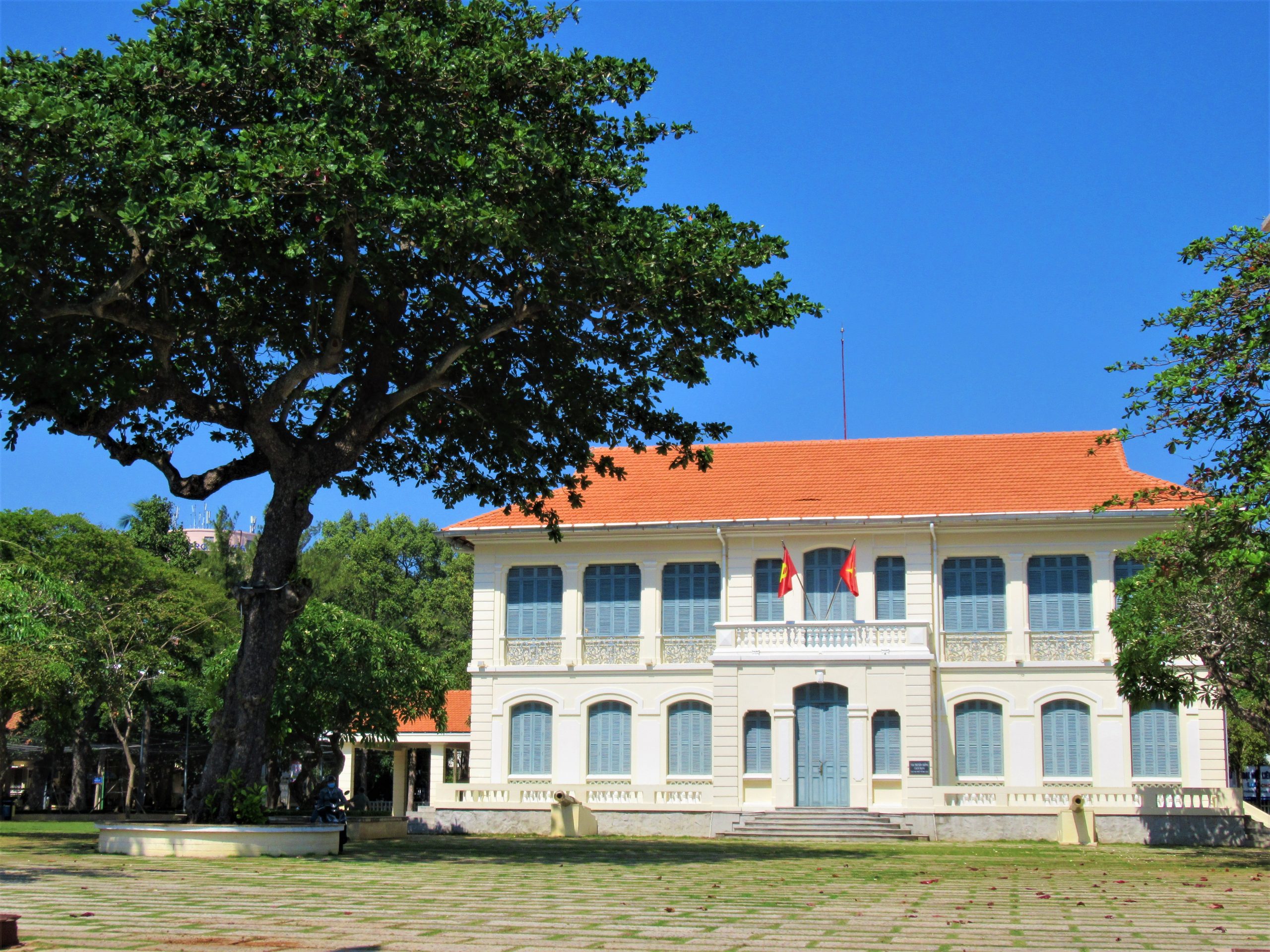
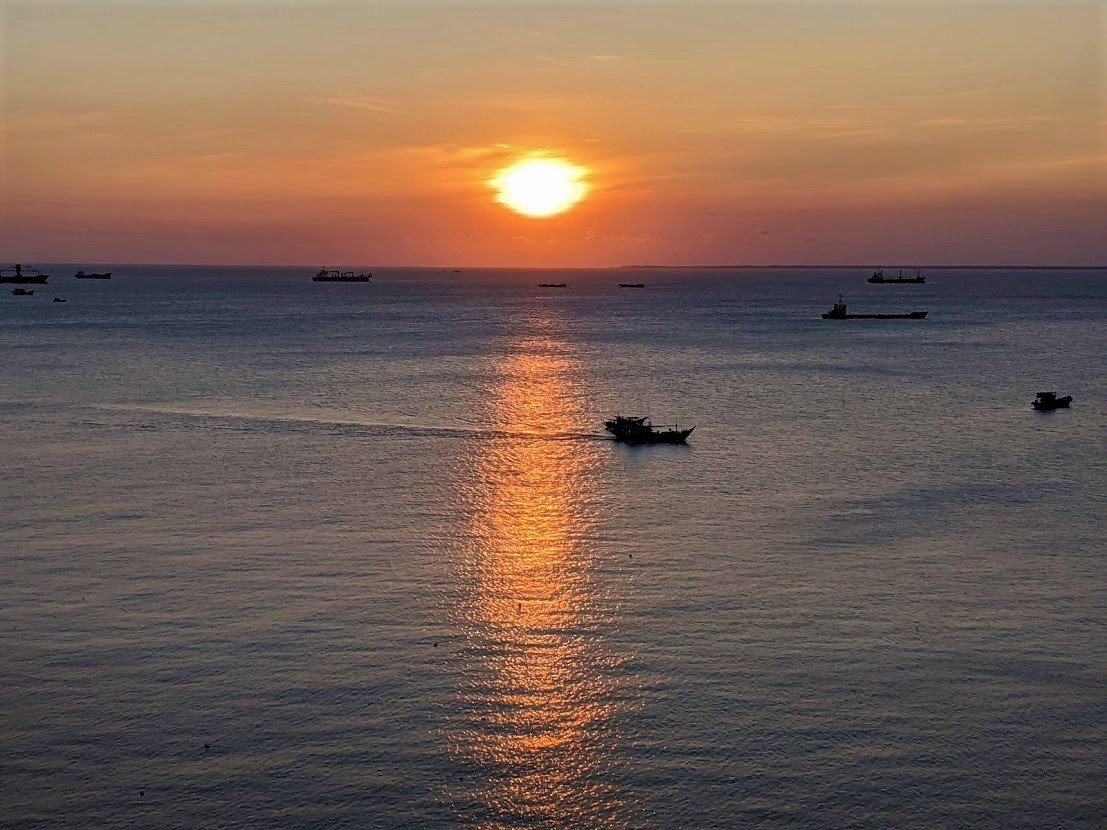
All things considered, I was very lucky: there was a lot to do and a lot to keep me busy; a lot to keep my spirits high and a lot to be grateful for and happy about. This was especially true as it became clear that Vietnam was a fortress against the virus compared to many countries around the world. I was lucky to be in Vietnam, but I was particularly lucky to be in Vung Tau, where (to the best of my knowledge at the time) not a single case of Covid-19 had been recorded, and where I had almost everything I could hope for. Sometimes, when Ben, Ruby, ‘Sushi’ and I would meet-up and walk along the empty seafront road or ride up to a viewpoint on the slopes of Small Mountain, all we could do was marvel at how fortunate we were to be in Vietnam, and how attractive and safe Vung Tau felt. It was difficult to believe what was going on in other countries, such as my own, the U.K, or Ben’s, the U.S.A. From where we were sitting, things appeared serene, safe, and under control.
[Back]
*
Implementation & Enforcement:
Nationwide lock-down in Vietnam began on April 1st, 2020. In addition, the weeks leading up to lock-down were considered a period of heightened social- and physical-distancing, during which many activities were either discouraged or banned outright. This, like so many rules and regulations in Vietnam, was essentially a ‘soft-opening’ for the inevitable lock-down that would succeed it: In the weeks prior to lock-down, the population was introduced to the idea of a lock-down and what that would entail, which took the form of heightened social- and physical-distancing. Indeed, during this period, many of the lock-down regulations were already in place, but, in reality, they weren’t generally adhered to. Rather, in March these restrictions were treated as suggestions, until, finally, from April 1st, they became rules that must be obeyed and taken seriously, and would be strictly enforced by authorities. Those not following the rules would be held to account: through verbal warnings, on-the-spot fines, and even detention.
In Vung Tau, an example of the ‘soft-opening’ principle could be seen in the local authorities’ attitude toward public gatherings at the beach. My hotel was a short walk from Bãi Trước (Front Beach). Before lock-down began, there were clear and obvious signs all along the seafront stating: ‘No Bathing and No Gathering in Large Groups at the Beach’. And yet, every evening from 4pm, crowds of locals and some visitors (including myself and my friends, Ben and Ruby) flocked to the seafront park to play around, promenade, and bathe in the ocean as the sun set on the horizon out at sea. Hundreds – perhaps thousands – of people each day frolicked in the waves, picnicked in the seafront park, and showered together in the public cubicles on the walkway. But, on April 1st, when everyone showed up as usual to Bãi Trước beach at 4pm, the rules were enforced. Uniformed authorities prevented anyone from entering the waterfront park, or from walking along the promenade, or from swimming in the sea, or from using the public showers, or from kicking a football along the pavement. Everyone who showed up was simply turned away: politely but firmly told that it wasn’t possible to hang out and enjoy Bãi Trước beach anymore. A public address system on the back of a truck reinforced the message, playing a recording on a loop stating the rules of lock-down and the fines that would be imposed on those breaking them.
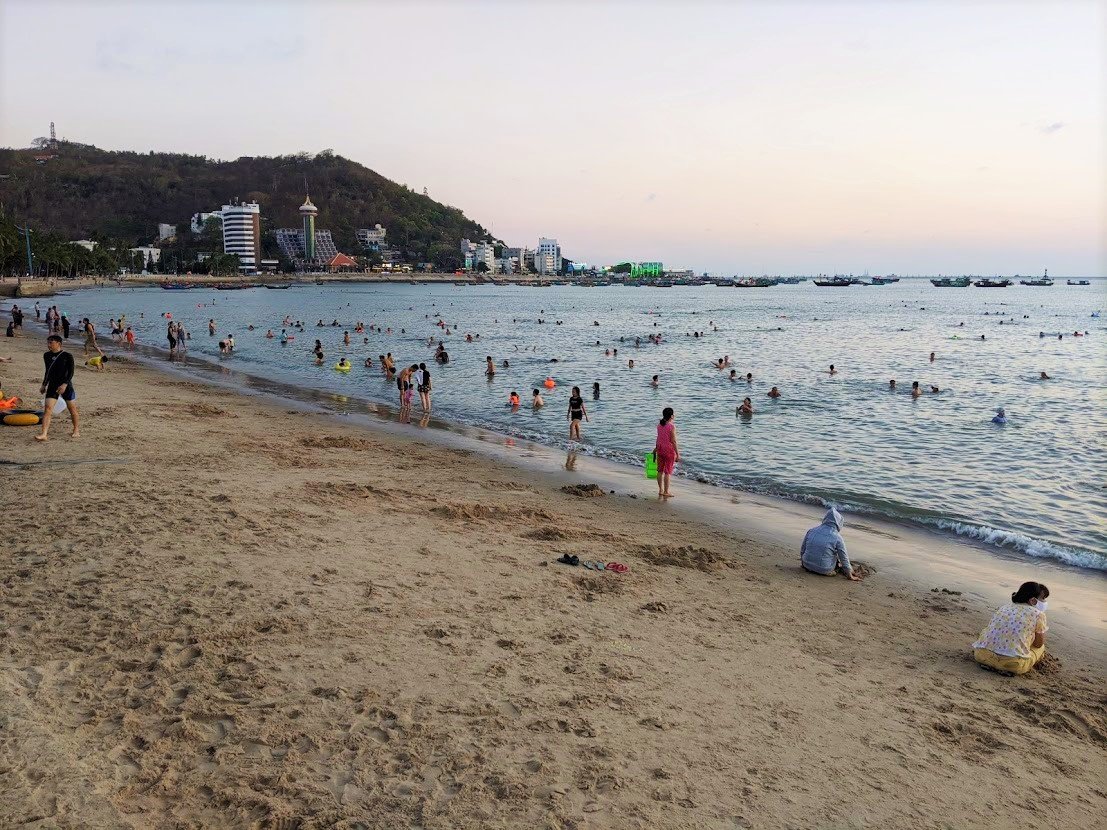
But, even then, official presence consisted of barely a dozen uniformed men and women patrolling the seafront. This handful of unequipped (save for an occasional baton) officials were in charge of controlling crowds in the hundreds. Presumably, the crowds were very disappointed not to be able to go to the beach anymore (as, indeed, were my friends and I), but there were no public displays of anger; no bemoaning the new enforcement of rules that, ultimately, we all saw the logic in; no protests or confrontations with authorities. We all just went home and worked out other ways to unwind in the evenings that didn’t involve going to a crowded beach during a pandemic. For the majority of my time in Vung Tau, I didn’t feel oppressed by the government’s lock-down regulations, I didn’t feel my independence and freedom were threatened by the physical-distancing laws, and I wasn’t suspicious or resentful of them. And, as far as I could tell, nor was anyone else I knew in Vietnam. We all saw the benefit and necessity of the rules and regulations: admittedly, not enough to follow them before lock-down – in the ‘soft-opening’ period – but certainly enough to obey them once lock-down finally came into effect.
Crucial to the public’s compliance with lock-down regulations, however, was the success the Vietnamese government had already had in containing the spread of the virus: they’d proved their approach was effective, and this made us (the populace) trust their regulations and follow them. This, of course, was not the case in my own country, the UK, nor in the US, nor many other nations in the much wealthier West. Governments there had failed to act early enough or decisively enough. And, by the time they were finally taking the pandemic seriously, it was already too late: public trust in their government had diminished and the citizenry was so divided that no lock-down strategy could be effectively enforced.
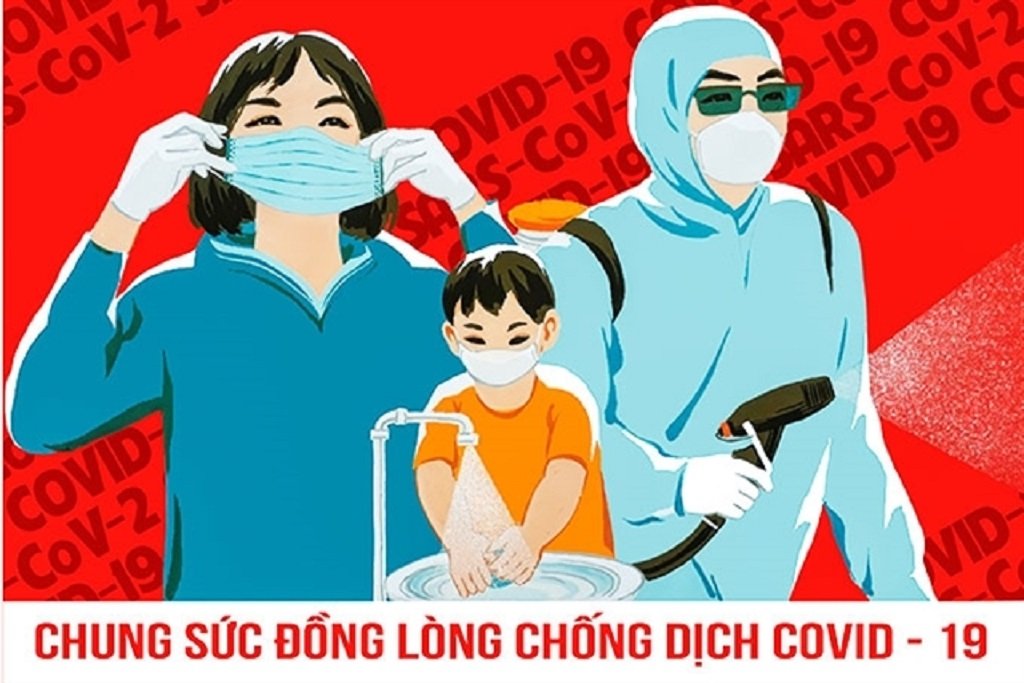
[Back]
*
Life in Lock-Down:
As it dawned on me that I would be in Vung Tau for an indefinite period of time (at least as long as lock-down lasted), I began to set up my hotel room as though it were an apartment and treated it like a temporary home. I bought some basic food supplies and a few large plastic barrels of drinking water and squared away one corner of the room for snack-, coffee-, and tea-making. In another corner, by the window, I set up an office space for working on my website and writing emails. Another corner – on a soft chair with a low desk – I allocated as my social-life and recreational space: for Skype calls, watching movies, playing the guitar, reading, and exercise.
Gradually, a daily rhythm set in. I got up at a reasonable hour (not particularly early, but not too late), practiced a breathing technique for 15 minutes on the floor of my room, and did some stretching. Then, I took a shower and made coffee and breakfast in my room: muesli, yogurt, nuts, honey, and a banana. I read the news online, attended to emails, and did some writing on my website, then I went for a swim. Mid-morning, I’d walk or ride my motorbike to get a fresh orange juice to take away in my flask at the juice store on the corner of Le Lai and Pham Ngu Lao streets, and pick up another coffee at one of several cafes that remained open (take-out only, of course). Sometimes I’d have a second breakfast, such as bò kho (beef stew) at Duyên soup house or pick up some baked goods at Bánh Mì Thi Thi. Then I’d ride my motorbike to the seafront, or to one of several hillside pagodas on the slopes of ‘Big’ and ‘Small’ mountains, or to a bench beneath a bodhi tree on Thong Nhat Street. (The latter I’d often be sharing with a local ‘tramp’, sprawled out, semi-conscious, in a drunken sleep, the two of us causing any passersby to do a double take: we must have looked an odd couple). At any of these places, I’d spend an hour or two nursing my second coffee of the day while writing and working on my website, or just thinking, taking in the views, and absorbing the eerie peace of lock-down.
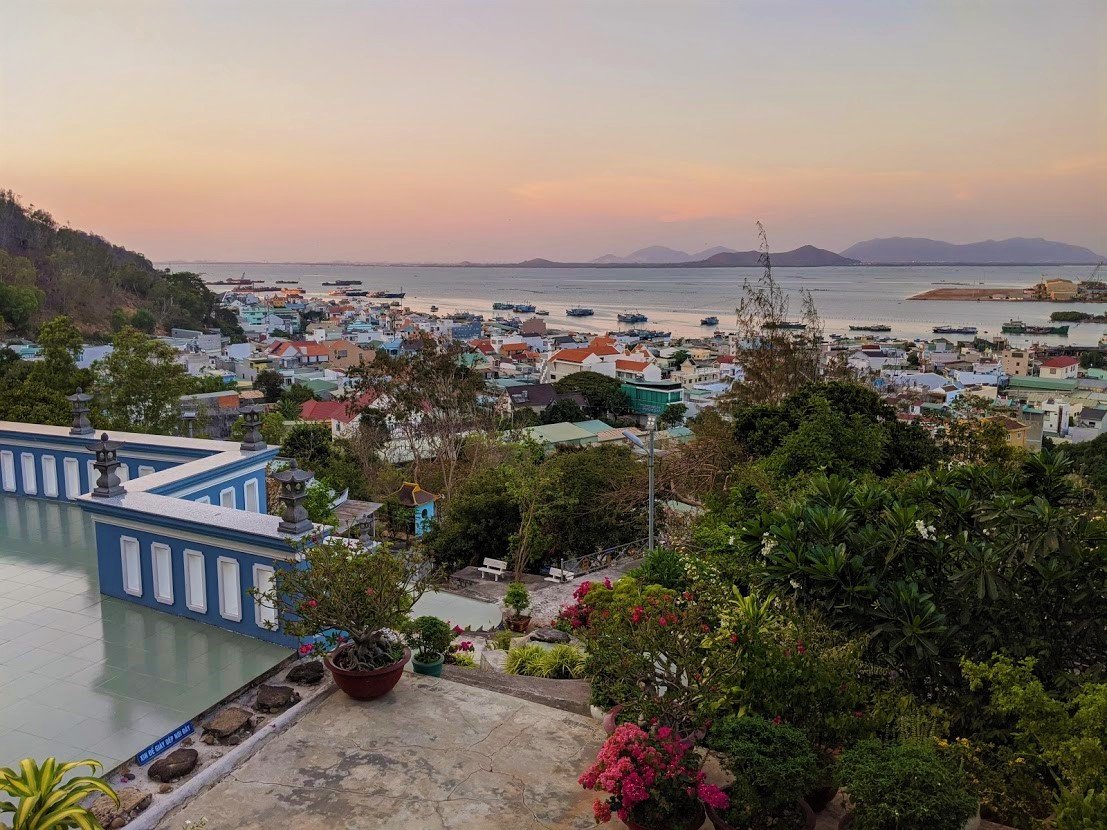
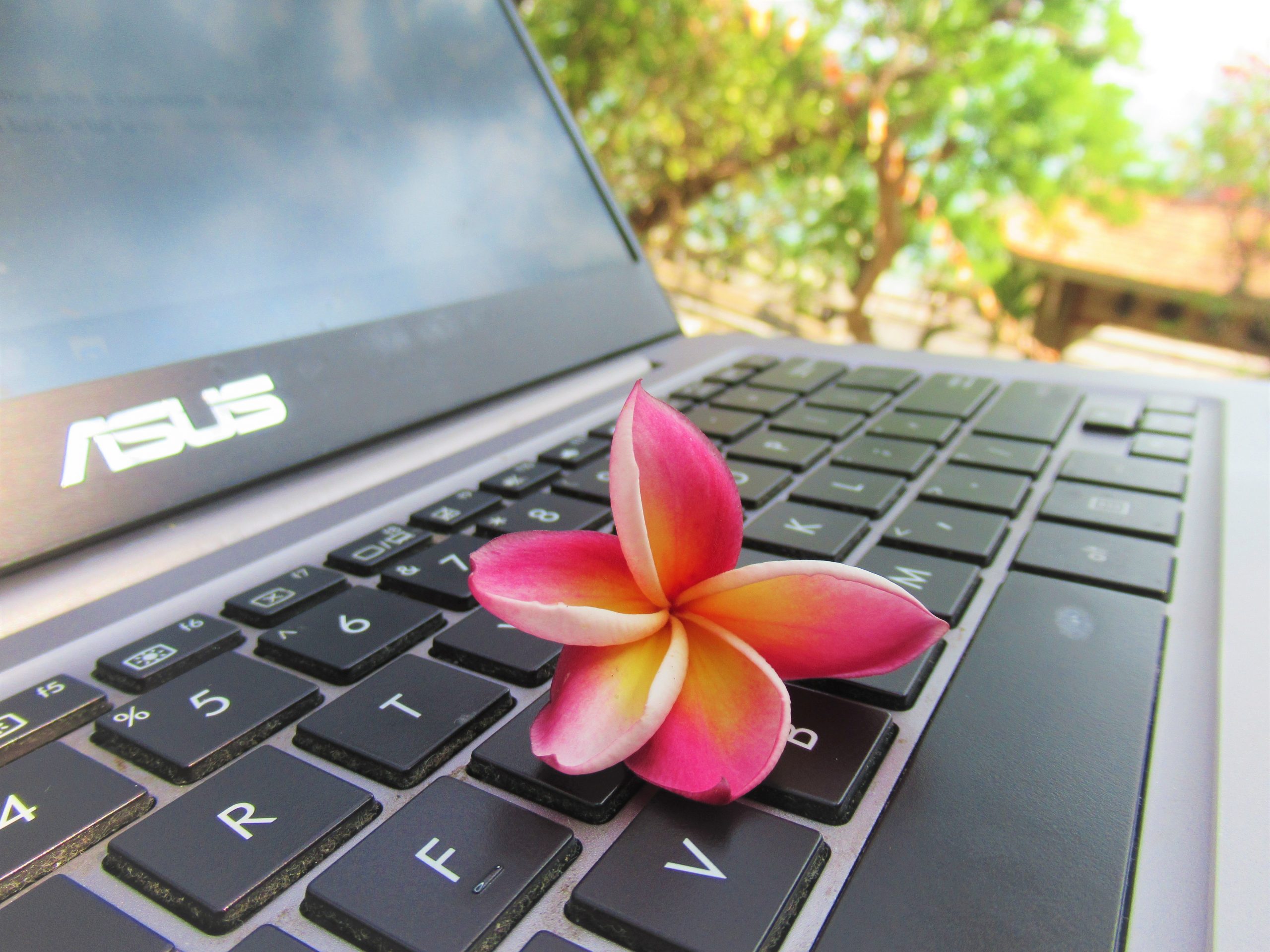
Mid-afternoon I’d head back to the town centre to fill my flask with rau má juice (a clover-like green leaf with a vegetal flavour served over ice, often translated ‘pennywort’ or ‘centella’) from Bà Già, a long-running Vung Tau institution famous for its juices, which remained open throughout the pandemic. Next, I’d buy some food to take back to my hotel room for dinner later in the evening: sometimes I’d fill my reusable box with an assortment of vegetarian dishes from a little, friendly place on Le Lai Street, or rotisserie chicken from either Léo or ‘chicken corner’, or English-style pies, cheese, biscuits and dark chocolate (a treat) from one of the few ‘Western stores’ in Vung Tau, such as Linh Phuong and Q-MART, catering to the tastes and needs of the expat community. Before returning to my hotel, I’d stop to drink a fresh coconut at a roadside shack.
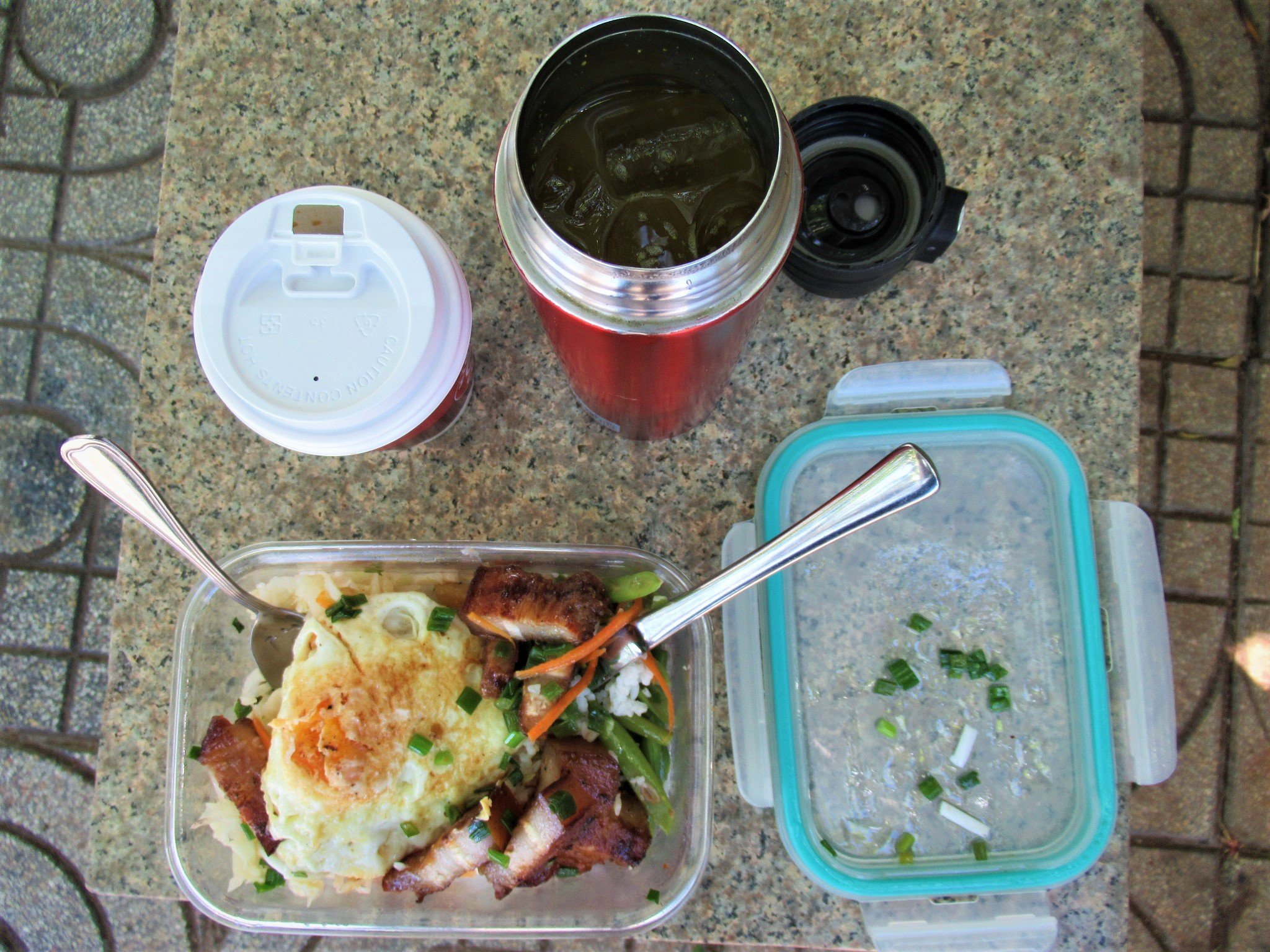
The late afternoons I spent exercising. Sometimes I’d run along the seafront road, or go for another swim, or do HIIT (high-intensity interval training) routines in my room, or stretching and yoga outside on the patio. I tried to vary my exercise each day. The evenings were my social and leisure time: a Skype call with a friend or family member somewhere in the world, or even a real-life, in-person meet-up with Ben, Ruby and ‘Sushi’. We’d go for a stroll and a chat, or a movie at their place with a take-out pizza from Pizza Leo, or a home-cooked meal which Ben and Ruby were kind enough to produce. Finally, my nights consisted of another 15-minute breathing session, some songs on my guitar, a hot bath accompanied by my Kindle and a ginger tea, then a movie or a couple of episodes of a series or a comedy on my laptop to put me to sleep.
[Back]
*
Face Masks: Culture & Etiquette
When lock-down began, on April 1st, all the rules and regulations surrounding social- and physical-distancing and self-isolation that had been lightly upheld during the ‘soft opening’ period, were now fairly strictly enforced. Of all these rules, wearing a face mask was the most commonly adhered to, even as far back as late January, when the virus first broke in Vietnam. As has been repeatedly pointed out in Western media, the transition to wearing face masks in public may have been easier in East Asian and Southeast Asian countries because, in this part of the world, many millions of people have been wearing masks to protect themselves from inhaling harmful particles in polluted air in big cities and industrial zones for years.
But, there’s another reason people have been wearing masks in Asia for such a long time: to protect others when they themselves are sick. As a sign of respect for your fellow humans, when you have a cold – a virus – you wear a mask in public so as not to spread your illness to others around you. This practice is not as widespread in Vietnam as it is in other parts of Asia, such as Japan, but the etiquette still exists here, increasingly so among middle class families, like the ones I teach at my English language centre, in Ho Chi Minh City. On any given day, even before the pandemic, one or two students in each of my classes would come to school wearing a mask, because they had a cold and wanted to protect their classmates and teaching staff from the virus they were carrying.
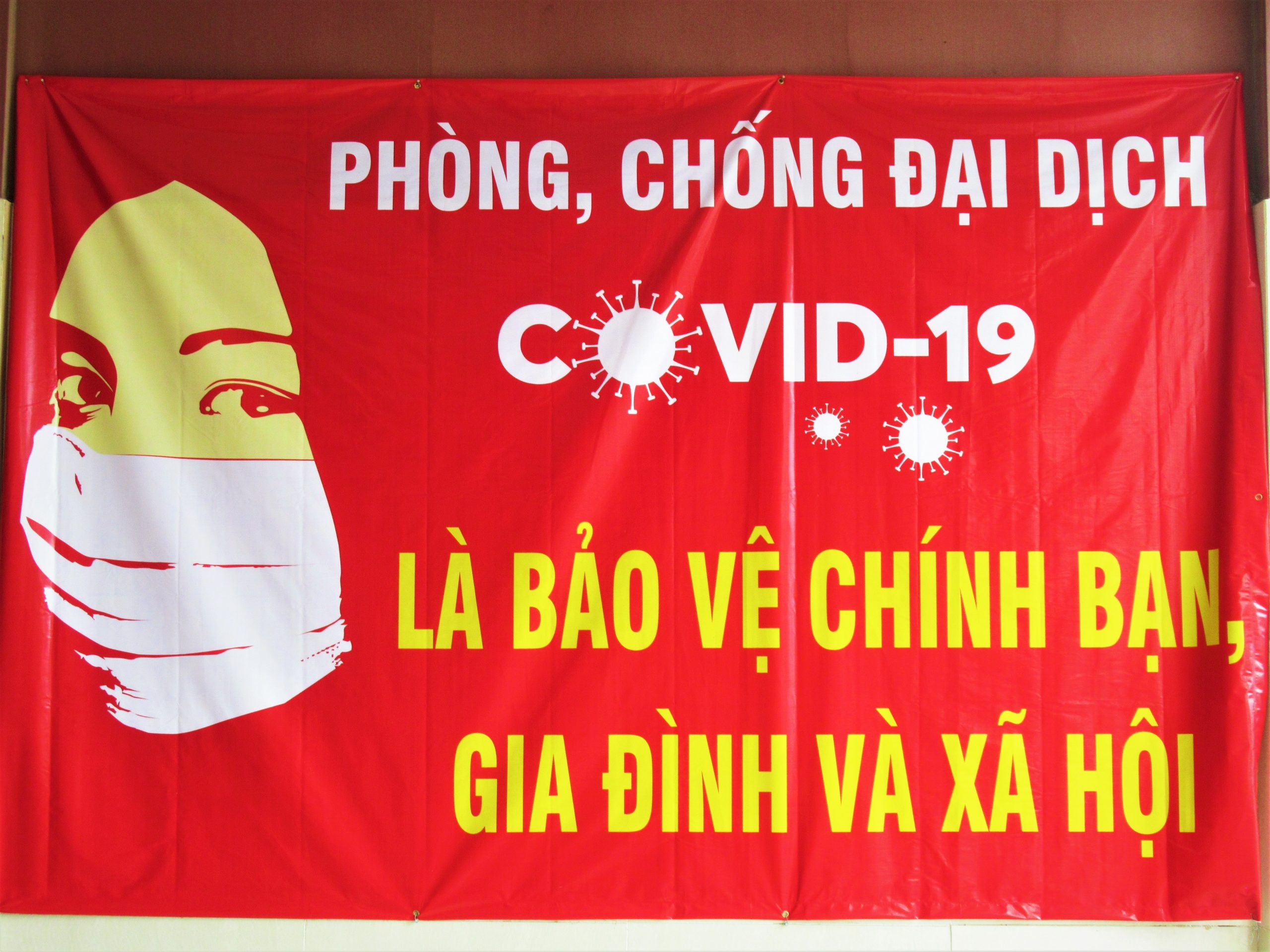
When the coronavirus hit Vietnam and government advice on mask-wearing was issued, this was a no-brainer for many Vietnamese. Indeed, when such a fuss was made over mask-wearing in some Western countries, such as the United States, this baffled many Vietnamese I spoke to who simply couldn’t see the harm in wearing a mask, but could see the potential harm in not wearing one. Other Vietnamese friends I talked to were typically understanding of Westerners’ reactions to mask-wearing, recognizing certain cultural differences between here and there, which included a tradition of questioning those in power, and a different way of thinking that put a premium on the freedom of the individual over the community. The latter is generally not the case in Vietnam, nor in many other countries in this part of the world. For me, hearing some of my Vietnamese friends and acquaintances express sentiments such as this, was yet another reminder that people in Asia generally have a much better understanding of Western culture than people in the West do of Asian culture. And this imbalance is likely to cause a lot of problems and difficulties as we plough deeper into a century which will probably be defined by the economic rise of Asian countries and the economic decline of Western ones. Without an equal understanding on both sides of the others’ culture, confrontation and conflict are far more likely to occur.
Ultimately, mask-wearing would become a matter of contention and debate in many countries in the Western world, but not in East Asia and Southeast Asia. I admit to feeling slightly ‘silly’ when first wearing a mask in public during the very early stages of the pandemic. I felt conspicuous and self-conscious, even in Vietnam. I was concerned about my appearance: I didn’t what to look ‘funny’ or different. In the beginning, there was even a part of me that felt embarrassed about wearing a mask, because it might look like I was taking the virus too seriously, when really it was just a remote problem in another country that I’d seen on the news and become paranoid about and scared of.
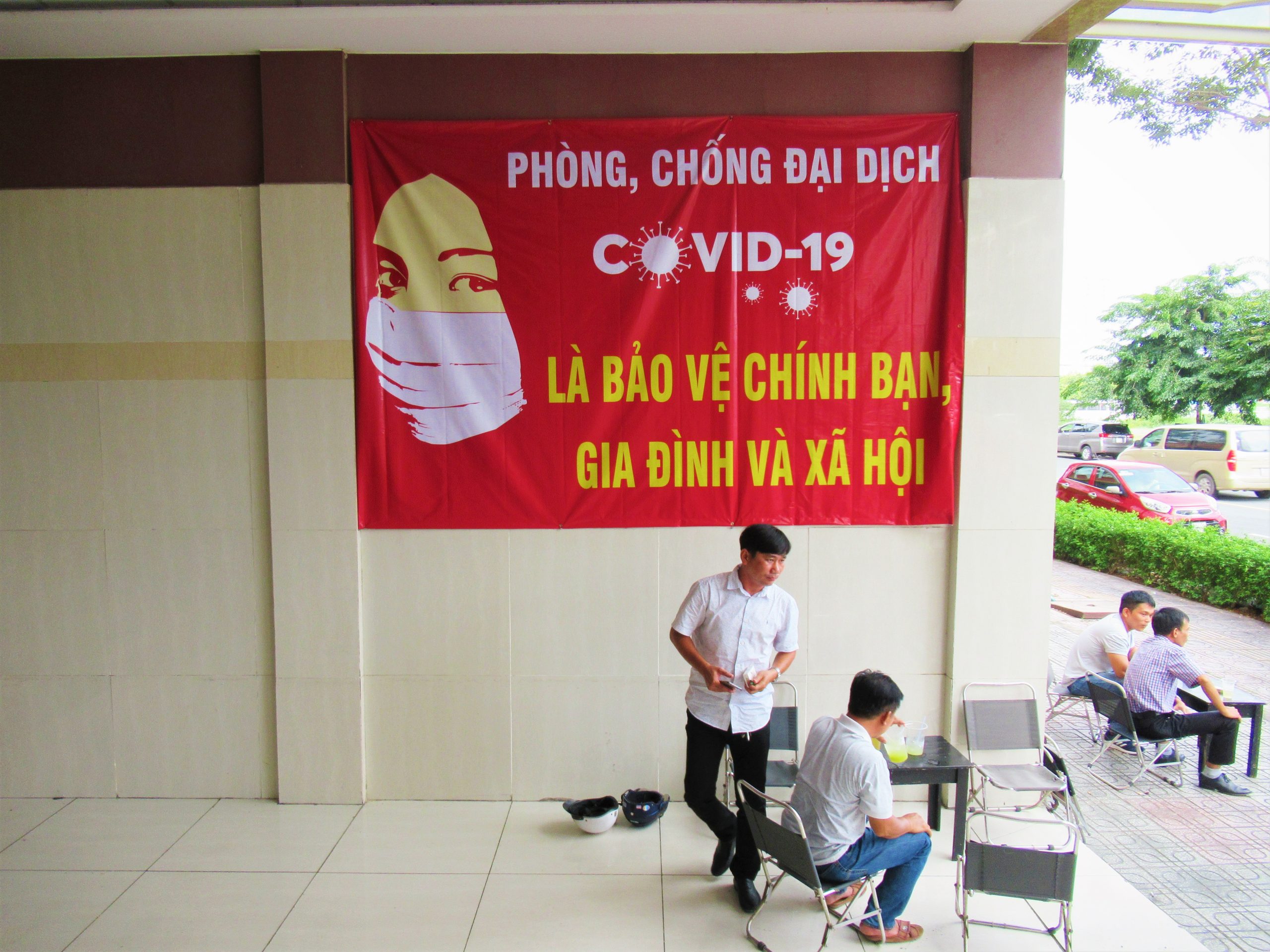
For many people who were reluctant to wear masks, it seemed their main objections were based on appearance and inconvenience, rather than issues of effectiveness. The latter became an acceptable excuse for non-wearers, but was not the primary reason. Wearing a face mask is mildly inconvenient, somewhat uncomfortable, but most of all, it looks a bit funny. And, for men in particular, there’s a perception that wearing a mask makes you look weak. Although the latter attitude was also on display in Vietnam where, in the early stages of Pandemic Season, it was very noticeable that women were much more likely to wear masks than men, it was far more pervasive among Western males (including male politicians). Indeed, I was surprised to find out that many of my male friends in the UK were reluctant to wear a face mask. I see a parallel to this in the male perception of smiling in the UK versus that in Vietnam. Smiles come much more easily to Vietnamese men than to British, whom, I suspect, perceive the smile as a sign of weakness, submission and subservience, rather than of openness, hospitality and friendship.
Attitudes to mask-wearing in the West weren’t helped by muddled advice from medical experts and governments, many of whom ended up making U-turns on the subject: notable examples being, again, the UK and the United States. However, as mentioned earlier in this piece, if the virus had manifested itself in a more obvious and visible way – for example, a cloud of purple vapour issuing for a person’s nose and mouth – I’m confident we’d have all gotten over our issues with face masks long ago, be they based on vanity, individual freedom, or science.
[Back]
*
Psychology of Lock-Down:
As comfortable, secure and atypical as my lock-down context was, in terms of my emotional, spiritual and psychological state during this period, I expect my experience is far more relatable. After the upheaval and uncertainty of the months leading up to it, lock-down was a period of stillness, routine, rhythm and reflection. It was a time to process all that had happened since the turn of the decade, to catch-up with events as they unfolded across the globe, and to contemplate what the pandemic might mean for the future.
On the one hand, lock-down was characterized by a wistfulness and nostalgia for the pre-Covid era, but it was also a time of adaptation and action. Our lives had been fundamentally changed in many ways, so we were forced to adjust and innovate, especially with regards to work, family, social life and leisure activities. This was unnerving, of course, but it was also invigorating. A dramatic shift in the status quo required an equally dramatic change in the way we lived. Rather than descend into a state of ennui, many people I spoke to found that they became more active and alert during lock-down and the height of Pandemic Season. (As it turned out, feelings of ennui were far more common in the post-virus period in Vietnam, once the emergency appeared to be over.)
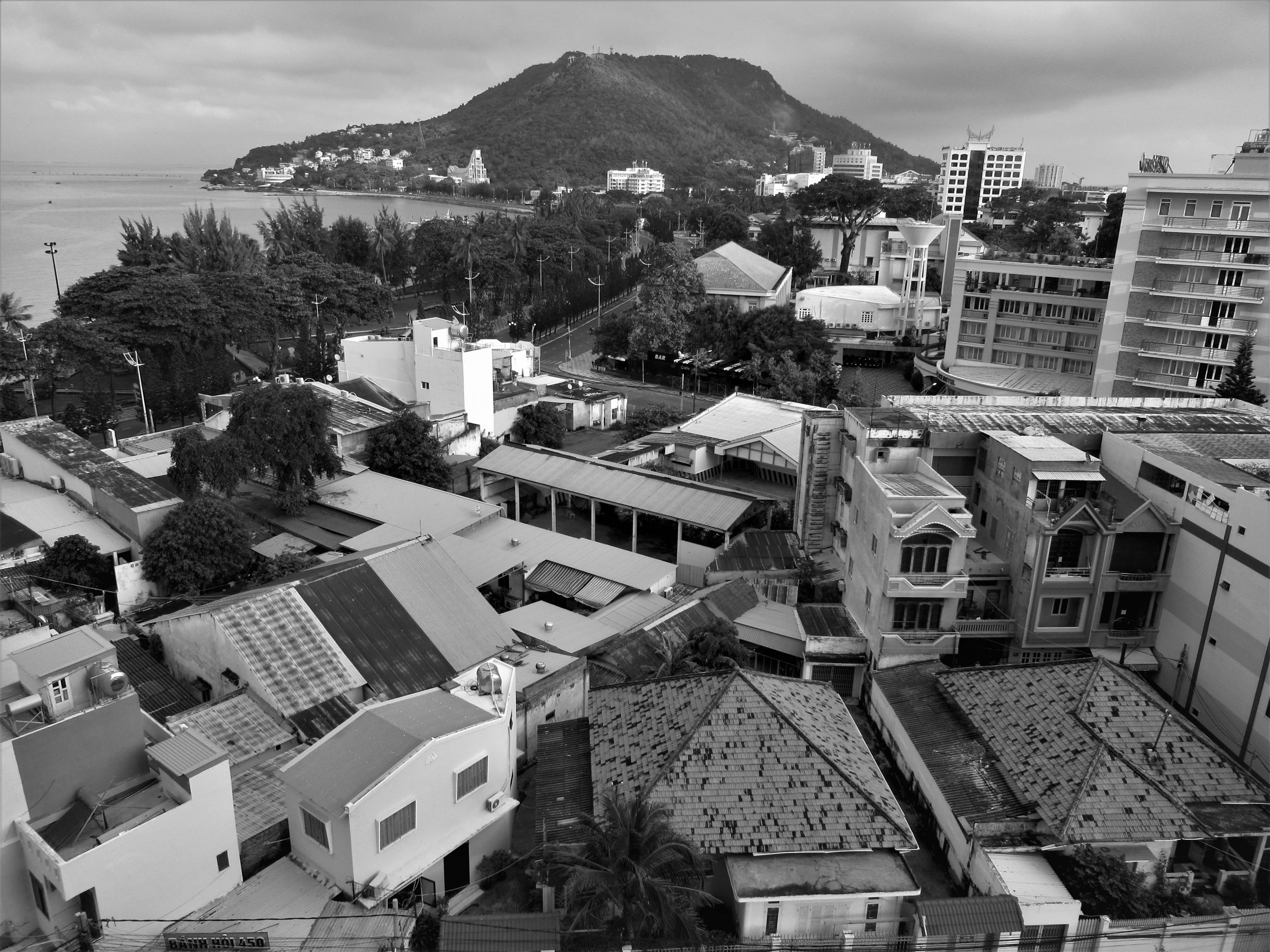
Every night in the bathtub in my hotel room in Vung Tau, I read aloud: sometimes for company, sometimes for entertainment, sometimes just to keep my vocal chords operating. I found myself drawn to books from my past and ones that advocated endurance and facing reality. Many of these were formative books from my teens, university years, and early twenties. I read Lattimore’s translation of ‘The Odyssey’, Homer’s epic poem about Odysseus’ return home from Troy: possibly the greatest story of endurance ever told. I read Sophocles’ ‘Oedipus Rex’, a play that offers no escape from reality whatsoever. (Indeed, there was something of a parallel between the present and ‘Oedipus Rex’, whose events unfold during a plague upon the city of Thebes.) I read ‘The Last Days of Socrates’, Plato’s tribute to his philosopher friend and mentor, and a memorial of his final days before drinking poisoned hemlock, a death sentence brought on him by the Athenian court, which he accepted unflinchingly.
I read anything I could by Hemingway, because I’ve always loved his style and he seems to me such a serious and sober writer. I read ‘Meditations’, the Roman Emperor Marcus Aurelius’s guide to Stoicism. I read ‘Siddhartha’, Hermann Hesse’s novel of spiritual awakening and asceticism inspired by the life of Siddhartha Gotama (The Buddha). And I finally finished reading Naomi Klein’s ‘This Changes Everything’, a critique of capitalism in the face of climate change. These books kept me company in the bathtub for six weeks of social-distancing and lock-down, and, I like to think, helped fortify my mind and spirit in order to endure Pandemic Season.
[Back]
*
The ‘Fight’:
In Vietnam, it was common for the government and media to portray action to contain the virus as a ‘fight’. Indeed, this was common around the world. But, if this was a fight, the enemy was invisible, and it was difficult to conceive of the threat of something one couldn’t see. To ‘fight’ suggested action. But how was one to act against an invisible enemy? I found this somewhat confusing and frustrating. If the virus was to be my generation’s ‘fight’, or at least a defining event that threatened our existence and way of life (climate change notwithstanding), how was I to take part? What was my role, my action in the resistance against the virus? Every ‘action’ we were told to take was passive and seemed more like inaction: stay home, self-isolate, social- and physical-distance: sit back and binge-watch Netflix. It felt as though, for the average person in this ‘fight’ against the virus, we were largely impotent.
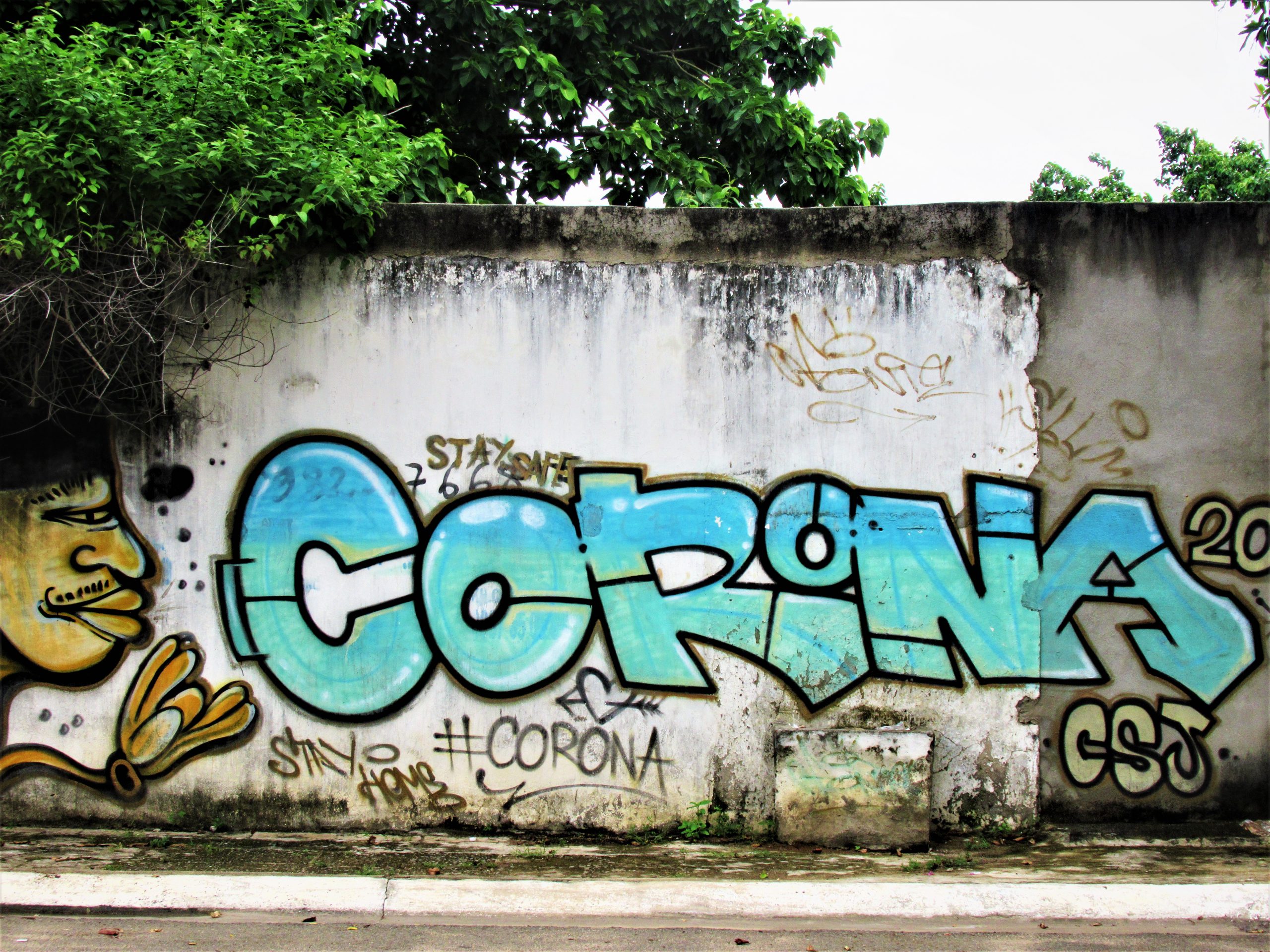
Nor was there much of a sense of camaraderie or unity that one might expect to come from a mass struggle against a common ‘enemy’: people putting aside their minor differences and coalescing in order to fight a bigger, more significant threat. This wasn’t possible when best practices included not having contact with other people: not shaking hands, not hugging, not gathering, and not talking in-person. The goal was the opposite of community: it was isolation. Indeed, in this ‘fight’ your comrade might unknowingly be the enemy: might be carrying and spreading the virus unwittingly as a symptomless Covid-19 patient. Far from bringing us together, the coronavirus made us fear human contact and treat everyone with suspicion.
In turn, some of our world leaders and popular commentators proved depressingly incapable of uniting and coming together in the face of adversity, as Covid-19 became an increasingly politicized subject, with politicians and media outlets sometimes more concerned with pointing the blame for the virus than working together to contain it. Much like climate change, Covid-19 is a situation that no country is safe from and that no country can handle on their own. It wouldn’t matter if Vietnam had zero cases of coronavirus and the U.S had 100 million; Vietnam would still suffer the broader consequences of the pandemic despite its perfect record. Likewise, it wouldn’t matter if Vietnam achieved zero carbon emissions and the U.S continued to burn fossil fuels at the rate it does today; Vietnam would still suffer the consequences of climate change. Covid-19, like climate change, is a global issue requiring a global response. In these cases, no country can be an island. And yet, over the last 12 months, some of our world leaders and media outlets have continued to squabble about who is to blame – and even whom owes reparations to whom – for the pandemic. In this respect, if the global response to the coronavirus is anything to go by, there would appear to be little hope for climate and the environment.
[Back]
*
Taking ‘Action’:
Besides obeying lock-down regulations and heeding government advice on best practices, another ‘action’ one could take in the ‘fight’ against coronavirus, was to donate via one of several official channels to help the country deal with the pandemic. This was an ‘action’ I took (albeit in modest quantity). Subsequently, while in Vung Tau, I wrote a guide to How to Donate in order to help other foreign residents in Vietnam do the same. Indeed, many people I know also donated and, after publishing my guide, I received emails from people based in countries as far away as Europe who, having travelled to Vietnam in the past and fallen in love with it, also wanted to donate to help the country battle the virus. Part of the reason many people were so willing to donate was due to how successful the government’s response to the virus had so far been.
For a brief period in Vung Tau, the concept of herd immunity gave me some sense of purpose in the ‘fight’ against Covid-19. As I understood it, herd immunity involved the younger generation (with stronger immune systems and less at risk of contracting or suffering serious consequences from the virus) continuing to live and work through the pandemic – keeping the economy ticking over and services running – while the older generation (with weaker immune systems and more at risk of contracting and dying from the virus) continued to social- and physical-distance and stay home, until we either built-up a general immunity among the population or a vaccine was developed. Perhaps, then, it was the responsibility of people under the age of fifty to stay fit and healthy and thereby ‘fight’ the virus on behalf of the older population. Perhaps this was my generation’s chance to step up. Millennials, so often ridiculed for their lack of grit and stoicism compared to the generations that preceded them, and for their sense of entitlement and self-obsession, could be the selfless heroes of Covid-19. Millennials (my generation), could continue to work and actively stay fit and healthy through one of the worst pandemics in over a century in order to protect the lives of the baby boomers (my parents’ generation).
To some extent this imbued my lock-down routine in Vung Tau with purpose. My physical exercise took on a new role and a greater intensity: I swam, I ran, I did yoga, breathing techniques, and high-intensity interval training (HIIT). The small gym at the hotel where I was staying was closed because of the virus, but staff agreed to lend me some equipment so I could work out in my room. I ate fairly healthily, I drank lots of juice, I stayed hydrated, I tried to get enough sleep. I’m not particularly young anymore, but I’m reasonably fit, healthy and physically active. If maintaining my health and immune system during the pandemic was a way to participate and be proactive in the ‘fight’ against Covid-19, this was at least something I could do. I’m not suggesting these actions had any real impact on the wider situation, only that the concept made me feel less passive, less impotent, less of a bystander during lock-down, especially as I had parents both in their mid-seventies living in a country 6,000 miles away, where the virus was out of control. Physically and psychologically, it gave me something to focus on. My parents, too, made a conscious effort to remain physically active during their months-long lock-down in the UK: paying attention to their diet, general well-being, and trying to maintain a healthy immune system.
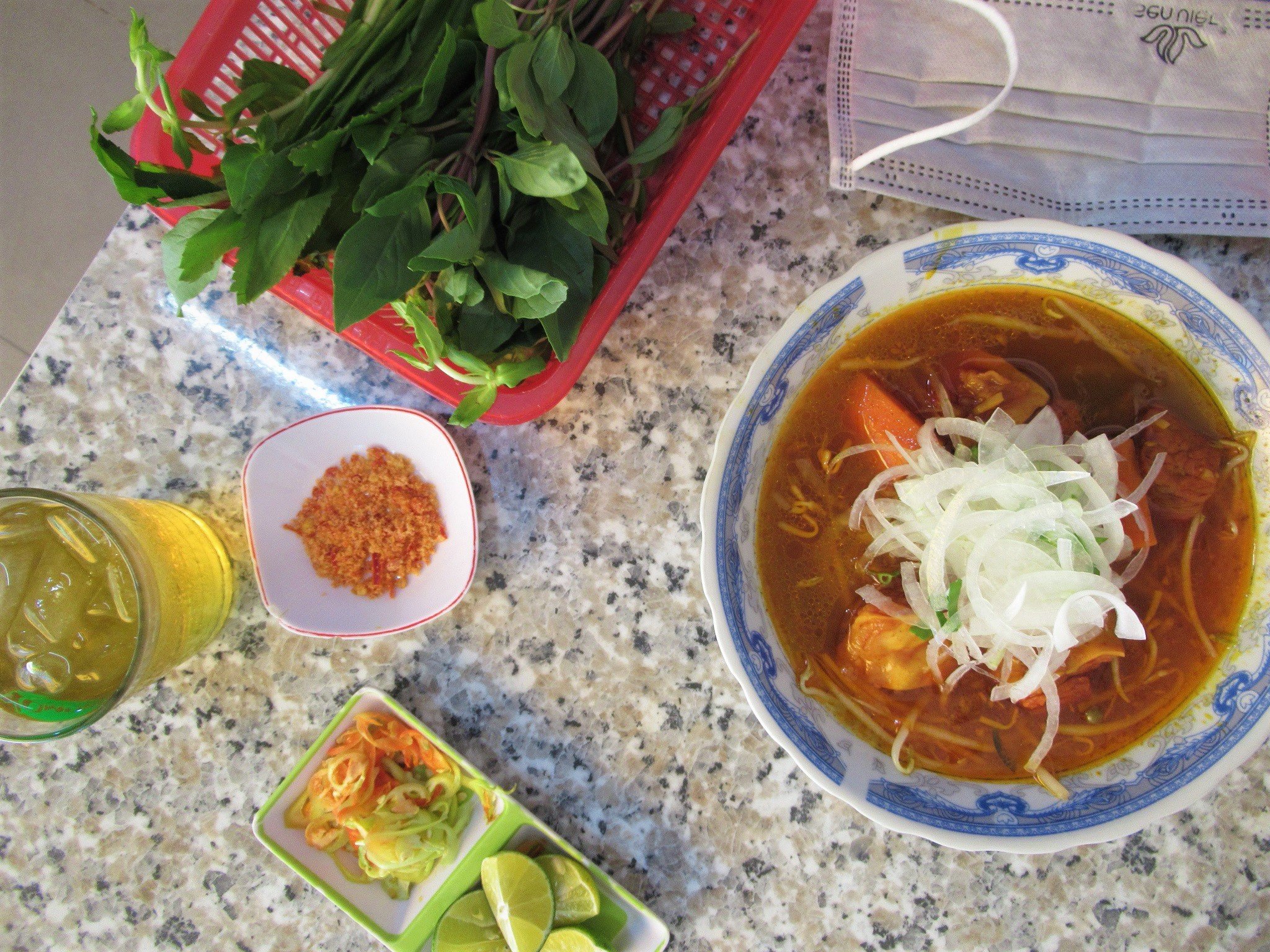
[Back]
*
Resistance & Compliance:
As the rules were tightened in Vung Tau, there were several occasions when I instinctively reacted with irritation and frustration when faced with restrictions and regulations that inconvenienced me or got in the way of my personal liberty. One example, among a few such instances, was when I went to meet my friends, Ben and Ruby, at their Airbnb apartment by the seafront, near Bãi Dâu beach. After parking my motorbike in the underground lot and walking up to the lobby, a security guard informed me that I was required to write my name and details, including my phone number and passport information, in the visitors’ log. All I wanted to do was go up to my friends’ apartment: a simple task. I didn’t need the hassle of all this formality and bureaucracy: I knew I didn’t have the virus, I knew I hadn’t been out of the country for over 4 years, I knew I’d been acting responsibly and within the current regulations: so why couldn’t the security guard just let me go in? I even suspected I was being unfairly scrutinized because I was a foreigner: would a Vietnamese visitor receive the same treatment, I wondered?
My unjustified annoyance only lasted a few seconds. Logic quickly set in: This was an entirely necessary procedure and part of the government’s successful system of contact-tracing. I left my full name, date of birth, personal phone number, home address, passport information and visa details with security; the date and time of my visit was logged along with the apartment number and names of the occupants. If, in the next few days, I was to become ill, there’d be a record of exactly where I’d been and whom I’d met: details for the government to go on in order to contact the people I’d been in proximity to, and the places that they might consider isolating. I knew how it worked – I’d seen it in the news everyday: a list of the new Covid-19 cases in Vietnam, along with a rundown of their movements and contacts over the last 7-14 days. My interaction with security at the apartment was the groundwork for successful contact-tracing. The security guard wasn’t a government official, but the protocol he was following was a national policy that came to him via a network of communication which began in Hanoi and filtered down through provincial-, district-, and neighbourhood-level government. This was Vietnam’s successful Covid-19 containment strategy in action, right here in the lobby. And, for a few seconds, I was impeding its effectiveness.
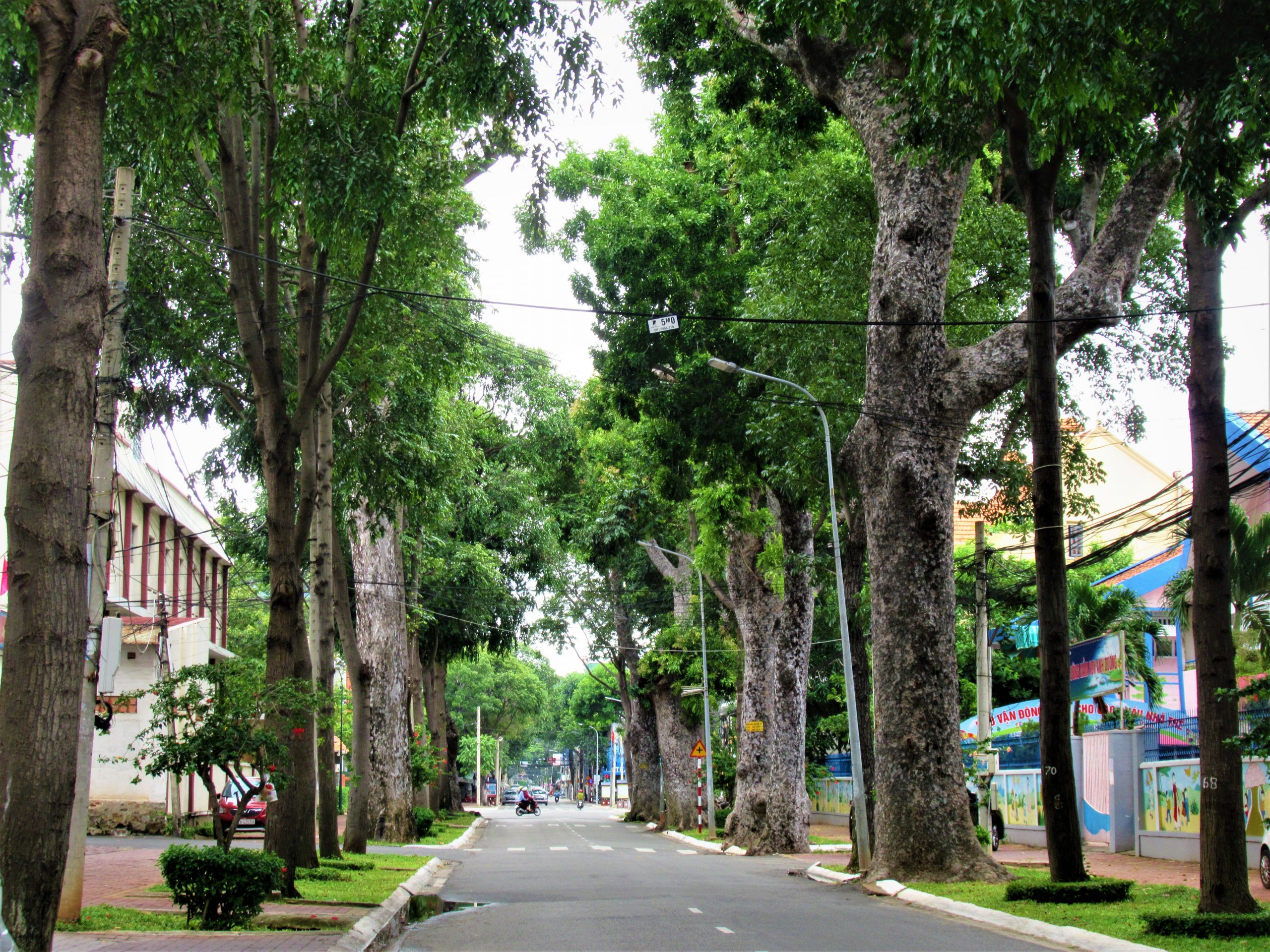
As it became clear that the government’s approach to dealing with the virus was highly effective, there was little explicit resistance to the measures imposed. However, my instinctive reaction at the apartment – frustration at being inconvenienced, and sensitivity at the infringement of my personal freedom – was echoed in a number of other such instances I discussed with my foreign friends in Vietnam, who found themselves in similar situations, acting in similar ways, even against their better judgement. I don’t recall, on the other hand, any of my Vietnamese friends bemoaning the restrictions in place, or getting angry when they were told to wear a mask or log their details when visiting a friend’s apartment.
However, the reasons behind the general compliance of the population to lock-down rules and social-distancing regulations are far more nuanced and complex than I could ever fully understand. Indeed, the more I think about it, the more inconsistencies come to mind, and the more questions arise. Why, for example, were the government’s attempts to contain the virus, and their campaign to educate the population on best practices, so successful with regards to Covid-19 when similar nationwide campaigns to tackle the national driving culture and attitudes to personal litter and the environment, appear to be regularly ignored by citizens, despite being far more lethal (and far more visible) than the virus. Traffic accidents in Vietnam, for example, regularly cause as many deaths per day than have currently occurred due to Covid-19 during the entire pandemic. And yet, public attitudes to government advice on driving practices are nonchalant at best, and road laws are consistently broken, leading to around 10,000 deaths a year on average.
During one of the ‘serious’ months of the pandemic in Vietnam, a man approached me on his motorbike as I was walking on the curbside. He urged me, politely but firmly, to pull my face mask up over my mouth and nose, saying it was dangerous and illegal not to wear it properly in public. I did so (albeit with that same instinctive reaction of irritation that I’d displayed at the apartment in Vung Tau). The man then proceeded to pull away into the middle of the road against oncoming traffic without looking in either direction, narrowly avoiding a truck and causing a motorbike with a helmetless infant girl on her mother’s knees to swerve into the pathway of that truck. There’s a lot to unpack in this scene and several ways to interpret it, but I’m not sure where it leads nor what conclusions can be drawn from it.
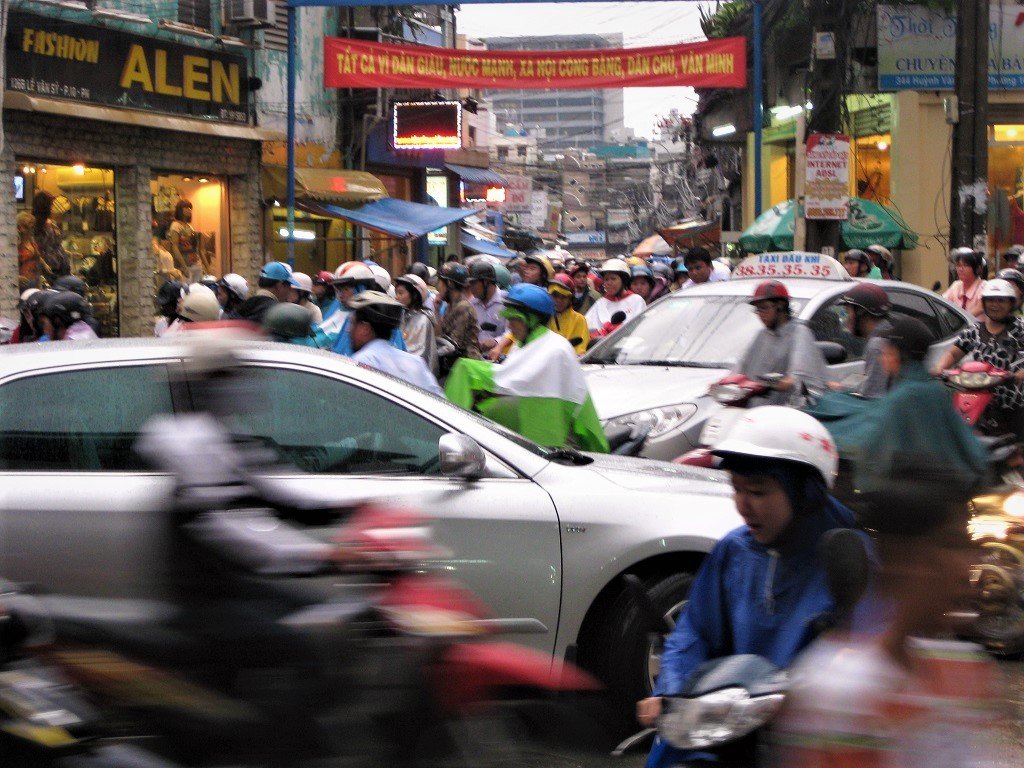
[Back]
*
Pathos & Poignancy:
Despite my comfortable circumstances during lock-down, there was a certain sadness and pathos about that period of time. There were occasions when, for no particular reason, a wave of emotion would come over me and there was nothing else to do but sob. This might happen, for example, while gazing out to sea from one of the hillside pagodas or during my breathing exercises or while reading in the bathtub. I remember, in the final pages of ‘The Last Days of Socrates’, as the philosopher calmly drinks the poison hemlock and his friends look on in despair, I couldn’t help but have a little weep; and when Odysseus returns home to the island of Ithaka after 20 years of absence and his dog, sick and old but still loyal, recognizes his master is safely back home and finally gives himself permission to die, I found it particularly moving.
There was a poignancy, too, about the empty schools which, by then, had already been closed for nearly four months. In Vietnam, primary and secondary schools are often attractive, two- or three-storey buildings constructed around a large courtyard with shade trees providing shelter for students to play beneath during break times. Schools in Vietnam exude a youthful buzz and optimism, often ringing to the sounds of children playing, singing and laughing. But, in Vung Tau and across the nation, these handsome school buildings were eerily quiet: their gates locked, leaves collecting in the courtyards, and children – normally such a feature of everyday life in Vietnam – were nowhere to be seen. Street life, street food, and fresh markets – all part of normal daily life – were noticeably absent during lock-down. There was no lunchtime rush of office workers and larbourers at local rice eateries; no congregations of teenagers at trendy cafes in the evenings; no epic beer-drinking sessions of businessmen at quán nhậu into the early hours; and no karaoke blaring into the night (although I admit to being rather relieved about the latter).
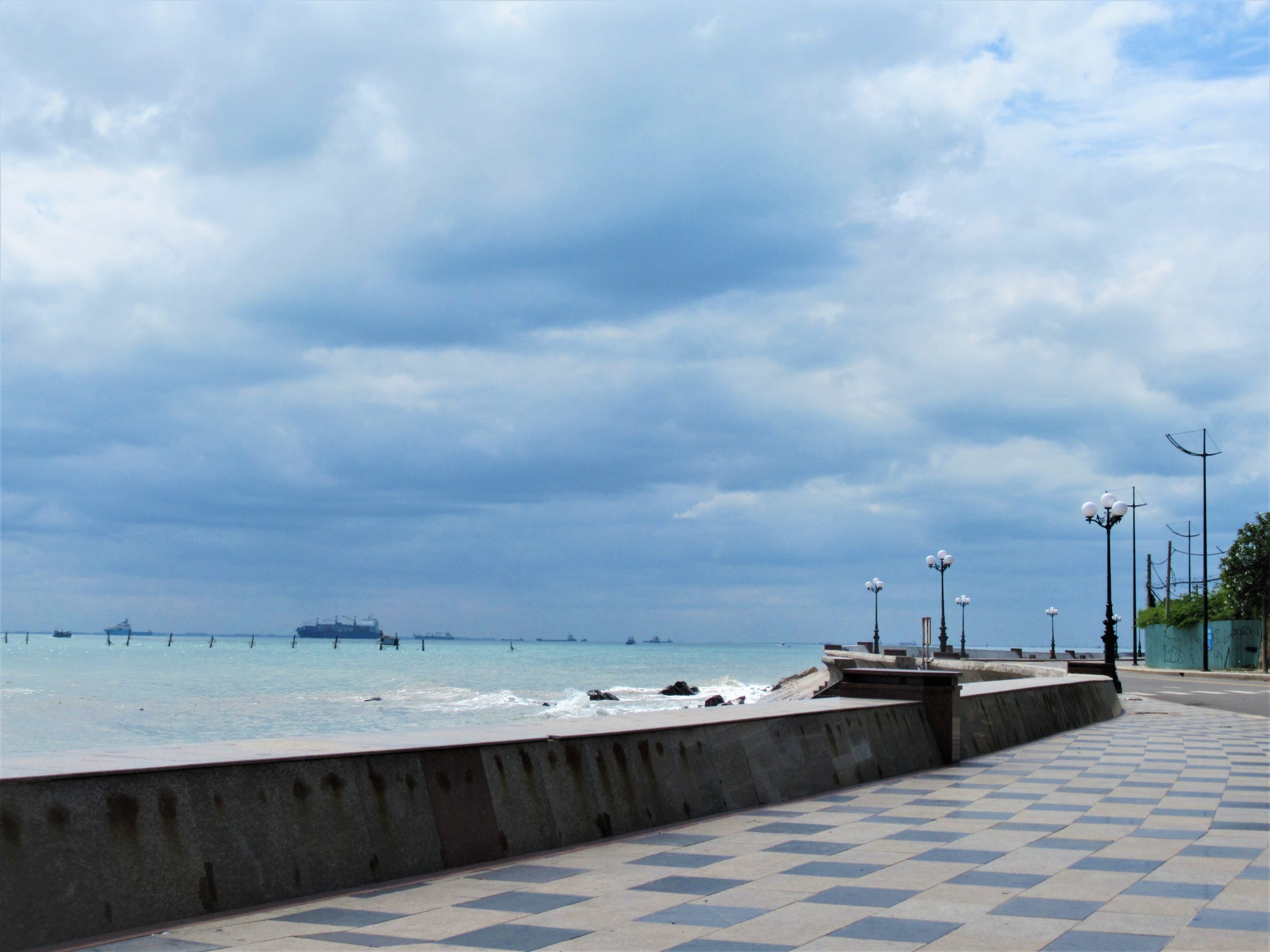
And so it was that even in Vietnam, where the government appeared to be on top of the pandemic, and even in Vung Tau, where the virus felt remote, there were reminders that, beyond our borders, the world was not in the ‘normal’ state we had known it just a few months previously, at the end of 2019. On one occasion, Ben, Ruby, ‘Sushi’ and I took a short trip to the city limits to a good vantage point on Nui Dinh Mountain, where a flat boulder protrudes from the jungle offering a vista over the hills, mangroves, marshlands, and waterways of the Saigon River Delta. Over the years, I’ve often come to this spot to watch the sunset. Although some 70km from Saigon, the mountain is under the flight path to Tan Son Nhat Airport, an increasingly busy hub for flights around the region and the wider world. In normal times, vapour trails scar the sky and the roar of aircraft on approach to Saigon punctuates the silence every few minutes.
I’ve always enjoyed looking at planes. Ever since I was a child growing up in London, where planes pass over all day on their way to one of the world’s busiest airports, Heathrow, I’ve been able to identify the tail art of aircraft as they fly overhead and thus make a good guess as to where they’re travelling to or from. On Nui Dinh Mountain, I might see Qatar Airways, China Eastern, Turkish Airlines, Thai Air, Cathay Pacific, Korean Airlines, Air France and Vietnam Airlines among many others. In Saigon, as in London, this always gives me a sense of being connected to the wider world: almost anywhere, it seems, is only a 12-hour flight away at most. But, as I sat on Nui Dinh Mountain with my friends in April during lock-down, the skies were empty. The only sounds were birdsong and the breeze rushing through the leaves, crispy and brittle from months of sun-drenched, dry season weather. Moments like this brought back the reality of what was happening beyond Vietnam’s borders. The world was paused; closed for business: locked down. As safe, content, and happy as I felt in Vietnam, there was nowhere to hide from the pandemic.
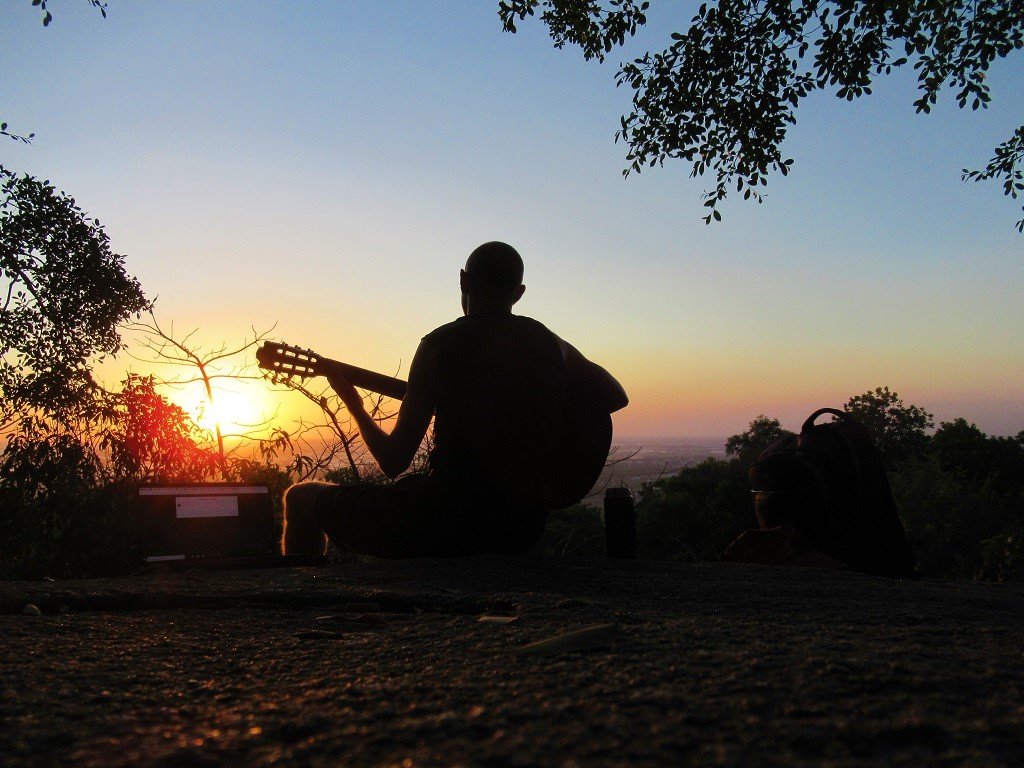
[Back]
*
Human Warmth & Social Life:
Because social interactions were necessarily limited during my time in Vung Tau, any social contact became significant and enjoyable. Little exchanges with the receptionists at my hotel, as I exited and entered the building over the course of 50 days, filled me with a sense of human warmth; brief daily interactions with staff at my regular food and drink outlets in town made me smile and glow: I was so grateful for this human contact. I was also lucky to have my friends from Saigon, Ben, Ruby and their dog, ‘Sushi’, staying close by in an apartment the next bay north of my hotel. We met several times a week for seemingly ‘normal’ social engagements. In addition to these in-person interactions, I got used to video calls on my laptop in my room to the extent that, during two-hour conversations with family or friends around the world, I found myself forgetting I was talking to a screen and felt as though I were in a bar or at a dinner table instead.
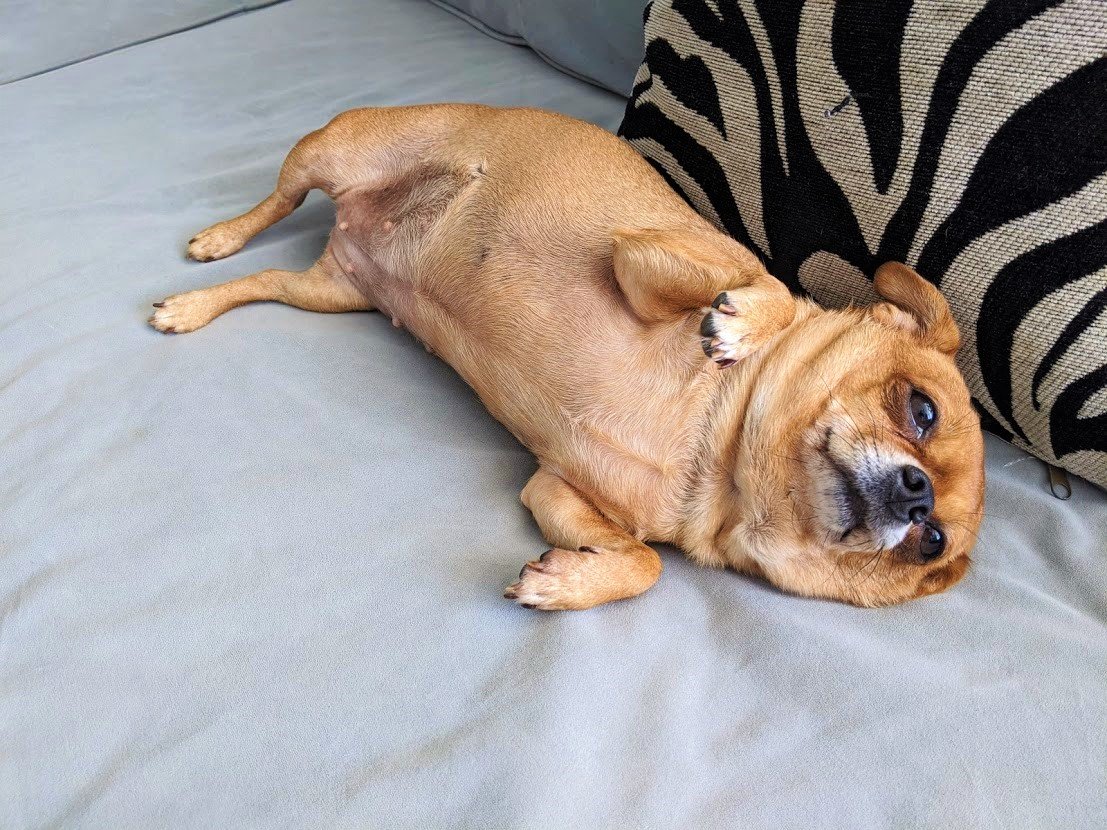
As a foreigner living in Vietnam with some knowledge of the language, I’m almost always warmly received in social situations, which makes even banal daily chores, such as buying groceries, a pleasurable experience. But, more than that, Vietnamese social life has a charm and ease that isn’t necessarily found in other cultures. Hardly any exchange goes by without at least some humour or fun – a pun, a joke, innuendo, teasing, flirting. The Vietnamese, it seems, have an ability to treat even serious matters with levity, and this keeps people smiling, laughing, and sane. During Pandemic Season, I rarely met anyone who complained about the situation: if the virus was mentioned at all, it was usually with a smile and a little, good-natured joke. This lightheartedness during social-distancing and lock-down helped keep people psychologically healthy, saved them from gloomy thoughts and depression, and kept families, neighbourhoods, and communities afloat.
[Back]
*
A Moment of Hostility:
In the early stages of the virus, there were reports of attacks on the streets of cities in the UK and the US on ‘Chinese’ people (although, surely the attackers weren’t discerning about their victims, as long as they were ‘Asian-looking’) as retribution for bringing the virus to their countries, however absurd that might sound. In Vietnam, however, by the time I was staying in Vung Tau, Westerners were the ones now seen to be most likely to be carrying the virus, and were therefore best avoided. There wasn’t anything mysterious about this attitude: fear and suspicion of certain nationalities simply reflected the rise and fall of the virus across the globe: in January, it was the Chinese; in February, the South Koreans; by March, it was Westerners. There was a brief moment when this threatened to become a problem for Westerners currently in the country. Some hotels refused to accommodate foreign guests, and, before lock-down, the young staff in cafes and noodle joints who served me were clearly very nervous about being in close contact with a Westerner. However, I was never refused entry or service anywhere, and, obviously, compared to the attacks in the West against ‘Chinese’ people, this was nothing.
I mention the following two incidents only because they happened; not because they are representative in any way of a broader attitude in Vietnam. Indeed, the fact that these incidents stand-out in my memory at all is evidence of their rarity. 99.99% of the time during the many months of Pandemic Season in Vietnam, I have been treated with warmth, sincerity and hospitality, as I have always been in over a decade of living here:
In Vung Tau, I would go for a run along the seafront road a couple of times a week after sunset, at about 7pm. The seafront is a very pleasant place to run with its long, tree-lined sweep, vistas out to sea, a fresh breeze off the water, and good people-watching. The seafront gets particularly busy from Friday to Sunday, when the younger population of Vung Tau and a great many day-trippers from Saigon come out to gossip, flirt, and show off their wheels. On one occasion, as I was running (with my mask on, which took some getting used to), a small group of young men, probably in their early twenties, shouted at me to “Fuck off back home” (in English). I ran on. No big deal. And, I had to admit, their anger was understandable, given the fact that many new cases in Vietnam at that time arrived by plane from abroad, usually from the West. In fact, back in London, I would be subjected to worse verbal abuse than this just walking to the local kebab shop down the road from my house on a Friday night.
The second incident was even more minor. As I was sitting on the curbside eating my rice lunch at a typical, open-sided local eatery, a middle-aged man finished his meal, brushed past me and scoffed “người Cô-vít” (‘Covid person’) and laughed before getting into his car and driving off. But none of this amounts to very much. Westerners in Vietnam are generally a massively privileged minority. Indeed, I think the Vietnamese attitude to Westerners during Pandemic Season, especially that period in March, when Vietnam’s clean streak was broken by a slew of international arrivals carrying the virus, shows remarkable restraint.

[Back]
*
Impacts on the Environment:
Lock-down and physical-distancing impacted the environment in several interesting ways. Air pollution is an increasingly serious issue in many Vietnamese cities. Throughout the year, as lock-downs were enforced on major cities in Vietnam and across the world, there was a lot of talk about the apparent impact this had on air quality. In Vung Tau – a large city in its own right, but also on the edge of several enormous industrial zones, ports, and petroleum facilities, not to mention being in close proximity to Saigon, a city of some 10 million people – the skies during March and April were so blue and so clear, and the sunsets so crisp, that the sun simply dropped in a perfect sphere over the horizon every evening. (Normally, it dissolves into a hazy cloud of pollution long before reaching the horizon). When Ben, Ruby, ‘Sushi’ and I would ride up to one of the city’s hills to watch the sunset, it seemed as though each white crest of every wave out at sea was visible. This was the height of the dry season: it hadn’t rained for months and usually the air would be full of dust and a haze would lie over the ocean.
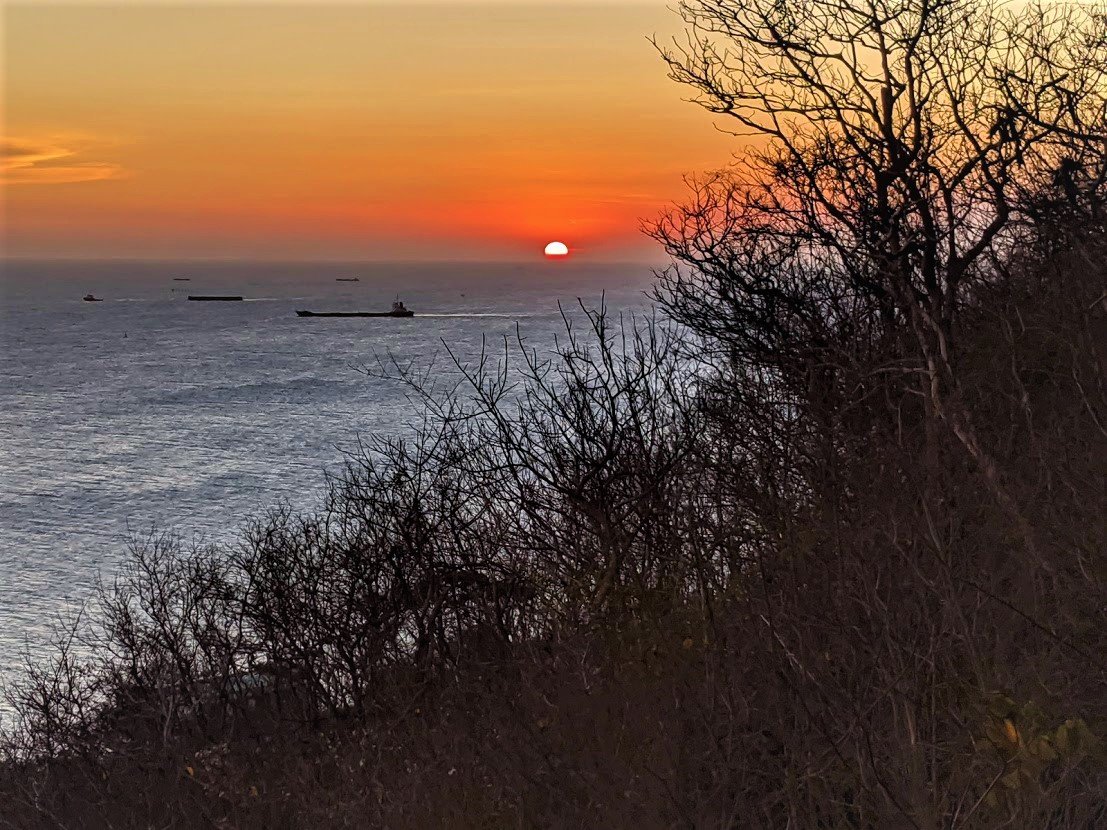
Vietnam, like much of the world, has a serious plastic problem, especially with regards to single-use items, such as plastic bags, bottles, cups, straws, food containers and wrappers, all of which can be seen discarded on every roadside, city gutter, waterway, beach and bay across the nation. Over the last few years, however, a growing awareness of the effects of single-use items on the environment (partly led by government-sponsored campaigns) has resulted in a remarkable increase in reusable alternatives, such as metal straws, flasks, and even bindweed to replace plastic cup holders for take-out coffee. But, with the advent of Covid-19, the public appetite for reusable items – especially ones that had been in other peoples’ mouths (although obviously washed after use) – dwindled. Hotels, cafes, and restaurants all reverted back to plastic. Compounding the problem was a surge in take-out food and drink during lock-down and social-distancing, when many outlets were only allowed to offer take-away or delivery, and many customers had no other choice but to consume the single-use items they were presented with. The increase in plastic consumption was depressingly obvious, and it may be a long time before people start to go reusable again.
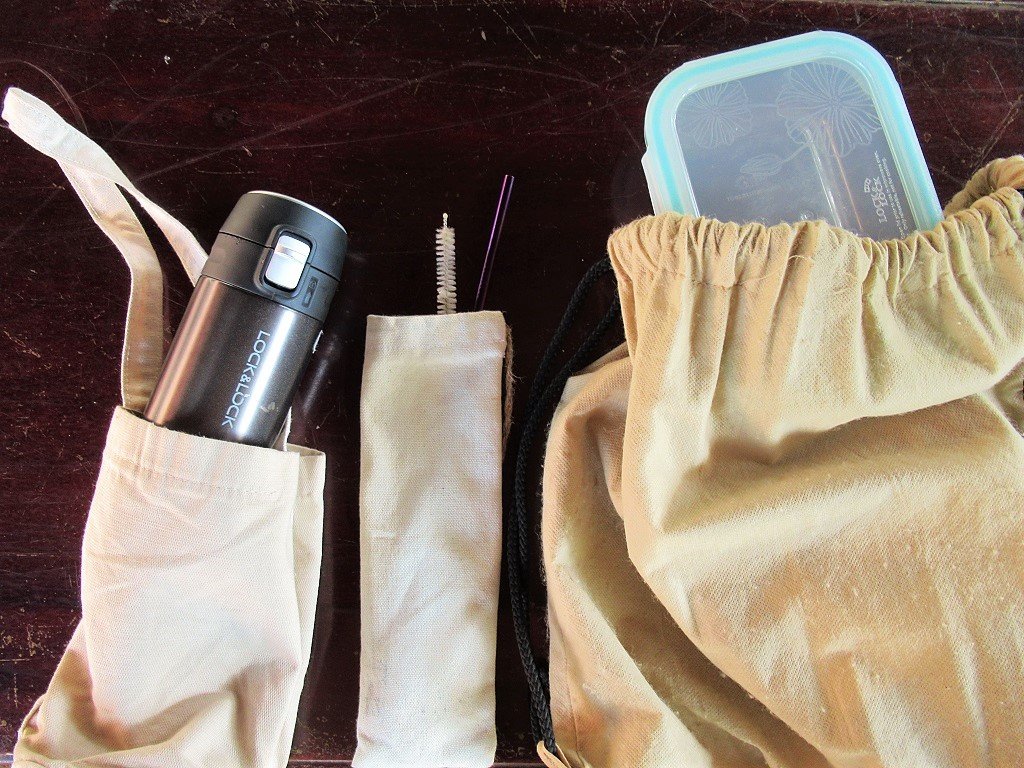
[Back]
*
Easing Restrictions:
Toward the end of April, as lock-down began to wind down and restrictions eased (there hadn’t been any cases for several weeks in southern Vietnam), I met Ben for a long walk along the seafront, the day before he was due to return to Saigon. People were now allowed out on the seafront road and Bãi Trước beach again, but gatherings of more than two people were still prohibited. As we walked and talked, along with hundreds of other people (all in pairs), a rolling public announcement blared from a van moving slowly up and down the street. The PA system stated that everyone must wear a mask and groups must be limited to no more than two people, followed by a list of fines that would be issued on the spot to anyone breaking the regulations. And, indeed, every now and then one couple of promenaders would forget the physical-distancing restrictions and coalesce with another couple. They’d be immediately broken up by a spattering of uniformed authorities: firmly but not aggressively. The fine, it seemed, was a last resort. I didn’t see anyone resist, argue, or make a scene on the seafront that day: we were all just happy to be out and about again, albeit only in pairs.
Ben and I continued to walk and talk with the public announcement from the van following us along. I suppose, one might imagine this would feel oppressive or authoritarian – Big Brother watching your every move, making sure you don’t step out of line – or, at the very least, a bit irritating. But it wasn’t. We could clearly see and feel that we had the freedom to go out, socialize, and enjoy our lives (which, by that time, wasn’t possible in countries like the UK, where much stricter and more serious restrictions were now in place as a result of the initial mishandling of the virus). But we were also cognizant of being in the middle of a pandemic that relied upon the implementations of certain rules and restrictions to be successful. And, crucially, we were well-aware that Vietnam had so far proved itself to be on point and up to the task. By now, there was a sense of national pride attached to how well Vietnam had managed to contain the virus. And, in turn, we were all far more willing to accept the rules and regulations that came and went as the virus flared up here and there, then receded again.
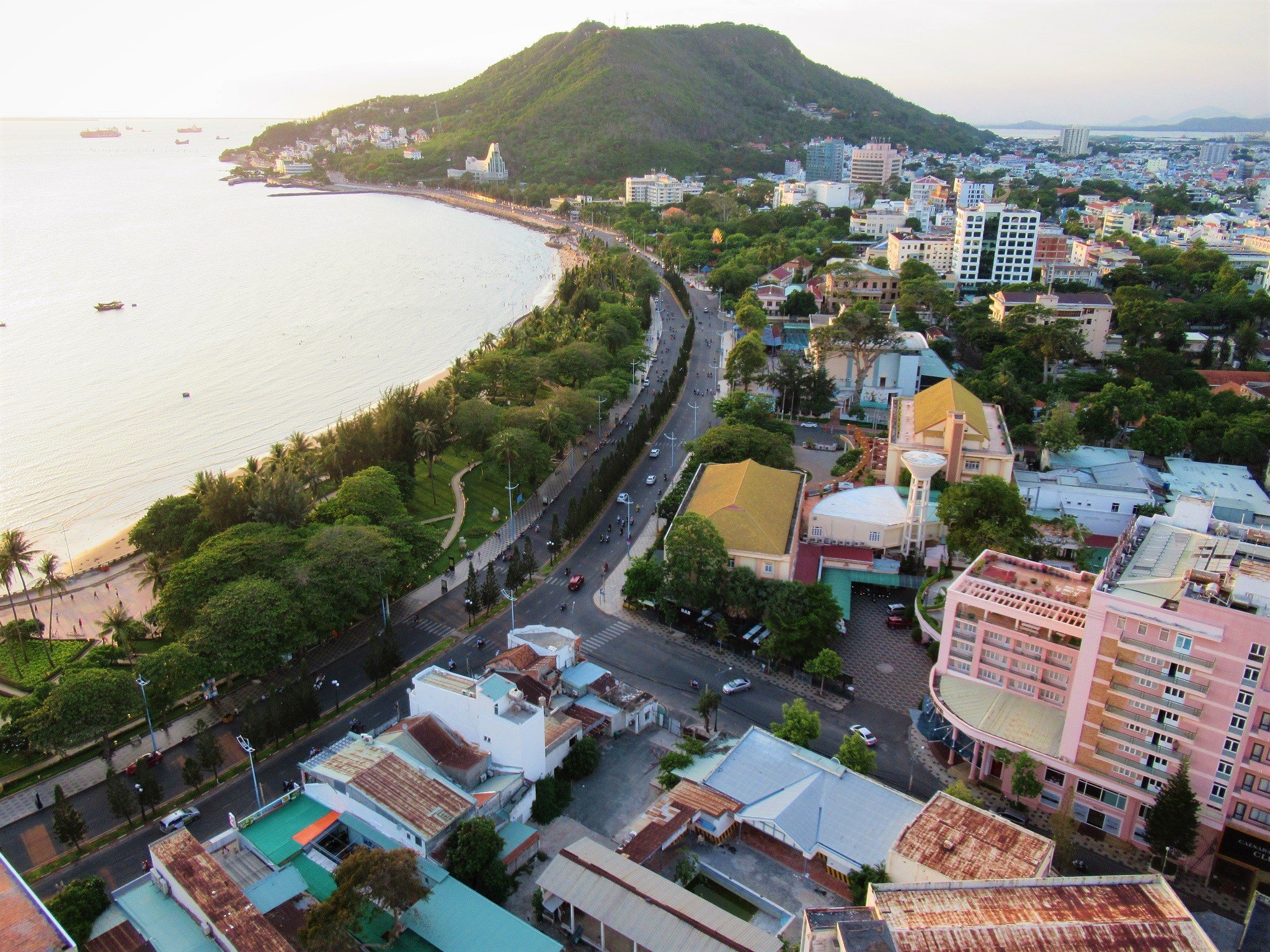
[Back]
*
Success & Recognition:
As lock-down continued and case numbers dropped, it was becoming clear that Vietnam’s tactics in fighting the coronavirus were highly effective. However, as a country of nearly 100 million people that shares a long land border with China (where the virus first occurred), and, on paper at least, nowhere near as well-equipped to deal with a pandemic as many of its wealthier Asian neighbours (let alone Western nations), it was surprising how little attention Vietnam received in the international press for its successful handling of the pandemic. Whenever Asian countries were praised in Western media or by Western academics, politicians and popular commentators, they almost always chose to single out countries such as Taiwan, Japan, South Korea and Singapore, most of which, although relatively successful in containing the virus compared to many Western nations, had far higher numbers of cases and deaths than Vietnam (the only exception being Taiwan, which has roughly a quarter of the population of Vietnam).
Post lock-down, however, praise for Vietnam’s pandemic response did start to trickle in: first from regional nations, then Australia and New Zealand, then Europe and the United States. A reason for this slow praise might have been initial skepticism about the accuracy of the statistics coming out of Vietnam. But I also suspect there was a reluctance in Western democracies to admit the success of an authoritarian, one-party, Communist state. This is a shame, because some Western governments, like my own in the UK, might have learned a lot from Vietnam’s pandemic response, especially actions that were taken early on.
From the get-go, the Vietnamese government, and a large chunk of the population, took the virus very seriously. Vietnam was prepared. Not yet a quarter of the way through the century, Vietnam has had to tackle no less than four epidemics: SARS (2003), Bird Flu (2005), Swine Flu (2009), Zika (2016), and now Covid-19 (2020). The government had a clear protocol that was quickly enacted, relying heavily on public awareness campaigns and a thorough system of contact-tracing, which remains the cornerstone of the country’s continued success in nipping each outbreak in the bud. The government has enormous manpower at its disposal – including one of the largest armies in the world – which enabled successful implementation of people-heavy strategies, such as contact-tracing, lock-downs, isolation of whole city blocks and entire villages, and mass quarantines.

Vietnam is still a nation of communities: of families and neighbourhoods first, but also of wards and districts, villages and towns, cities and provinces. Working together and working for a group – not just for the individual – is still a fundamental component of Vietnamese life and culture. This sense of community was also the foundation for citizens’ early assessment of the situation: how serious was the virus and how suitable the government’s strategy to contain it? Once people had ascertained through large-scale gossip (essentially a form of informal data gathering based on a network of personal, family and business contacts; not on state-run media) that the virus was a genuine threat and the government’s response was serious, appropriate and effective, the population complied. For most Vietnamese, then, Covid-19 remained primarily a public health issue; not a political nor a partisan one. With the public on side, the government was able to build a coherent national response to the virus.
It’s impossible to imagine the nation’s success in containing the virus without Vietnam’s big state. Government – big government – has been the defining feature of Vietnam’s pandemic response. While some Western countries have downsized the state and increasingly demanded less government in their lives over the last decade or two, Vietnam’s big government has served it well in this pandemic. Indeed, most of my Vietnamese friends – even those who have some serious issues with the way their country is run – concede that, in the case of the Covid-19 pandemic, the government got it just right.
[Back]
*
Last Days of Lock-Down:
Lock-down in Vung Tau ended a few days earlier than in Saigon. The city changed overnight: cafes opened and filled with people; street food vendors started selling on the sidewalks again; the city’s markets filled with fresh produce; traffic returned to the streets; and children were outside in public for the first time since I could remember. This was all very reassuring. It felt as though we’d all come through something together: hunkering down for several weeks, laying low, being patient, waiting it out. Now that we’d done what was required of us, it was safe to go out again: to socialize, to dine-out, to shop, to drink, to live as we had in the pre-Covid era.
During my six weeks in the city, I had become very attached to Vung Tau. I felt as though the city and the people I’d interacted with everyday, albeit at a distance, had somehow looked after me and seen me through the physical-distancing and lock-down period. I was grateful to the staff at my hotel, to the vendors at the food and drink outlets I’d frequented every day (for their produce, of course, but mostly for their company), I was grateful to the pagodas and shrines on the hillsides, to the seafront park and promenade, to the ocean and the sea-breeze, to Big and Small mountains, to my friends, Ben and Ruby (and their dog, ‘Sushi’), and to the dry season sun that shone on Vung Tau everyday of lock-down. But it was over now. I decided to return to Saigon on my motorbike.
The ride back was easy and quiet. When I reached the industrial outskirts of the city, it was clear lock-down had been much more serious in Saigon than it had in Vung Tau. The streets were eerily quiet and the city felt as though it were in hiding. This was to be the last day of lock-down in Saigon. It was impossible not to notice how green the city looked, how the trees along the various canals, channels and rivers shook in the breeze, how clear the air was, how sharp the light, how wide the streets, how interesting the architecture: how beautiful Saigon can be when one isn’t struggling to breathe through the pollution, or straining to hear above the din of engines, or constantly on guard dodging motorbikes and cars. The next day, everything would change, again.
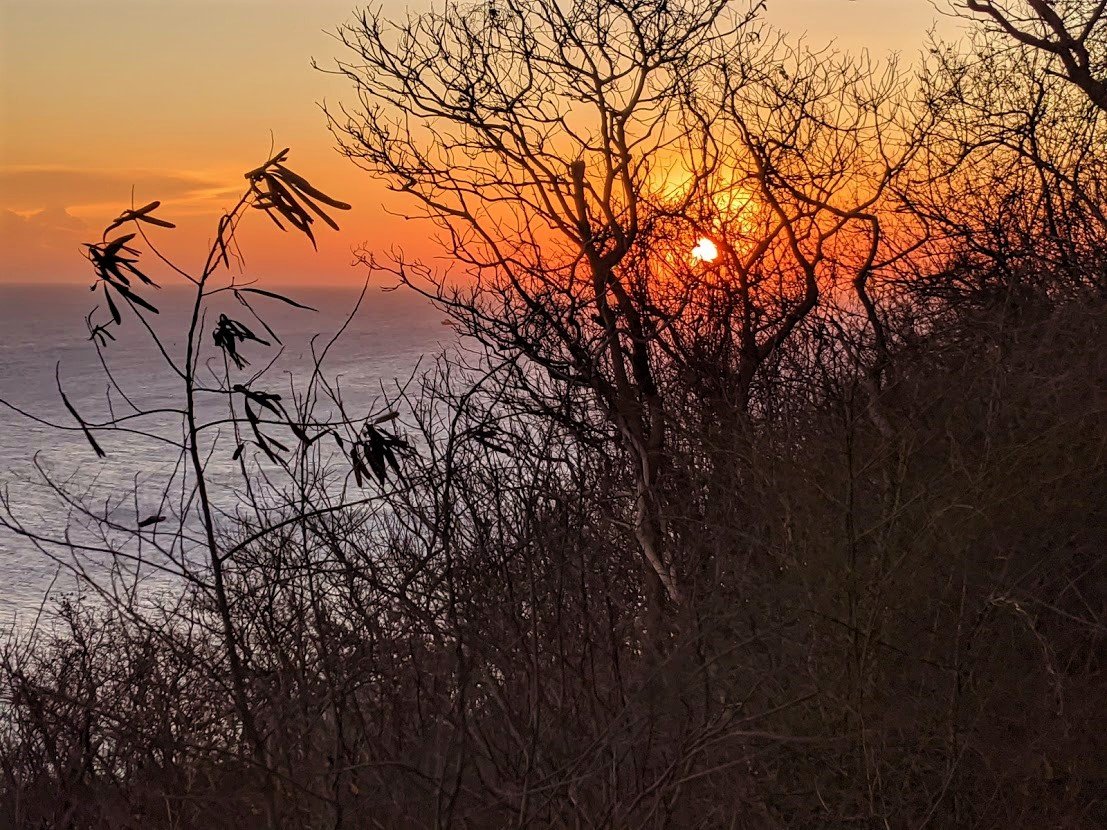
PART 3: Post-Virus
To be published….
*Disclaimer & Disclosure: This is not a piece of journalism. Rather, it’s a personal recollection & an attempt to tell a story based on my experience over the past few months. In this account, I am most concerned with the narrative & my own emotional & intellectual response to, opinions of, and reflections on, the events in Vietnam since January 2020. I am less concerned with exact figures & dates. If you wish to fact-check anything in this piece, it’s easily done with a simple Google search, such as, ‘When was Vietnam’s first confirmed Covid-19 case?’ or ‘On which date did mandatory quarantine for all international arrivals commence?’ etc. I have no affiliation with the Vietnamese government nor do I belong to any other political group in Vietnam or abroad. The opinions & ideas expressed in this article are my own & I have not received payment of any kind. Much has now been written about Vietnam’s response to the virus (both positive & negative) in the domestic & international press, most of which is available online for free. I’d encourage anyone who’s interest is sparked by anything written on this page, to read more on the subject. My account is only one perspective.
[Back Top]

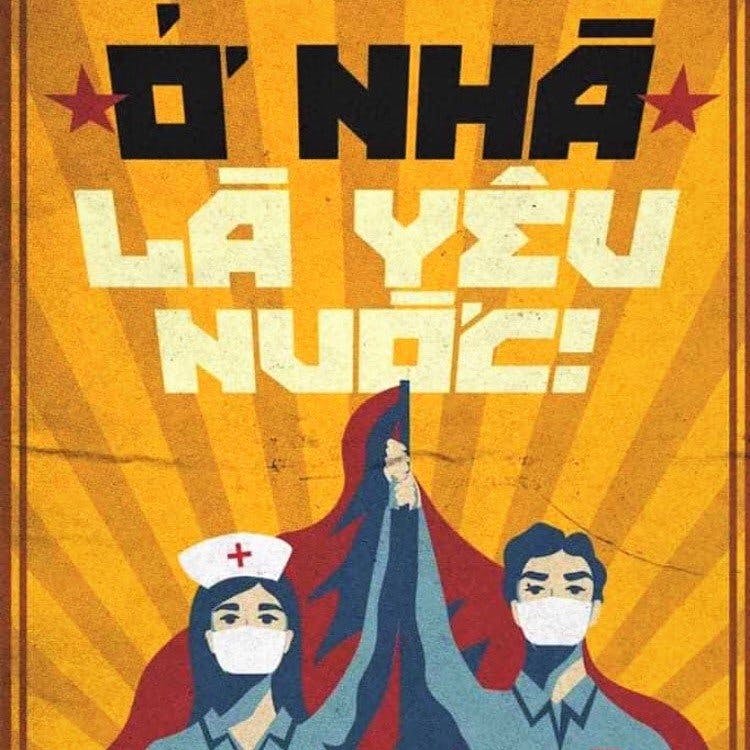
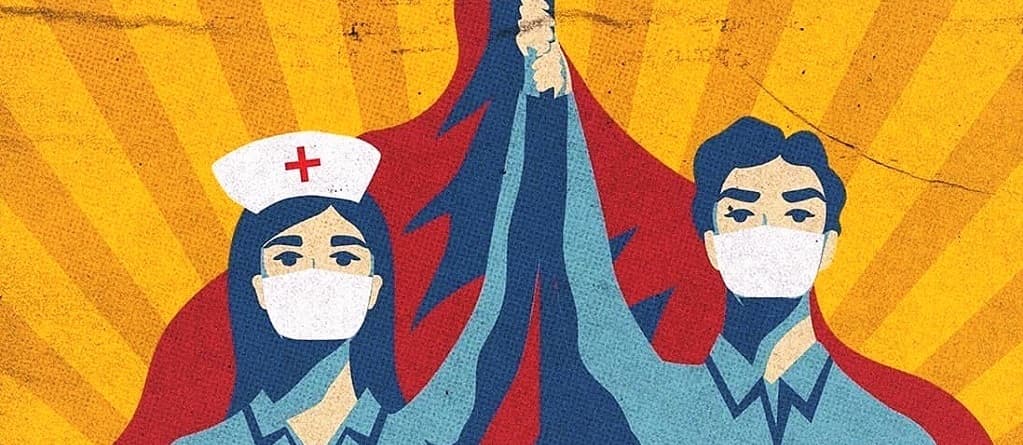
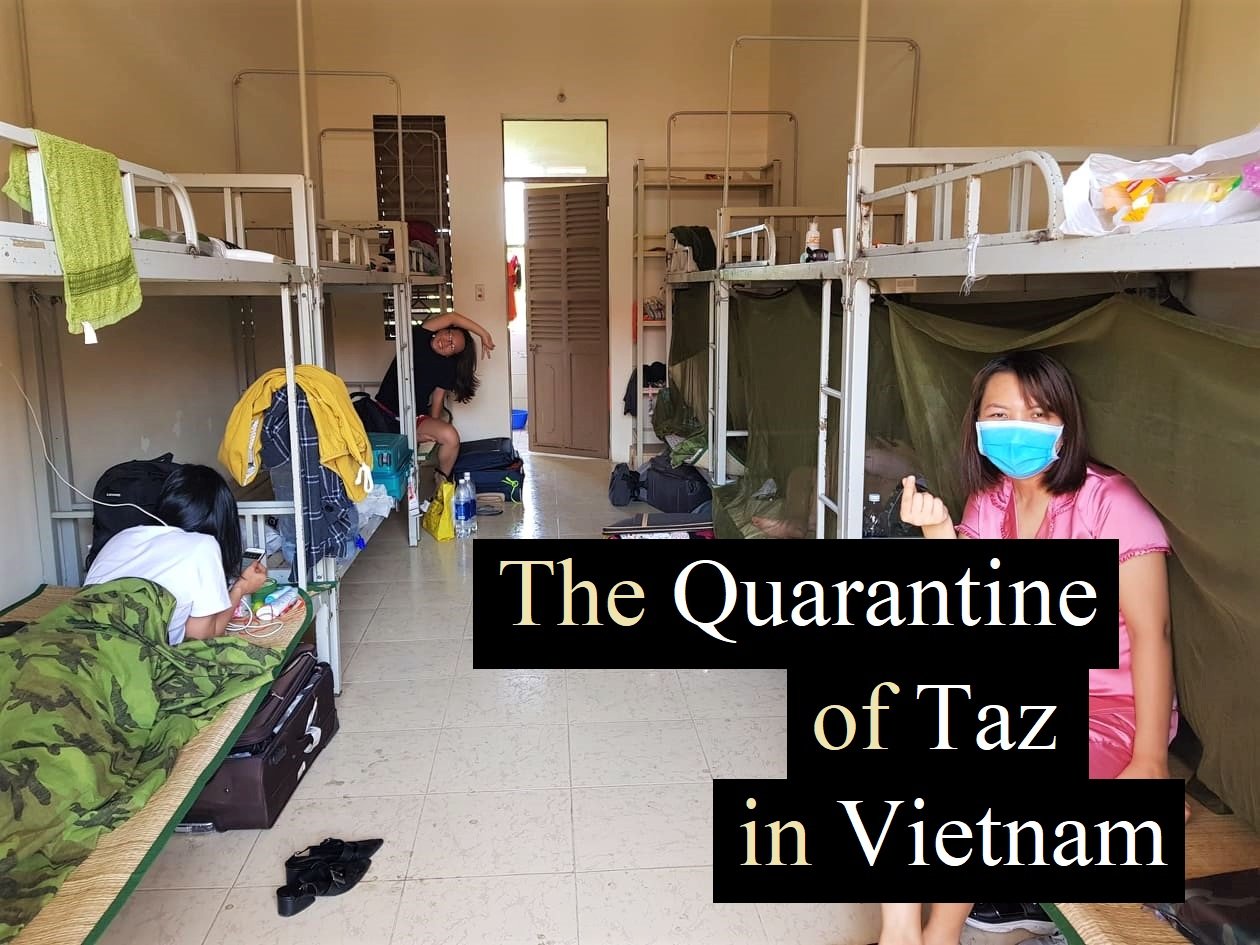
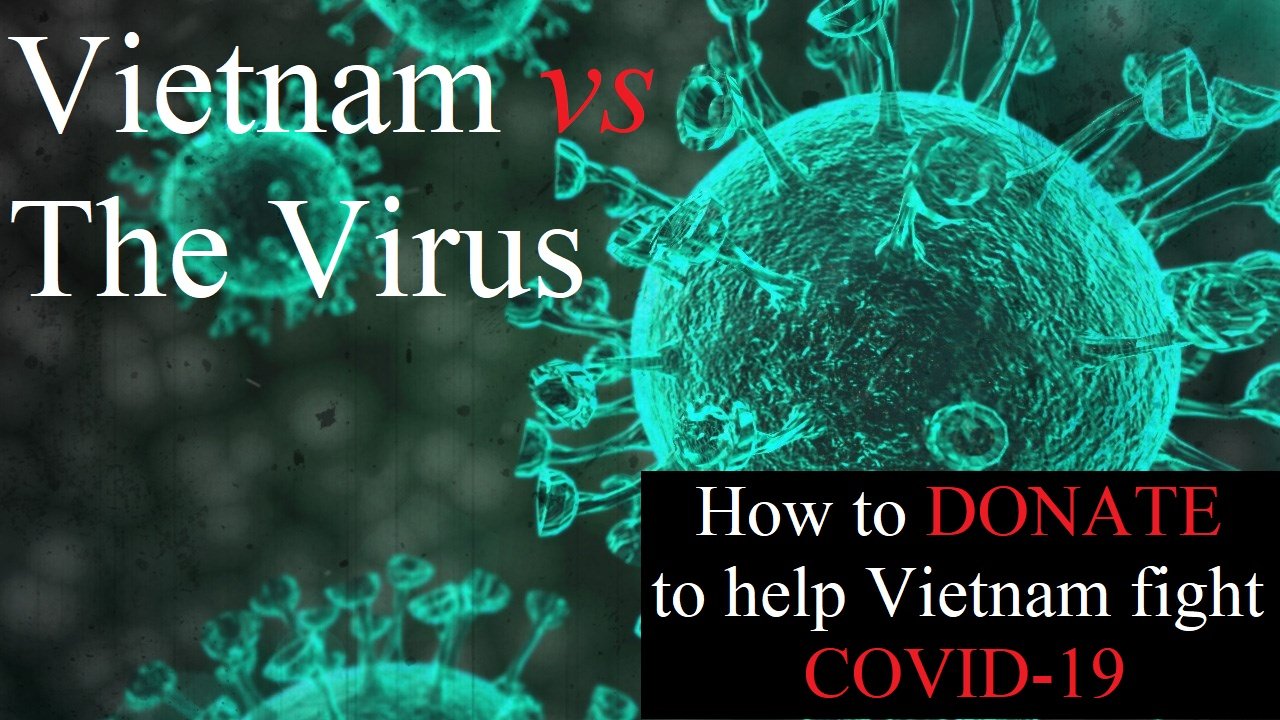
Hi Tom,
Im an ex pat living here in Saigon since Nov 2020.
Loving vietnamcoracle.com, the content is superb and really comprehensive. I have just returned from exploring Da Nang and the Son Tra peninsular which was a great motorcycle trip.
Have been planning to do a version of your southern loop (out to Vung Tau by car ferry and then to La Gi, upto Da Lat, Nha Trang and back along the ocean road.
Do you know if this route is possible with current Pandemic restrictions as of Dec 2021. I am double vaccinated with the green Covid pass. Can I assume free passage along this route?
Thanks,
Chris.
Hi Chris,
Thanks for the kind words.
Yes, as far as I know it should now be possible to ride that loop. Although, I would still suggest calling ahead each night before you stay somewhere just in case.
My guide to the Southeast Loop hasn’t been updated for a while, although the route should still be good. To find other alternatives in that area just browse my motorbike archives for The South.
Best,
Tom
Hi Tom,
I’ve been to Vietnam in 2018 and 2019. Your website helped me both times preparing my motorbike tours. First time from Hanoi over the Western Ho-Chi-Minh Road to Hoi An and the second time over Mu Cang Chai to Ha Giang and back to Hanoi. Thank you for all the effort!
I just came across your essay on the Covid situation in Vietnam. Thank you for all the insight you gave us. It was very interesting but made my “Vietnam Homesickness” even worse.
I wanted to spend my vacation in Vietnam again in 2020 but knew already in February, that this would not be possible. Now, I am in the same situation as last year and I have no hope in returning to Vietnam soon.
I am also afraid how “the east” is maybe looking down on us “westerners”.
How the vietnamese government is handling the situation over there baffles me.
The problem here in the west is the selfishness of the people. Whenever there are new restrictions in place, everybody just thinks of “my freedom, my choice, my, me, I….”
I just cannot stand it anymore. It seems that the people in Asia are more concerned on the wellbeing of all people, the society, the community and therefore are willing to limit their personal freedom for the greater good.
Maybe this is the secret, why Vietnam amongst other Asian countries, is better coping with the situation than the west.
I wish that the west would learn from Vietnam and others and I hope that we (westerners) can return to Vietnam soon and that we are warmly welcomed and greeted friendly, despite our difficult struggle against Covid-19. The worst for me would be the feeling of not be welcomed in a country which I loved since the first day of my visit.
I hope your parents are well and that you can see them again this year.
Greetings from Germany
Annika
Hi Annika,
Thank you for your comment.
Yes, the points you raise are very interesting and I hope there will be more discussion and reflection along these lines over the next year or two. The contrast between the way many Western governments and people have handled and reacted to the pandemic with those of many Asian nations is fascinating and significant.
With regards to Western travellers being welcomed back to Vietnam once travel restrictions are eased, I think I can confidently predict that Vietnamese people will be as warm and welcoming as they always have been. I hope you can return to Vietnam soon.
Best,
Tom
I came across these beautiful essays via a commenter on Balloon Juice, Uncle
Ebenezeer (pseudonym) who travelled to Vietnam, pre-pandemic, using your recommendations. I have a dear friend who spent many years there and your accounts remind me of him and that I need to make a shallot, tomato, and egg dish he learned there. I hope to visit one day. And I hope the spirit of the Vietnamese people prevails.
Hi Debra,
Thank you. I hope you get a chance to come visit Vietnam after the pandemic (and maybe learn some more delicious dishes like that).
Best,
Tom
Amazing recollection Tom, thank you for writing this.
I live in Singapore and couldn’t really have a grasp of how things were back home, although through my family, things seem to go fairly well. Appreciated you wrote this down as a very objective piece.
Hope you stay safe there.
Thank you, Tessy.
I hope you’re doing well in Singapore too and get a chance to return to Vietnam sometime soon.
Best,
Tom
Hi Tom,
Again it’s a great pleasure to read you blog.
I returned to Australia back in January for what was to 6-8 weeks. During that time I went for a skin review with my regular specialist (who’s Sth Korean) and told him that I would be returning home (Vung Tau) in March. I got a lecture about just how dangerous that would be due to the virus. We debated the idea, but I was going anyway.
My visa was a little slow coming via the VN Canberra embassy (first time I had used them, not an agent in VN) and arrived just in time for me to catch my flight to Brisbane from Townsville.
I transferred to the international in Brisbane, checked in, cleared custom and immigration and having bia’s while watching the pilots and cabin crew prepare for the flights.
People were migrating to the departure gate.
Then the page came for Peter Safe to attend to the departure gate where I was told that Singapore Air had been just been advised that my connecting flight from SIN to SGN had been canceled.
Two boarding passing passes in hand, flight ready to go and I, and a Viet family were being ejected.
I was pissed off but with nothing to do but return to Townsville. To add insult to injury … Qantas, the only airline I could get a seat on, wanted to charge me $A850 for an economy one way fare for a flight that is normally $A120 – 150. The train trip was pleasant!
A flight 12 hours earlier and I would have been home in Vung Tau.
I kept paying rent in Vung Tau until the end of June when I call the hotel and asked if they would pack all my gear up and put it in storage. They have been excellent and said they understood that paying rent in two countries wasn’t sensible. Today I still have a lot of electronic equipment, kitchen equipment and clothes in storage awaiting my return.
I still keep in touch with my Viet and western friends (who still live there) and continue trying to learn/improve my Vietnamese. Not easy with no Viet’s to chat with.
Hope we get a chance to have a bia hoặc ba when I return mate.
I’m updating my site but the Vietnam Coracle still has its link on it.
Cheers and stay safe.
Peter An toàn
safephotography.com
Hi Peter,
Thank you.
That sounds like quite a saga. I hope you are doing well now and that it won’t be long before you can return to Vietnam again.
Best,
Tom
Fantastic article, Tom. My partner’s parents flew into the country to visit us from America on March 15th and we can relate to many of the experiences and feelings that you write about here. I look forward to the next two sections, and possibly a fourth chapter about the “second wave” which we are now all managing.
But the way, my partner and I met you couple of months ago at our favorite vegetarian restaurant in Da Kao called San May. You were meeting with one of the developers who helps with your site and I asked if “you were the Vietnam Coracle guy?” At the time, you mentioned that I could reach out and that I should introduce myself, but I never did. Sorry about that. If the offer still stands to share a drink or a meal together sometime, I would really like to! I hope you are doing okay, and that this second wave that we find ourselves in, doesn’t have as much of a disruption on your work and travel life as the last. We are certainly lucky to have had nearly 100 days of relative normalcy, compared to the rest of the craziness going on in the (primarily) Western world.
Hi Chris,
Thank you, and I hope that you, your partner and respective families are healthy and safe.
Yes, I remember meeting you both at San May – I was back there last week as it happens.
I’m out of the city this week but back in Saigon after that. Send me an email and we can arrange a meet: vietnamcoracle@gmail.com
Tom
The point you make about the disillusion Vietnamese people feel towards the West because of the disorganised response to the pandemic is very worrying to me. I have felt for a few years now that the relative rise of many countries in Asia and the stagnation or even decline of many Western countries was bound to lead to this eventually and the pandemic might prove to be the catalyst for a big change. It could make living and travelling in Asia much more difficult for Westerners as we are collectively seen as less desirable guests and immigration rules are tightened up and people become less welcoming.
Hi Jake,
Yes, I think there is bound to be a shift in perceptions of the West in Asia. It’s a very complex situation and I think will be one of the defining aspects of this century.
Tom
Hi Tom, I won’t repeat what others have said better than I could, just wanted to let you know how much I enjoyed this journal. I miss my annual trip to Vietnam and you brought a little piece of Vietnam to me. I am grateful the country has not suffered too much (although if not in human lives, for sure it still took a huge toll in other areas) and that you and your loved ones are safe.
I remember Vung Tau more on the seedy side so this makes me want to revisit it. Also, I laughed in kindred spirit when you mentioned not having stayed in one place for as long as you can remember. It’s an interesting experience, it’s been over 15 years since I’ve been more than 3 weeks in the same place, so can relate. This year of course is radically different.
One last thing, I was intrigued by your breathing meditation routine, would love to know more if you get a chance.
Stay well, and looking forward to the next chapter.
Noémi
Hi Noémi,
Thanks very much, it means a lot to hear that you enjoyed reading this.
I hope you have the opportunity to return again to Vietnam some time soon – perhaps 2021 will be a better year for travel.
Yes, Vung Tau has changed and it’s worth going back to take another look, especially during the week.
The breathing I do is a combination of similar techniques: Tummo, Wim Hoff, and Pranayama. I’ve been practicing for about 2.5 years now, and there’s no doubting the positive impact it’s had on my health. It’s also meditative, so a good way to clear your head. If you’re interested, James Nestor has just published a fantastic book called ‘Breath’.
I hope you’re coping alright during this Year of Corona.
All the best,
Tom
Hi Tom,
This is another wonderful example of why I love your blog. Your love for Vietnam and its people shines through every sentence and you really care for them. Most of all – you never-ever put yourself first as the vast majority of travel blogs do.
I first travelled to Vietnam in 1992 and have been back about 20 times since than as a study tour guide and travel writer. Just like you I love the country and its people. I often wondered what make the country so appealing to me (since 1979 I’ve travelled extensively between India and Vietnam, having published 10 guide books). Sure there is the beautiful countryside, enchanting cities, great food, beaches, colorful street life, tropical weather – I love all of that. But if I have to name only one ‘thing’ that impresses me the most than it must be the Vietnamese themselves. Disciplined and hard working yet joyful and loving life, spiritual yet practical, individually minded yet socially conscious, proud of their own heritage and history yet open minded for outside ideas and people – to me that’s what makes life in Vietnam so appealing. And I think it is exactly these characteristics why the country has been so successful in handling the Covid 19 pandemic. The ‘Jealous Covid Song’ is a wonderful showcase of this mentality.
You sharply pointed out of how their own success of handling the crisis and at the same time the failure of many western countries to contain the pandemic is yet another example of how ’the tide is turning’. We are witnessing the rise of Asia and the decline of the West. It started at least 25 years ago but now it is all apparent. I hope and believe that Vietnam and its people will be one of the leading countries in this historic change – they fully deserve it.
So,rry I got carried away. I really just wanted to thank you for your wonderful blog. I am checking every other day for a new article of yours. Great work from an obviously very likeable person.
Thank you and stay safe!
Hi Thomas,
Thank you for your comment.
I agree: I think there are huge geopolitical and cultural changes ahead that have their roots in the past quarter century or more. The relationship between ‘East’ and ‘West’ has never been more important, and we would all do well to try our best to understand each other. It seems to me that many people in Asia have a much better and deeper understanding of ‘Western’ culture and attitudes than we in the west have of ‘Asian’ culture and attitudes. This needs to change if we’ve any chance of avoiding serious misunderstandings in the near future.
Best,
Tom
Hi, Tom —
What a wonderful article!
It’s beautifully written, informative, and a real pleasure to read.
Back home in Alaska, as always loving summer here and at the same time, this year, missing planning the annual fall trip to Vietnam (for which your “Coracle” often gives great suggestions!), I was much moved by your account of your folks’ visit.
BRAVO, and best wishes as you roll out the other two parts of this article!
Helena Spector
Thank you, Helena.
I’m sorry that you’ll not be able to go on your trip to Vietnam this year, but I hope it won’t be long before travel to Vietnam will be possible again.
Best,
Tom
Hi Tom,
Do you know how many Covid-19 tests were and are being done in Vietnam? It’s been suggested (on an Australian blog) that Vietnam’s small number of cases may reflect small number of tests, with the implication being that the virus may be more widespread in your communities than being reported. Is testing available for anyone who feels they may have the virus and has testing been extensive throughout the country?
Cheers and all the best,
Brent & family
Hi Brent,
I don’t have the exact number off-hand but I’m sure a little bit of digging on googĺe would produce it.
I’m familiar with this suggestion and no doubt Vietnam’s testing is lower than regional neighbours such as Taiwan or South Korea. But in Vietnam, if you display symptons you are tested, if you’re in a quarantined area you are tested, and if you arrive in the country you are tested. And for nearly 3 months now the only confirmed cases have been those returning to Vietnam from abroad – all of whom must got into 14-day quarantine and all of whom are tested.
I’m pretty sure the ‘lack of testing’ theory has been debated and debunked in the media already – again, I think you’d find some good articles on that if you search around.
I hope this helps & I hope you’re well,
Tom
Hi Tom,
Great write up. Interesting to read this as a retrospective. Particularly striking are the contrasts you point out between vn and west.
Peter
Thanks, Peter.
Yes, the different approaches to the pandemic of east and west has been fascinating, and so too have the different attitudes of the citenzry of east and west to the ‘new normal’.
I hope you’re well.
Tom
Having travelled myself in Vietnam last March, I can relate to a lot of this. We left HCM on the 23rd of March. Being in that city as basically the only tourist, it was a surreal ending to our fantastic trip.
Nice and honest write-up Tom, looking forward to part 2!
Thank you, Eric. Despite the strange ending, I’m glad you enjoyed the rest of your trip to Vietnam.
Tom
The time your parents left Vietnam was exactly the time we arrived in Vietnam. I could fully understand your emotions coz we have the same. I hope your parents are doing well back to UK. We were fortunate to stay in Vietnam for two months during the escalation of the pandemic in Europe and North America. Stay safe and take care!
Hi Rui,
My parents are fine, thanks. And I’m happy to hear you were able to stay in Vietnam for the escalation period.
Best,
Tom